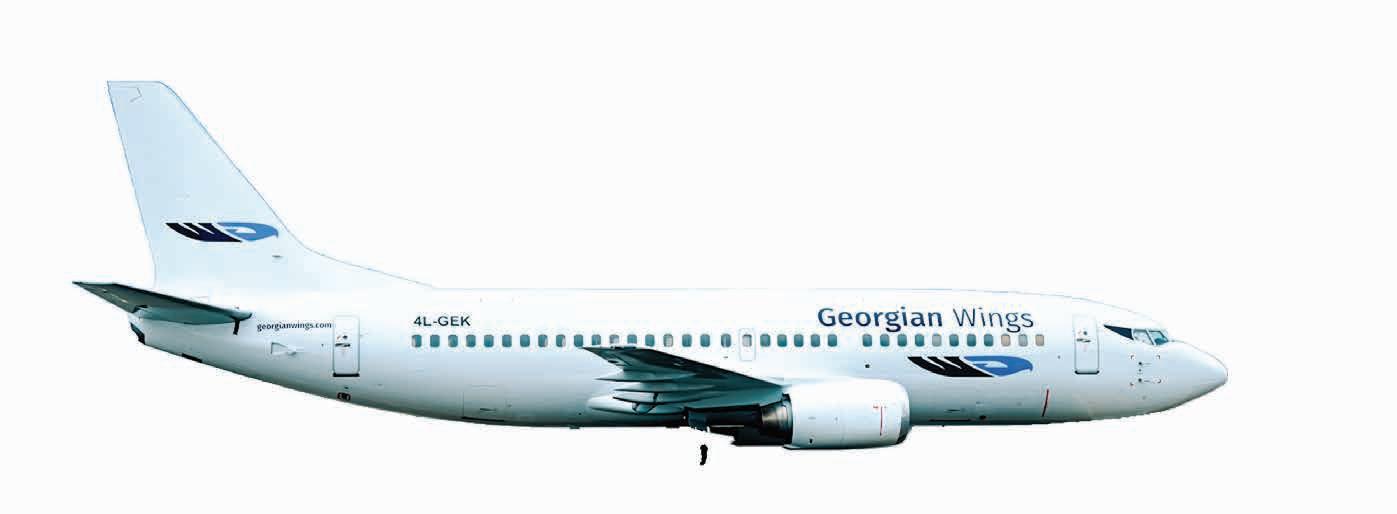

www.czechleaders








www.czechleaders





Interview with H.E. Mr. Mateusz Gniazdowski, Ambassador of Poland
WE BECAME ACUTELY AWARE OF HOW CLOSE WE ARE
Interview with H.E. Ms. Tea Maisuradze, Ambassador of Georgia
LIVING AND WORKING AMONG FRIENDS
Interview with Ondřej Soška, Czech Commissioner General at World EXPO 2025 LIKE THE OLYMPIC GAMES WITHOUT SPORTS
Interview with H.E. Ms. Mosa Ditty Sejosingoe, Ambassador of the Republic of South Africa
I BELIEVE IN THE POWER OF DIALOGUE AND COLLABORATION
Interview with Ryan Gauci, General Manager of Hilton Prague IT’S ALL ABOUT THE TEAM
Interview with Jindřich Fryč, Chief State Secretary for the Civil Service WE ARE MAKING THE CIVIL SERVICE MORE ATTRACTIVE
Interview with Avivit Yorkevich, CEO of Validit.ai startup DO YOU SPEAK THE TRUTH?
Interview with Jiří Pos, Chairman of the Prague Airport Board of Directors STRONGER THAN LAST YEAR
Interview with Petr Kapoun, CEO at TRL Space
DISRUPTING THE TRADITIONAL SPACE INDUSTRY
Interview with Andrea Ferjenčíková, EIB Group Representative in the Czech Republic
I IDENTIFY AS A EUropean
A farewell message from the Ambassador of Spain, H.E. Mr. Alberto Moreno Humet
FEELING PRIDE IN THE SPANISH HALL OF PRAGUE CASTLE
The official visit of the President of the Senate of Romania ROMANIA AND CZECHIA, AN ENHANCED PARTNERSHIP WITH GREAT POTENTIAL
Special reception at the Polish Embassy POLAND’S NATIONAL DAY, AND THE ANNIVERSARY OF 90 YEARS OF THE POLISH DIPLOMATIC MISSION IN FÜRSTENBERG PALACE
136 nominations - 11 awards THE ADMINISTRATIVE ACHIEVEMENT OF THE YEAR: NOT A COMPETITION, BUT A CELEBRATION
Women ambassadors bring inspiration H.E.R STORY EXHIBITION: THE EVENT WE SHOULDN’T MISS
Cooperation between the City of Brno and Mucha Foundation MUCHA TRAIL 2024
Trend explained by an acclaimed architect ON THE IMPORTANCE OF OUTDOOR SPACE
Visiting Canadian Medical Waltrovka Clinic in Prague ONE-DAY SURGERIES ARE GETTING INCREASINGLY POPULAR
Modern craftsmanship by iota WHO SAYS LUXURY CAN´T BE SOCIAL?
Keeping up our good habits and visiting Germany again AHOJ, NACHBARN!
Benke Aikell – Founder | Eva Anderová & Meshulam Zisso – Owners & Executive Editors | Petra Kubernátová – Webmaster | Martina Hošková – Edit & Translation | Martin Mikeš – Graphic Design | Publisher PRIME (1998) s.r.o., Olgy Havlové 2914\52, 130 00 Žižkov - Prague 3, IČ: 25682784, DIČ: CZ25682784, e-mail: info@czechleaders.com, www.czechleaders.com | Czech & Slovak Leaders, Olgy Havlové 2914\52, 130 00 Žižkov - Prague 3, email: info@czechleaders. com, www.czechleaders.com | Licence: MK ČR E 13147 | No reproduction is permitted in whole or part without the express consent of Czech & Slovak Leaders | The advertiser is responsible for the advertising contents | Opinions expressed in this publication are those of the authors or persons interviewed and do not necessarily reflect the views of the editors or Czech & Slovak Leaders | All editorial material and photos in Czech & Slovak Leaders Magazine is digitally stored and may be republished by Czech & Slovak Leaders either in printed form or in various digital media | All correspondence to Czech & Slovak Leaders Magazine may be published.
H.E. Mr. Mateusz Gniazdowski, Ambassador of Poland, has always paid attention to Czechia, be it in his analytical work, academic work, or as a practitioner. “I was able to treat my mission as a more intensive continuation of my previous activities,” he confirms.
“Poland takes over the presidency of the V4 from the Czechs in mid-2024, which further prompted our two countries to coordinate more closely. In these extremely difficult times for Europe and our region, Polish-Czech cooperation is intense and friendly.”
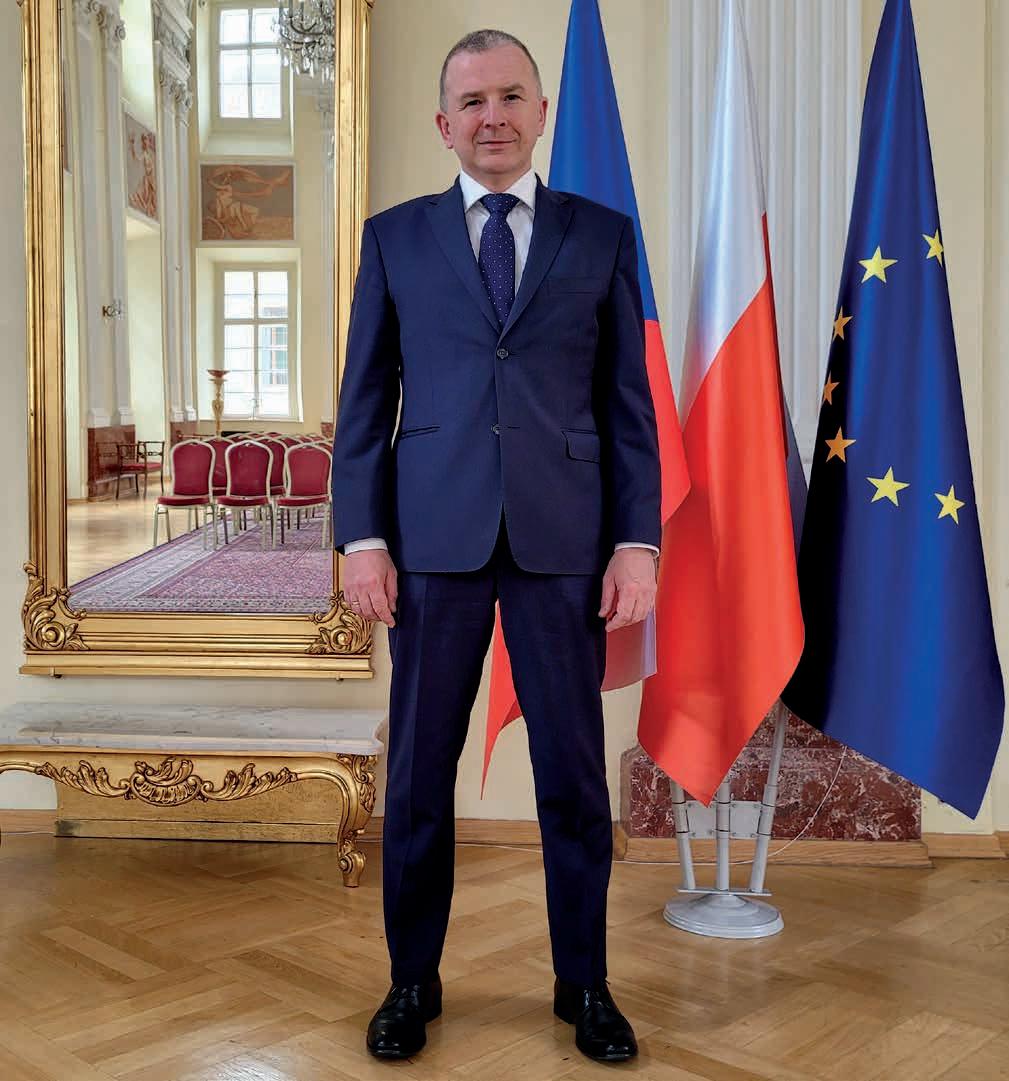
Can you tell us about yourself?
I have the honour to have served as Ambassador of the Republic of Poland to the Czech Republic from September 2022. I have been professionally involved in Polish foreign policy since 2004. In the year of Poland’s accession to the European Union, I started working at the Polish Institute of International Affairs (PISM), later working at the Centre for Eastern Studies (OSW) – a state analytical institution subordinate to the Prime Minister’s Office. I headed OSW’s Central European Department, and in 2016 became OSW’s deputy director. Before that, I defended my doctoral thesis on the history of PolishCzechoslovak relations at Komenský University in Bratislava, which I wrote at the Institute of Political Science of the Slovak Academy of Sciences.
My wife is a professional diplomat, who has worked at the Ministry of Foreign Affairs since 2006 and was deputy director of the Polish Institute in Prague from 2017 to 2020. It is also for this reason that we have been connected to the Czech Republic for years. Our two teenage daughters have spent a large part of their childhood and education in Prague.
How did you become an ambassador?
While working at PISM and later at OSW, and dealing with Central Europe, I paid a lot of attention to Czechia. This went beyond analytical work – in my academic work, I dealt with Polish-Czech relations, as well as with public diplomacy as a practitioner. In 2013, Foreign Minister Radosław Sikorski appointed me chairman of the Programme Board of the Polish-Czech Forum – a bilateral grant and advisory instrument affiliated with the Foreign Affairs Ministries of both countries, supporting Polish-Czech cooperation.
Foreign Minister Zbigniew Rau offered me the ambassadorial post in Prague in February 2022, when Polish-Czech relations were in crisis over a dispute over the cross-border effects of mining at the Turów lignite mine. My nomination presented me as an expert, which was demonstrated in a hearing before the Foreign Affairs Committee of the Polish Sejm and the acceptance of my candidature by acclamation by all members of the Committee, regardless of party affiliation.
Did you have to change your lifestyle after assuming the ambassadorial post?
I took up the post fully aware that I would no longer be the master of my own time – it is a most important lifestyle change. However, my previous work in analytical positions included a number of aspects that allowed me to enter the world of diplomacy without major problems. The international contacts to date, the many friends in Prague, the constant networking, the advisory work and promotion of Polish analytical thought, as well as the public diplomacy carried out in the Polish-Czech Forum, meant that I was able to treat my mission as a more intensive continuation of my previous activities. One change I did have to get used to was the large amount of time-consuming traditional rituals that still characterise this rather conservative profession: the work of an ambassador.
You have been in the Czech Republic for a year and a half. Can you share your impressions?
My first impressions were very good – I encountered friendliness and openness. After several years of vacancy or staffing problems for the head of the Polish diplomatic mission in Prague, I heard the word ‘finally’ more or less clearly everywhere.
I arrived in September 2022, when the Turów agreement was already being implemented. There was a general expectation in Prague that this impetus should be used for a ‘new opening’ in Polish-Czech relations. And, even more importantly, Russia’s fullscale invasion of Ukraine was underway, bringing our countries together in support of the invaded country. Poland and the Czech Republic cooperated closely from the first hours of the invasion. We became acutely aware of how close we were, and how similar our threat perception and common values were.
From the beginning, the friendly contacts in the diplomatic corps were a huge support for me. I am very grateful to my colleagues for their kind reception. My first two courtesy visits – to the Lithuanian ambassador and the German ambassador – were particularly memorable.
What is the most difficult part of being an ambassador?
A difficult question. In a position like this, sometimes you have to be able to say ´no comment´, although the nature of an expert and advisor who has had no problem with being candid over the years may suggest otherwise...
You mentioned not being the master of your own time anymore. Do you have any free time at all then?
Working as an analyst, I did not break with historical research, and published at least one academic article every year. Paradoxically, I wrote one of my last research papers before coming to Prague (not knowing about the appointment yet) about the work of the Polish embassy in Prague in the early 1990s. I no longer have time to write historical studies, but I sometimes try to find a moment to read a history book. I am often
away from Prague on business, especially in the Polish-Czech border regions, and I like to return there sometimes in my free time too.
You are an expert on the internal and foreign policy and regional cooperation of the Central European countries, especially the Visegrad countries. How do you see the situation now and in the future?
I came to Prague during a crisis in Visegrad cooperation. At that time, differences in attitudes towards Russia’s revisionist policy were already affecting the intensity of this cooperation. The Slovak presidency of the V4 was characterised by restraint, which was also assumed by the Czech side. Complications were already demonstrated at the planning level by the fact that the programme of the Czech V4 presidency was, for the first time, not agreed and accepted as a joint document, but only acknowledged as a Czech proposal. The change of government in Slovakia and
the perplexities in Czech-Slovak relations further complicated this cooperation.
Poland takes over the presidency of the V4 from the Czechs in mid2024, which further prompted our two countries to coordinate more closely. It was possible to introduce the custom of Polish-Czech meetings ahead of some V4 meetings – thus Prime Ministers Donald Tusk and Petr Fiala met in Prague, and a bilateral visit by Foreign Minister Radosław Sikorski preceded a meeting of V4 ministers. The Prague meetings of the V4, including the heads of states and presidents of Parliaments, were frank discussions that confirmed differences in views on security issues and values, but also showed the need for continued cooperation, as well as a certain scope of common interests.
The V4 has its achievements and potential, but, as Mr Sikorski recently mentioned in the Sejm, it has changed its nature and “using an instrument inappropriately could damage it”. The V4 will
therefore be useful for sectoral cooperation on infrastructure issues, or for efforts to protect the external borders of the Schengen area. Infrastructural cooperation in our part of the EU is also supported by the Three Seas Initiative. This is a further format that provides an opportunity for the Czechs to cooperate in the Baltic Sea region. For the security issues of NATO’s eastern flank, especially concerning improving coordination between the allies from the Baltic Sea to the Black Sea, the Bucharest Nine (B9) format also serves a useful function.
Poland is perceived as a pleasant holiday destination by a growing number of Czech people. How do you promote your country?
I have been dealing with Czechia and Polish-Czech relations for over two decades, and there has never been such a good situation for the promotion of Poland in Czechia as at present. Poland has become a positive reference point in many areas, such as the devel-
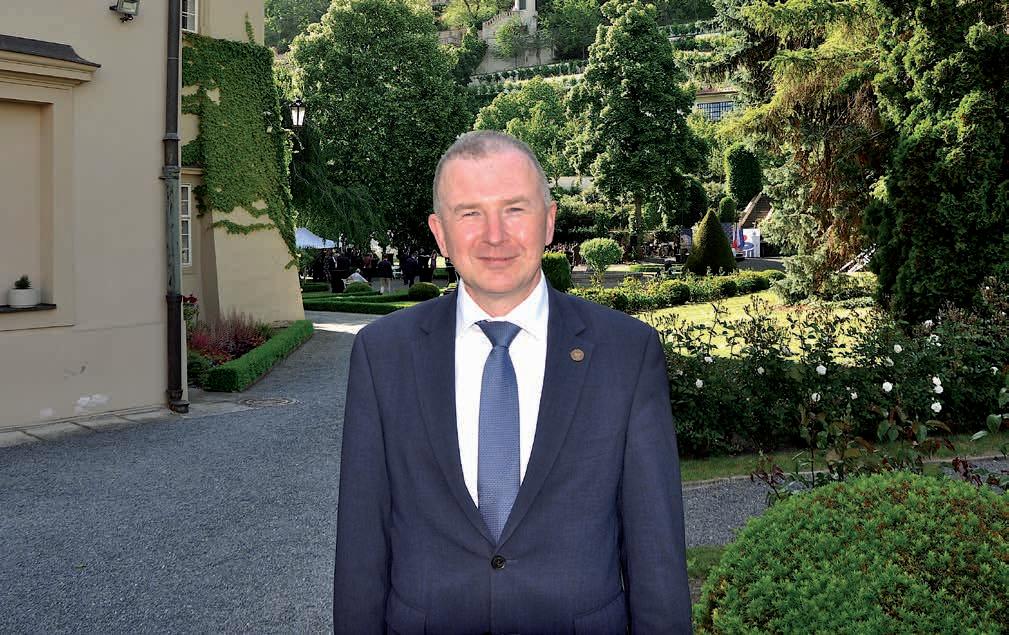
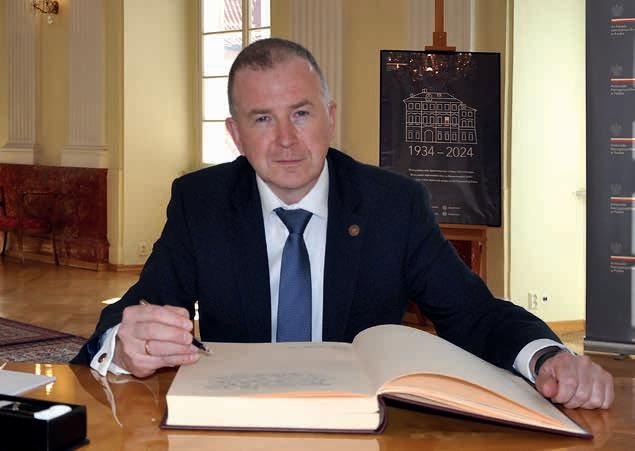
opment of transport infrastructure, digitalisation, defence, and the use of EU funds. Due to price differences, many Czechs come to Poland to go shopping, and have started to appreciate Polish products. And yes, in recent years, an increasing numbers of Czechs have also been coming to Poland for holidays.
We are trying to promote what Poland can offer to Czechs more actively; an office of the Polish Tourist Organisation has been operating in Prague for a year now. Our priority is to invite people to Poland. It is not just about business – a trip to Poland is the best possible promotion of our country, a panacea for all stereotypes and prejudices, which are slowly becoming obsolete. Sociological studies show that sympathies for Poland are steadily growing. We started at the beginning of the 1990s from a very low level, and Poland is now among the countries most liked by Czechs. If I might add, we are beaten only by countries very much historically close to the Czechs such as Slovakia and Austria, which provides a reason for satisfaction.
Can you evaluate the current status of Czechia-Poland relations in more detail?
As I mentioned, in these extremely difficult times for Europe and our region, we have good momentum in our bilateral relations. This applies to political, as well as economic and social, issues. Our trade volumes are impressive (reaching €33 billion in 2023). After Germany, Czechia is the second destination of Polish exports (€22 billion). Foreign Minister Sikorski, speaking in the Sejm about Polish foreign policy priorities, mentioned that Poland’s most important partners in the EU are Germany and France, while, at the same time, Czechia was identified – along with the Nordic countries, Baltic states, and Romania – as “our very valuable and future-oriented allies”. The minister added that “these are countries with whom we understand each other without speaking” – but this does not mean that we do not talk!
President Petr Pavel followed his election with a visit to Poland after his traditional first visit to Slovakia. This year, Prime Minister Donald Tusk and Foreign Minister Sikorski have already been in Prague, and, on the occasion of the V4 summit, the presidents of both chambers of the Polish parliament also visited Prague. Intergovernmental consultations are to take place
in the autumn. Polish-Czech cooperation is intense and friendly.
This interview is done on the occasion of Poland’s national day. What do you wish for your country? And for the Czech Republic?
Our countries and nations have passed a tough test with flying colours – supporting the invaded Ukraine, welcoming refugees, and correctly diagnosing the dangers of Russian imperialism and revisionism. I would like us to better realise that we are passing the test exemplarily. This not only gives us legitimate moral credit, but will also strengthen our security in the long term and translate into economic strength for our region. We have been co-creating Europe for over a thousand years. Let us today have the courage to co-create the European Union on a fully-fledged basis and to clearly articulate our interests and expectations.
My wish for all of us is that Central Europe will emerge from this time of war and crisis stronger, making the entire European Union stronger and more resilient. Our national holiday on the third of May commemorates one of the first constitutions in the world – the Constitution of the Polish–Lithuanian Commonwealth (1791), which remains to this day a source of inspiration as an example of cooperation for state reform in the spirit of freedom and independence. To the readers of Czech & Slovak Leaders magazine, I wish you all the best, and I would like to thank the editorial team for your activities supporting the integration of the diplomatic corps in an atmosphere of understanding and cooperation.
On 29th September 2022, I arrived in Prague, knowing that it would not be a long stay and that it was my last posting as a diplomat and as Ambassador.
I knew Prague from a previous visit I had made years ago, and I remember that the Embassy had taken us to dinner at a restaurant that I have been unable to find the entire time I have been here, and I must say that I have looked for it.
I arrived with great enthusiasm, but without knowing what I would find here, and what my life in Prague would be like. It has to be said that Prague is trendy in Spain, and that it is a popular tourist destination. The challenge is that this creates very high expectations, and sometimes the reality is not what we imagine it to be.
So, I landed in Prague with previous impressions and with high expectations, and, now I can say it – not only did Prague not disappoint me, but it has surpassed the high expectations I had formed of it. I fell in love with the city a few days after arriving, and if I ever disappear, look for me in Prague.
I am aware that the Czech Republic is much more than just Prague, so I have taken every opportunity to visit the country, and today I can proudly say that I have been to every region of the Czech Republic – from Ústí nad Labem to Ostrava, and from Bohemia to
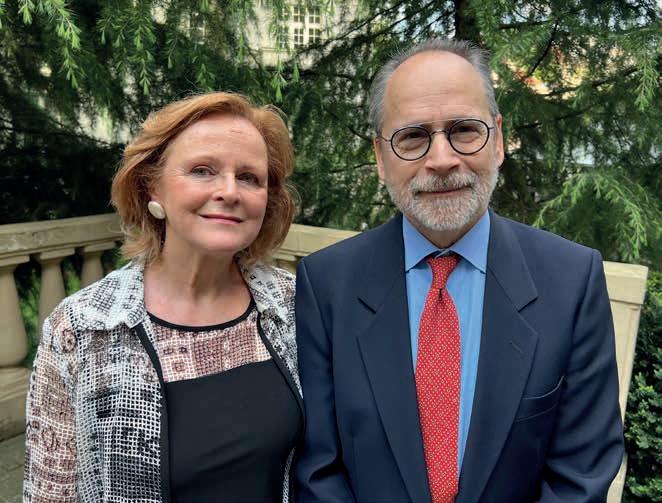
Moravia / Silesia. I have visited the second oldest university located in Olomouc, and the wonder of Český Krumlov. I have strolled through the functionalist city of Zlín, and attended the film festival in Karlovy Vary. However, I have been to Pilsen three times and have not been able to visit the brewery. Obviously, I will have to come back.
During this time, I have met many people, and I have always tried to learn and understand the Czech character and culture – it is the product of a rich, sometimes challenging, history, but one whose upheavals have shaped the personality of the Czech people.
As Europeans, we have many things in common, including
history, and it is with a sense of pride and satisfaction that I attend the important official events taking place in the Spanish Hall of the Castle.
Nevertheless, I would like to think that as Europeans we have learned something from our common history. I would also like to think that, through this collective project called the European Union, we are building a future in which we will banish negative values such as hatred, violence, and racism, in order to create a new Europe based on solidarity, tolerance, and respect for human rights and democracy.
I am happy to think that Czechs and Spaniards (and many more) share these values, and are building a better future together.
Who is Tea Maisuradze, in one sentence?
I am a career diplomat, and a fervent advocate for women’s rights, equality, and equity.
How did you become an ambassador?
My journey towards becoming an ambassador was fuelled by a lifelong aspiration to enter the diplomatic field, a dream that took root in my early childhood. My academic pursuits in International Relations naturally led me to the Ministry of Foreign Affairs of Georgia upon my graduation in 2006. Serving my country as an ambassador is a privilege, an honour, and a profound responsibility. My motivation stems from a desire to contribute to Georgia’s security, stability, and its path towards European and Euro-Atlantic integration.
It has been about a year since you arrived in Prague. Can you share your impressions?
It has been a profound honour to serve as a Georgian Ambassador in Czechia, marking my second ambassadorial assignment. I enjoy living in one of the most beautiful capitals in the world. The enduring beauty and architectural magnificence of this capital city continue to captivate me daily.
The shared values for freedom and democracy, as well as the
“Georgia is the land of the first Europeans, where Europe’s highest settlement, Ushguli village, is located,” says H.E. Ms. Tea Maisuradze, Ambassador of Georgia.
“We are glad that a new direct connection between Tbilisi and Prague will be resumed from May 2024. Last year, Georgia welcomed nearly 14,000 visitors from Czechia, and we hope that this number will increase. As one of the oldest Christian countries, Georgia offers a wealth of magnificent experiences.”
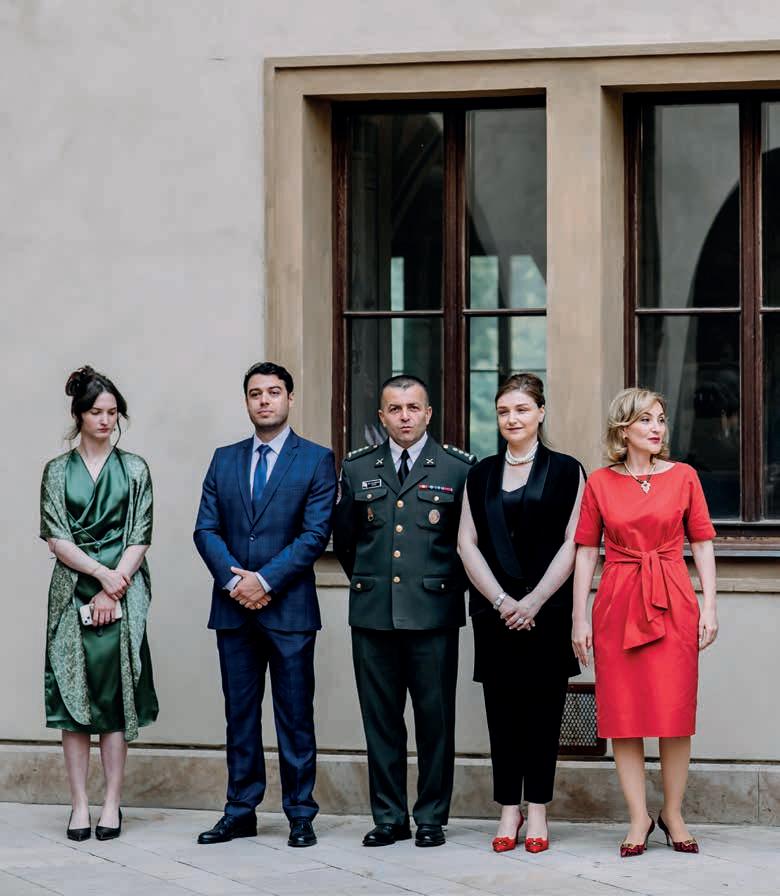
common history of Soviet occupation, lay a strong foundation for mutual understanding and collaboration between our countries. Moreover, it is always an advantage to represent your country in a partner country, and to live and work among friends.
Which countries have you served in before?
Before coming to the Czech Republic, I had the honour to work in Georgian Embassies in Austria and Latvia. These postings afforded me invaluable experiences
H.E.
Ms. Nino
Ms. Julieta
Colonel
Defense
Cpt. Giorgi Alavidze, Police
Ms. Mariam Orjonikidze,
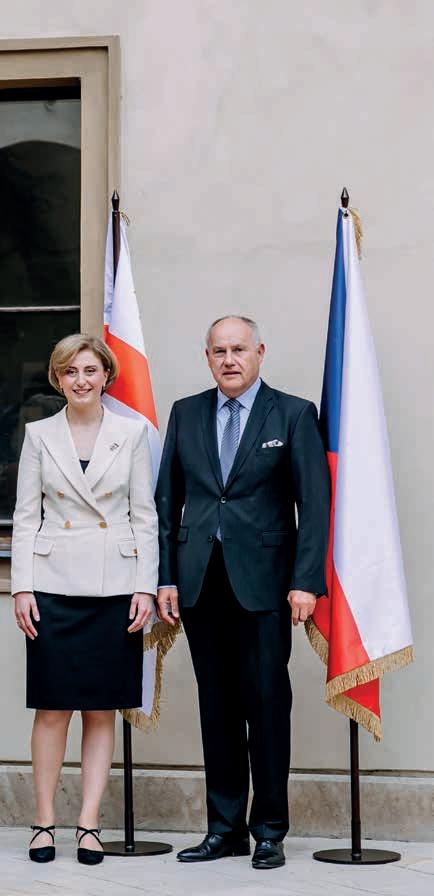
and fond memories, enriching my diplomatic career.
How do you perceive the role of ambassador?
The role of an ambassador, while
rewarding, demands that personal life often must be scheduled around professional duties. The diplomatic profession requires constant commitment, but it is a commitment I embrace wholeheartedly, living by the maxim “Find a job you love, and you will never have to work a day in your life”.
Does the constant commitment allow you to relax in your free time?
I find relaxation in music, drawing, and spending free time with my two Jack Russell terriers. Cooking and reading historical and scientific literature are also among my favourite ways to relax.
It is not new to say that Georgia wants to join the EU and NATO. Have you seen any development in this regard?
Becoming a member of the EU and NATO is a top priority of Georgia’s foreign policy. This is a value-based historical choice of the Georgian people, supported by more than 80% of the population, and enshrined in our constitution.
My country has been defending the European choice, at the expense of existential risks, throughout its history. Still struggling against the Russian military occupation, Georgia has been strengthening its democracy, and is pursuing the goal of full-fledged EU and NATO membership.
We are happy that last year, due to our dedication towards European integration and the support of our partners, the EU made a wise decision to grant the candidate status to Georgia.
At the Bucharest Summit in 2008, the Allies decided that Georgia would become a member of NATO. Since then, with the help
and support of the Allies, we have significantly developed our defence and deterrence capabilities, now having all practical tools to prepare for membership.
For two decades, Georgia has been actively contributing to the common Euro-Atlantic security through its participation in NATO-led operations, being the largest per-capita contributor in Afghanistan. In many ways, aspirant Georgia is already acting as an Ally, and we have proved on multiple occasions that we are willing and able to assume the responsibility of collective defence.
Achieving membership in the EU and NATO not only aligns with our historical aspirations but essentially contributes to Regional and European Security architecture. In light of Russia’s ongoing war in Ukraine, our partners and allies are more united on the enlargement policy.
For many Czech people, Georgia has great potential to become an excellent holiday destination. How do you promote your country?
Located on the crossroads of East and West, Georgia is famous for its oldest civilization, ancient history, and unique culture. The mix of two continents creates Georgia’s distinctive identity.
As one of the oldest Christian countries, Georgia offers a wealth of magnificent experiences. The Caucasus Mountains, the Black Sea coastline, and the vineyards of Kakheti, together with the world-famous Georgian hospitality, make Georgia a four-season destination and inspire all types of travellers. The uninterrupted winemaking tradition in Georgia stretches back over 8,000 years, and represents the central element of not only Georgian cuisine but culture as well. The ancient
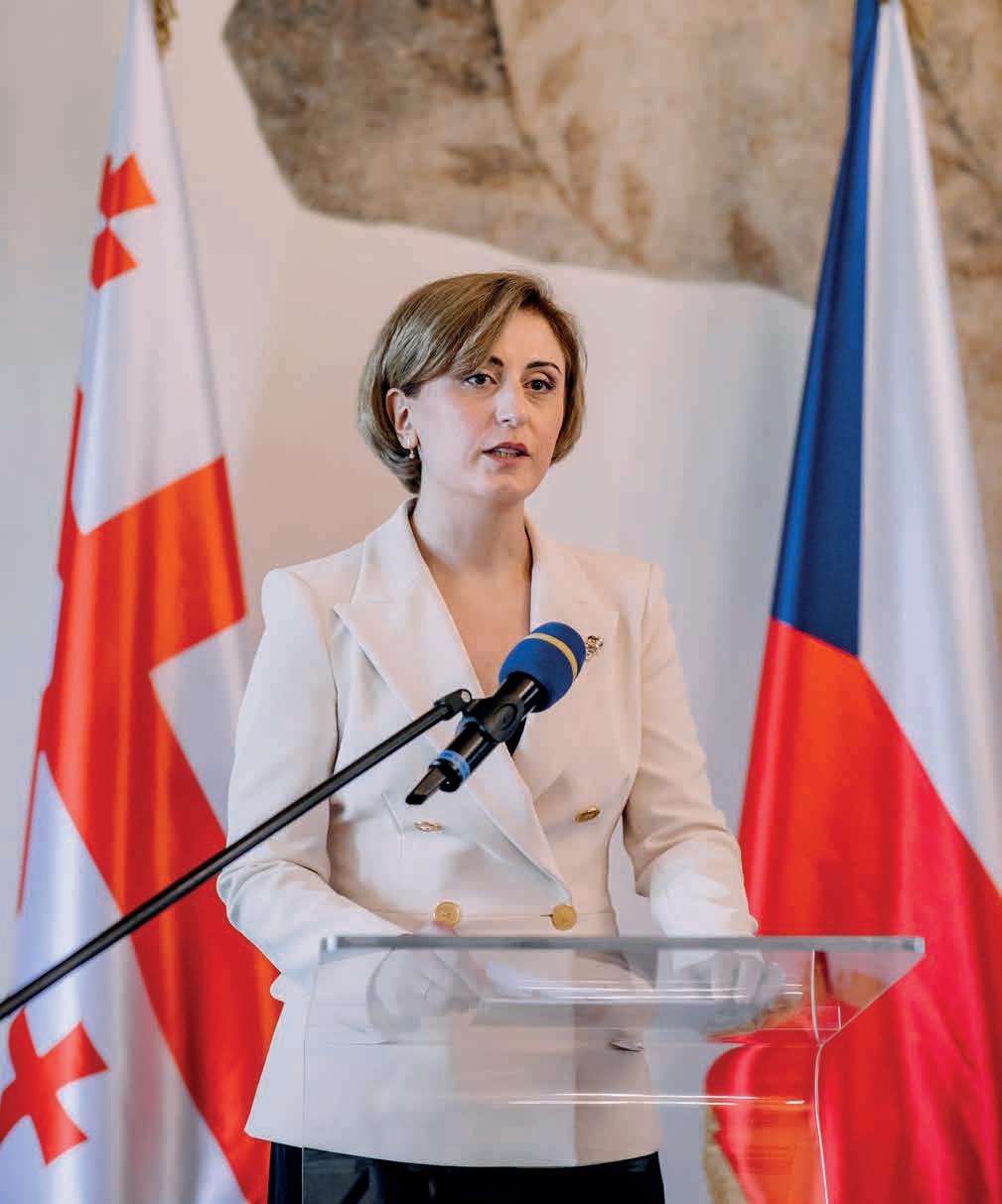
Georgian traditional Qvevri winemaking method is inscribed on the representative list of the Intangible Cultural Heritage of Humanity.
Georgia is the land of the first Europeans, where Europe’s highest settlement, Ushguli village, is located. Today, many of the cul-
tural and architectural heritage of Georgia represent UNESCO sites.
We are glad that the direct connection between Tbilisi and Prague will be resumed from May 2024. “Georgian Wings” will operate flights twice a week, which will create the second direct link between Georgia and Czechia,
along with the already existing Kutaisi-Prague flights. Increased air connection will be beneficial not solely for tourism purposes, but will also further tighten people-to-people connections, promote business ties, and deepen economic cooperation in many aspects. Last year, Georgia welcomed nearly 14,000 visitors from
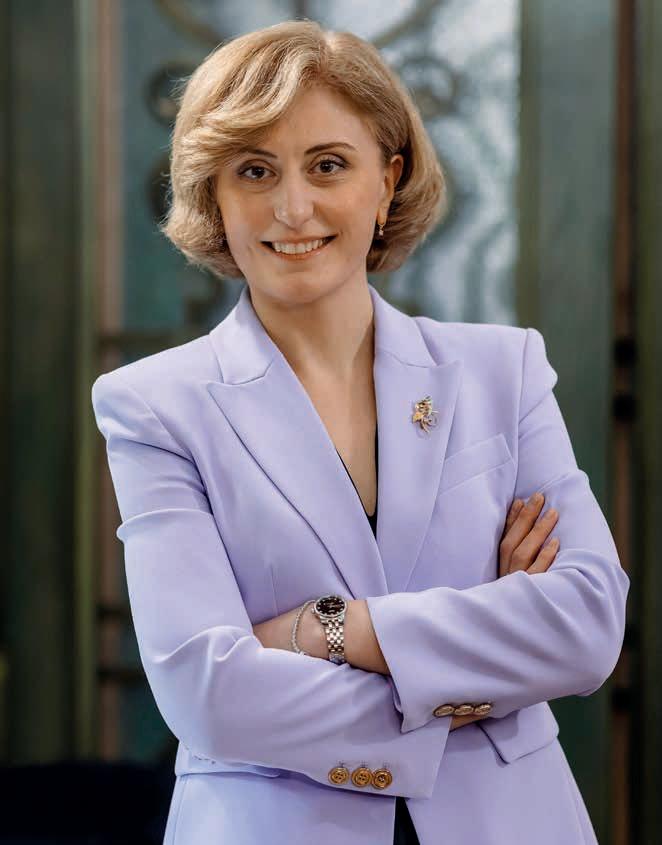
Czechia, which is approximately a 60% increase. We do hope that this number will increase even further, and that more visitors from Czechia will discover and explore Georgia.
What is the status of Czechia –Georgia relations?
We enjoy a good relationship, friendship, and partnership with the Czech Republic. Czechia is a strong supporter of Georgia’s foreign policy priorities, and, first and foremost, Georgia’s integration into NATO and the EU. Czechia has always rendered its firm and vocal support towards the territorial integrity and sovereignty of Georgia, against the Russian aggression and the ongoing occupation of Georgia’s territories by Russia.
Last year marked the 30th anniversary of the establishment of diplomatic relations between Georgia and the Czech Republic. Our bilateral relations are intense, and continue to develop dynamically. The frequency of visits and meetings is proof of the excellent cooperation our two countries enjoy.
In recent years, Czechia has become a significant development cooperation partner, and is one of the top investor countries in Georgia.
This year, the Czech Republic marks 25 years of membership in NATO, and 20 years of EU membership. Seizing the opportunity, I congratulate Czechia on this milestone and emphasize the importance of cooperation
regarding European and EuroAtlantic integration. Czech devoted advocacy on the way to Georgia’s European and EuroAtlantic Integration, as well as experience-sharing in the process of accomplishing our goals, is highly valuable for us.
This interview is done on the occasion of your national day. Let us use this opportunity to make a wish for our countries, will you?
Indeed, Georgia celebrates its Independence Day on May 26th. On this day, in 1918, the first Democratic Republic of Georgia was established. With this, the statehood, which dates back to ancient times, was restored after the annexation by the Russian Empire in the 19th century.
The values of European Democracy laid the foundation for the Constitution of the First Democratic Republic, which, due to the progressive ideas it embraced, was remarkable even in Europe of that time. Regretfully, the shortlived democracy fell victim to the invasion of the Red Army in 1921. Regaining freedom after seventy years of Soviet occupation did not come effortlessly, but with the enormous sacrifice of our heroes that we honour today.
My wishes for Georgia encompass full reintegration within its internationally recognized borders, and its membership in the EU and NATO.
To the Czech Republic, I extend my best wishes for continued prosperity and success, in solidarity with our shared aspirations and values.
“161 countries and 9 international organisations will take part in EXPO 2025 in Osaka, Japan. World EXPOs are the largest social, business, and cultural events in the world,” describes Ondřej Soška, Czech Commissioner General at World EXPO 2025. “The organizers anticipate an exceptionally high number of visitors - up to 30 million. The central theme is ‘Designing Future Society for Our Lives’, and we want to showcase that Czechia is the home of a creative nation.”
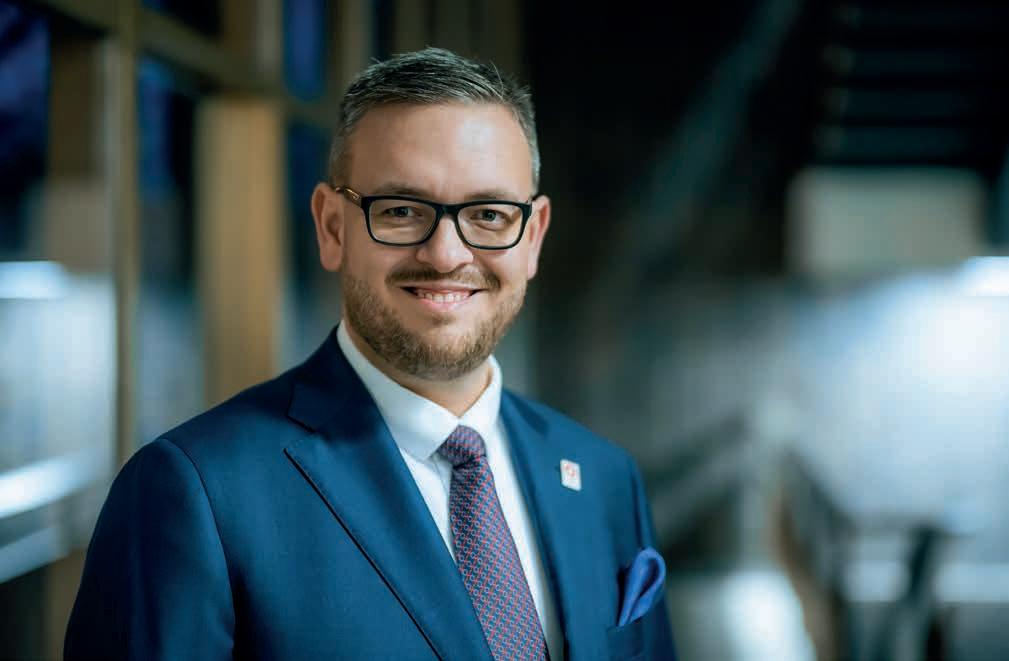
Can you explain what makes a person take on such a difficult role?
I hold a special place in my heart for Japan, its culture, and its way of doing business. The one semester I spent in Japan had a significant impact on my life and way of thinking. Besides, I believe the World EXPOs offer a unique opportunity to strengthen the national brand, and provide international exposure for
innovative and promising companies. Therefore, I wanted to make use of my international experience in order to fully utilize the potential of the EXPO 2025 Osaka, Kansai, for our country and businesses.
How important is it for a country to participate in an international event like EXPO?
World EXPOs are the largest social, business, and cultural
events in the world. Held every five years, they last six months and regularly attract tens of millions of visitors. They provide a unique global platform for nations, major companies, and organisations to showcase their latest ideas, solutions, and technological innovations. They can be seen as the non-sporting equivalent of the Olympic Games, and as an excellent platform for building a national brand.
The next EXPO will take place from 13th April to 13th October 2025 in Osaka, Japan, in the Kansai region, home to over 20 million people. The organizers anticipate an exceptionally high number of visitors — up to 30 million. For Czechia, this event presents a unique opportunity to showcase itself not only to professionals but also to the general public, fostering the development of both business and political relationships with one of the world’s strongest and most stable economies.
What are you aiming for, in terms of the Czech participation?
We have several goals. Firstly, it’s to support Czech exporters in their business efforts – not only in Japan but throughout the entire Asia-Pacific region. Many studies have proven the effectiveness of the return on state investments in export support. In addition, we want to help attract new investors and expand existing investments in Czechia. Incidentally, Japan is the second largest foreign investor
here, employing over 50,000 people. We also aim to further expand scientific research cooperation between Japanese and Czech research institutions, and help attract Japanese tourists to regions beyond Prague.
Above all, participation in EXPO 2025 will be an excellent opportunity for companies to expand not only in Japan but also in the wider Asia-Pacific region, where access is not always easy. In Asia, the perception of a state is much stronger than in Europe, and if a company works with the state and participates in the national pavilion then it carries much more weight and relevance in the eyes of local partners. Of course, some companies may not have ambitions to expand into Asia but still perceive EXPO as a prestigious event, as well as a great reference project for domestic and international partners. Ultimately, this could lead to expansion into new markets or increased order volumes. This idea is supported by the experiences of companies such as Koma Modular, GreenTech, and
the Czech Mint, who took part in the Czech pavilion at World EXPOs in the past. For regions and cities, the focus is mainly on attracting tourists and investors.
How will the Czech Republic contribute to the central theme of the EXPO 2025?
The central theme chosen by the organizers is ‘Designing Future Society for Our Lives’. They aim to inspire visitors to contemplate how they want to live, and how they can maximize their personal potential. The Japanese recognize that we live in challenging times, with emerging social issues. On one hand, economic inequality is increasing, and new armed and social conflicts are emerging. On the other hand, the incredible pace of innovation and development is bringing revolutionary technologies, including artificial intelligence and biotechnologies, which are and will continue to bring unprecedented changes to human life. The EXPO site will be conceptually divided into three parts, with participants highlighting
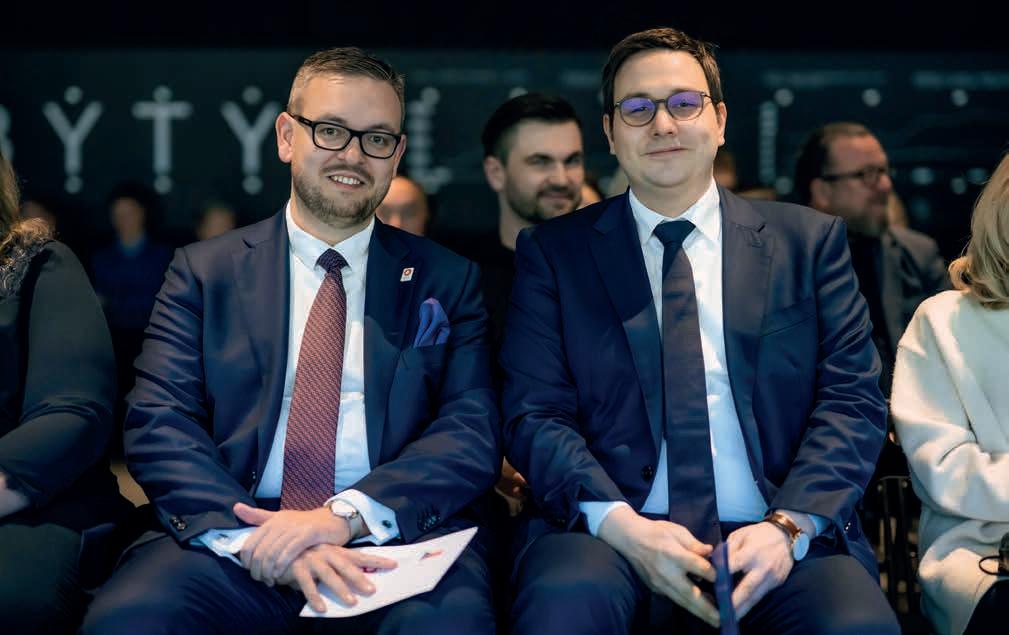
one of the three sub-themes in each section: Saving Lives, Empowering Lives, and Connecting Lives.
Czechia, with its national theme of ‘Talent and Creativity for Life’, will be part of the ‘Empowering Lives’ section. We aim to present Czechia as a confident and competitive country, emphasizing sustainability, safety, education, and innovative potential. We want to showcase that Czechia is the home of a creative nation, and that Czech ideas have transcended national and continental borders. We have a lot to offer to the world. Thanks to Czech talent and creativity, we are capable of offering solutions to some of the challenges that contemporary society and the world are facing. We want to be part of the discussion through our business program, which is open not only to Czech and Japanese companies but also to leaders in selected discussions.
Recently, Czech Foreign Minister Jan Lipavský signed the Japanese-Czech Air Service Agreement, planning on establishing direct flights between the two countries. Do you therefore expect many Czechs to visit EXPO 2025?
The signing of the Japan-Czechia Air Service Agreement is a necessary step forward in establishing direct flights. I fly to Japan every 6 to 8 weeks, and although I’m used to travelling extensively, I must say it’s challenging. Direct flights will significantly ease many things. I’m pleased that the current Czech Ministers of Foreign Affairs and for Local Development are intensely focused on this issue. If we manage to establish direct flights, it will be excellent news for Czech tourists and Czech companies. The Yen has weakened considerably, making Japan more affordable for us. Moreover, for
those considering a visit to Japan, next year will be the best and most ideal time. Besides experiencing the beauty of Japan, people will be able to see the whole world in one place, and take away unique experiences from the World EXPO 2025. Business representatives will be able to make contacts and potential contracts, and will be able to establish new collaborations. Such opportunities don’t come along every day.
Tell us about the Czech Pavilion – will it be in one of the best locations on the EXPO site?
That is correct. The Czech National Pavilion will be located in Osaka, Japan, almost at the intersection of the coastal promenade and the main boulevard. I believe the pavilion will offer a dignified backdrop for Czech participation in EXPO 2025, which will take
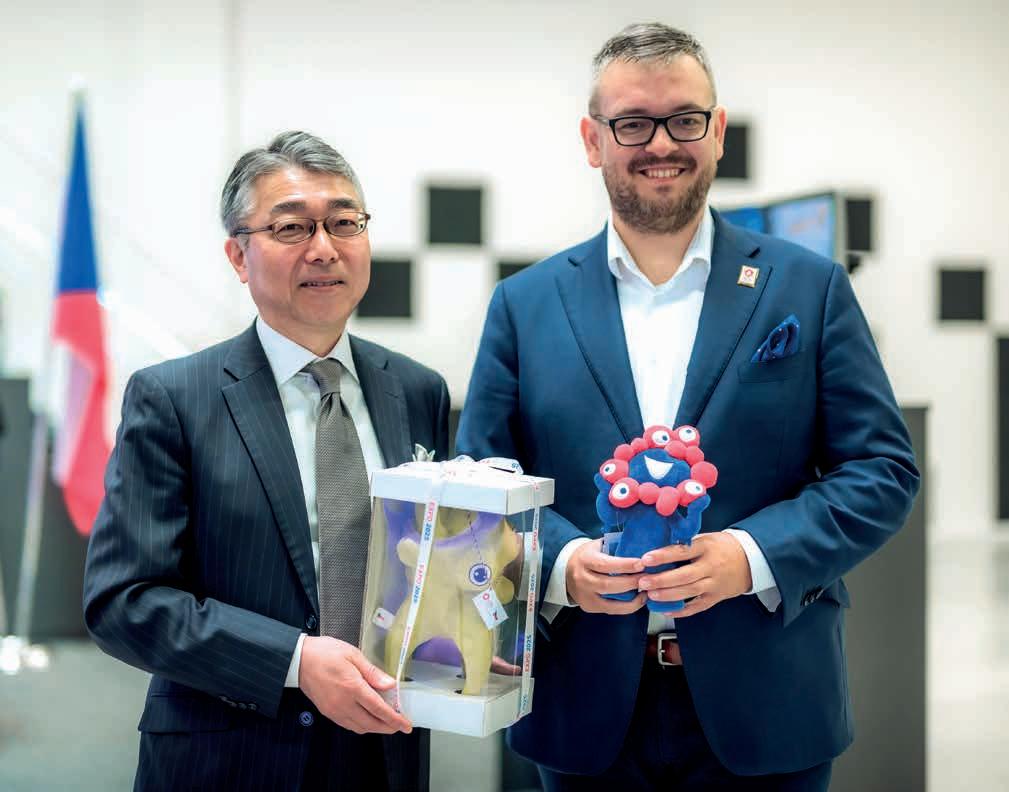
H.E. Mr. Martin Klučar, Czech Ambassador in Tokyo
Yokoyama Hideoyuki, Mayor of Osaka City
Haneda Koji, Commissioner General of the 2025 World Exposition in Japan
Ondřej Soška, Czech Commissioner General at EXPO 2025
Murao Kazunori, President of Daisue Construction Co., LTD
Yoshimura Hirofumi, Governor of Osaka Prefecture
Ichinoki Manatsu, Deputy Secretary General of the Japan´s Association of EXPO 2025

place from April to October 2025 on the artificial island of Yumeshima in Osaka Bay. The pavilion will feature a permanent exhibition, a multifunctional auditorium, facilities for business meetings, a restaurant, a VIP lounge, and, in front of the pavilion, there will be a relaxation area with a view of the sea.
International architecture magazines and websites are already discussing national pavilions, especially those of Switzerland, China, Japan, and Czechia. However, many countries have, for various reasons, decided not to build their own pavilion design. To put this in perspective, 161 countries and 9 international organisations will take part in EXPO 2025, and around 60 countries had originally planned to build their own architecturally unique pavilion. Although many countries are still undecided, looking for a construction company, or waiting for building
permits, the most critical and as yet unconfirmed reports suggest that only about 40 countries will build their own pavilions (so-called Type A).
The design of the Czech National Pavilion by Apropos Architects –architects Tomáš Beránek, Michal Gabaš, Nikoleta Slováková, and Tereza Šváchová – has mainly been discussed due to its crystal spiral shape, with a facade made of Czech artistic glass. Less talked about, however, is the fact that the entire supporting structure will be made of wood, specifically a system based on cross-laminated timber (CLT) panels. It is expected that up to 15,000 visitors will pass through it daily, but many more people will see it from the outside. The spiral should be clearly visible from about one-third of the wooden ring. Therefore, the Czech National Pavilion will be our largest exhibit, and a jewel on its own.
How far along are you with the construction of the pavilion?
In mid-April, we introduced the Czech National Pavilion in virtual reality at the headquarters of Virtuplex.The virtual model at a scale of 1:1 helped us and the architects to perceive all distances, views of the interior and exterior, and catch all sorts of defects. On this occasion, we signed a contract with the general contractor, the Japanese construction company Daisue. I’m delighted that we are finally building the pavilion with a company that has been in the Japanese construction market since 1937, is based in Osaka, and has almost 600 employees. They’re also known for their dynamic approach to innovation and sustainability, which is great because our pavilion will be innovative in many ways.
But let’s get back to the construction. Preparatory work began

almost immediately after the contract was signed, and a month later, on 15th May 2024, a groundbreaking ceremony was held in Japan on the site on which the Czech National Pavilion will be built in the coming months. We are aware that the construction schedule is tight, but it’s a matter of national prestige. We are working day and night, both in Czechia and in Japan, to make it happen. We have verified delivery deadlines with all subcontractors, so unless some truly catastrophic scenario occurs, we will meet everything.
Which Czech companies are going to exhibit at the EXPO?
I would like to emphasize that World EXPOs are not traditional trade fairs where companies exhibit their products. It is a unique global platform for building a national brand, and the most powerful tool of economic diplomacy. They are held every five years, last for six months, and are visited by tens of millions of people. In Osaka, for the first time in modern history, we will divide
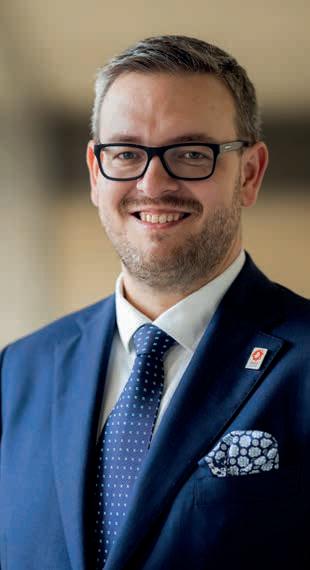
the pavilion into sections for the public and for professionals. Companies will be able to participate in thematic conferences, effectively present themselves to potential customers, and develop their existing business relationships. For these purposes, the pavilion will have a multifunctional auditorium, a lounge, and a meeting room. For the 26 weeks of the EXPO, we are preparing a variety of interesting business themes that will allow Czech companies to present themselves in Japan in the best light. These include, for example, nanotechnology, fintech, space technology, cybersecurity, and the circular economy. Those interested in cooperation can contact partnership@expo2025czechia.com or fill out the questionnaire on the website www.expo2025czechia.com. Companies such as Elmarco, a leading supplier of technology for the industrial production of nanofibres, and AtomTrace, which uses technology to provide in-depth understanding through the analysis of materials, are preparing for the EXPO.
We have a year to go until the opening of EXPO 2025. Are you looking forward to it?
Of course, I’m very much looking forward to the World EXPO. However, we still have a lot of work ahead of us. We need to build the pavilion, complete the visitor path, announce and finalize several public tenders, and secure relevant partnerships. All of this is for an event that will take place on the other side of the world. I often say that diamonds are formed under pressure, and I believe that the Czech National Pavilion will be such a diamond. My entire team, which is not particularly large, is putting an enormous amount of time and effort into the project. I usually compare this situation to running a marathon at a sprint’s pace. Due to the pandemic and the postponement of the previous EXPO by a year and a half, we have less time for preparations, and, frankly, it’s a challenge. But I welcome challenges.
was appointed by the Government of the Czech Republic as the Commissioner General at EXPO 2025 Osaka, Kansai, Japan on August 24th, 2022.
He is a manager, with over 20 years of experience in both the private and public sectors. He gained experience in Europe, the USA, the Middle East, and the Far East. He is a founding member of an association of Czech companies, entrepreneurs, and managers in the Middle East – Czech Business Council in Dubai – where he worked as Vice President between 2014 and 2020.
Mr Soška holds a Bachelor’s degree in Business Administration from Coventry University (UK), and a Master’s degree in Economics and Management from the Silesian University (Czechia). He also studied at the J. F. Oberlin University in Tokyo, Japan. He is fluent in Czech and English, and speaks basic Japanese.
“The Czech Republic is the first country in which I serve as an ambassador”, says H.E. Ms. Mosa Ditty Sejosingoe, Ambassador of the Republic of South Africa. “While I may not have an extensive list of countries under my belt, I bring a wealth of experience from my previous roles in senior management within the public service. I have had the privilege of working closely with international partners, understanding complex issues, and fostering collaboration. Being allowed to serve my country at this level is the greatest honour I gladly accepted.”
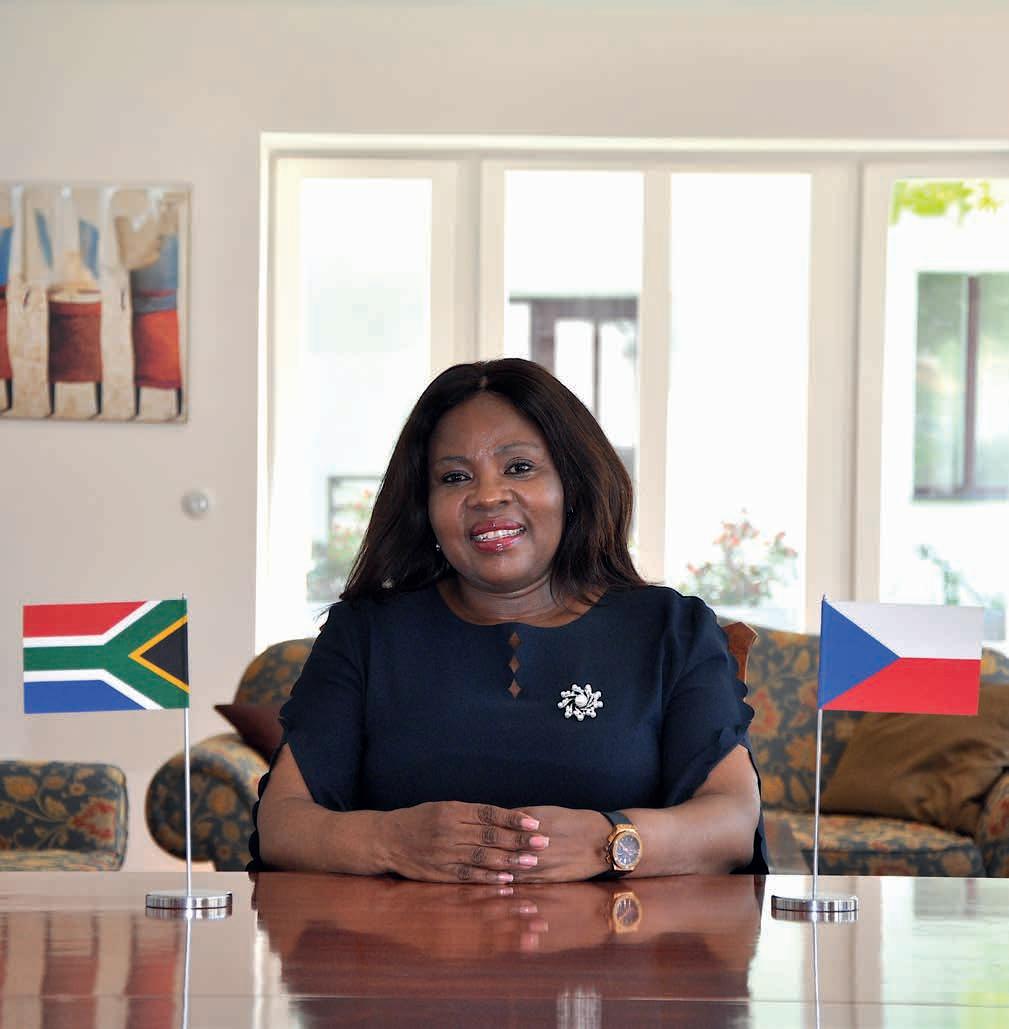
Can you tell us a bit about yourself, please?
Thank you for the opportunity. My name is Mosa Sejosingoe, and I am a mother blessed with three children – a daughter and two sons. I grew up in the village of Zingonyameni, in the Eastern Cape Province of the Republic of South Africa (RSA), where I lived with my maternal grandmother. Later, I joined my parents in Thaba ‘Nchu, the town in the Free State Province, where I continued my primary and secondary studies.
In 1985, my quest for knowledge led me to Mahikeng, the capital city of the North West Province of South Africa, where I enrolled with the University of North West (then UNIBO). In 1991, I graduated with a Bachelor of Commerce degree; this was to be a stepping stone towards shaping my destiny. I started working in the public service even before completing my junior degree. I continued to study, and obtained a B.A. Honours in Public Management and Governance (2001), and a Masters (M.A.) in Development and Management (2004).
Have you worked in the public service ever since?
My career of 35 years has been in the public and private sectors, with 30 of those being in the public sector. I have worked as both a career public servant – occupying the ranks of junior, middle, and senior management positions –and as an elected and political representative of the government of the RSA.
In addition to the positions I held in government, I had an opportunity to serve as an Executive Mayor of Mahikeng Local Municipality, the capital city of the North West Province (2006-2010). I became a Special Advisor to the President of the Republic of South Africa, and was later appointed
Head of the Presidential Hotline (2010-2012), which is in the Frontline Service Delivery Unit of the Department of Planning, Monitoring, and Evaluation (DPME), in the Presidency. The Presidential Hotline is one of the tools used to monitor service delivery across all nine Provinces of South Africa. I also served as a Commissioner of the Public Service Commission (PSC), which plays an oversight role over the implementation of government policies in all spheres of government of the Republic (2012-2017).
At the beginning of 2022, I was invited to serve as an Ambassador by the President of the Republic of South Africa. Being allowed to serve my country at this level is the greatest honour I gladly accepted.
What does being an ambassador mean to you?
Thank you for asking. Becoming an ambassador is both an honour and a responsibility. I have always been passionate about international relations and diplomacy. The opportunity to foster dialogue, build bridges, and promote understanding between nations is deeply meaningful to me. Serving as an ambassador allows me to represent our country’s values, culture, and interests on the international stage. I believe in the power of dialogue and collaboration to address shared issues such as economic development, climate change, security, etc. As an ambassador, I play a pivotal role in advocating for my country’s policies, as well as negotiating agreements. Being an ambassador provides me with a unique opportunity to engage with people from different backgrounds, learn from their experiences, and promote cultural exchanges. As an ambassador, one of my responsibilities is to build a strong relationship with my counterparts by enhancing
mutual trust and cooperation through cultural events, official meetings, and other interactions as a way of fostering goodwill.
Being an ambassador is not just a job; it is a calling, a calling to serve our nation with integrity, professionalism, and a genuine desire to make a positive impact in the lives of our people. It is a privilege that allows me to contribute to a more harmonious and interconnected world.
It has been over a year since you arrived in the Czech Republic. Do you remember your first impressions?
This is an interesting question. I arrived in Prague in November 2022, as autumn was ending and winter was starting. The temperatures were already dropping so much that the officials had to take me shopping for winter coats in the first week of my arrival. As you know, South Africa is warm, with very mild winter temperatures. It has been such a pleasure to wake up in Prague when it is snowing, I love to see that white blanket which Prague wears when it is winter, it simply takes my breath away.
I arrived immediately after the political consultations between the Czech Republic and the Republic of South Africa had taken place, towards the end of October 2022. I spent most of the first year following up on the resolutions flowing from these consultations. I visited most of the Universities in Prague and other regions, met the stakeholders who have invested in South Africa and those interested in doing so, and paid many courtesy visits to my counterparts based in Prague. As a result, I was spending most of the time focusing on office administrative issues.
My initial impressions of the Czech Republic were shaped by
its rich history, vibrant culture, and distinctive architectural heritage. The Czech Republic is a captivating blend of history, culture, and architectural splendour. It boasts a fascinating blend of tradition and modernity, and its people love arts and literature. It is a country that values its people and their well-being. It is a country with a high standard of living, a strong social welfare system, and a stable democracy.
Which countries did you serve in before?
Thank you for asking. The Czech Republic is the first country in which I serve as an ambassador. While I may not have an extensive list of countries under my belt, I bring a wealth of experience from my previous roles in senior management within the public service. I have not served in multiple countries, but I have had the privilege of working closely with international partners, understanding complex issues, and fostering collaboration.
I am focusing on building meaningful relationships, promoting diplomacy, and representing our nation with integrity. Each posting is a chance to learn, adapt, and contribute positively. I look forward to making a difference in this new chapter of my diplomatic journey.
Does being an ambassador fit into your lifestyle?
The lifestyle of an ambassador is multifaceted, blending professional responsibilities with personal wellbeing. As for me, being an ambassador fits perfectly into my lifestyle because it allows me to bridge cultures, foster diplomatic relations, and represent my country on a global stage. As I represent my country’s values, from formal state functions to cultural exchanges, I find immense fulfilment in contributing
to international cooperation and understanding.
On a personal level, I have been to a few regions of the Czech Republic beyond Prague already. I visited some historical sites, and have been to see some natural wonders, for instance, the many thermal springs in the Spa City of Karlovy Vary. I have visited several local markets in a few regions of the Czech Republic. This is a beautiful country, which is a real pleasure to explore.
What do you consider the hardest part of the ambassadorial role?
Thank you for that question. Being an ambassador is a prestigious honour that a country can bestow on a person, but it comes with its share of challenges. As an ambassador, one is consistently under public scrutiny and subject to media attention. This exposure requires high levels of diplomacy, patience, and resilience because the slightest miscommunication can escalate into a diplomatic issue, straining relationships between countries.
Personally, I find spending significant time away from my family and loved ones to be one of the biggest challenges I must face.
I believe most Czech people have yet to discover the Republic of South Africa as a great holiday destination. How do you promote your country’s beauty here?
Thank you for that question. Indeed, South Africa is a great holiday destination because it offers a treasure trove of unique experiences. Its magic lies not only in its landscapes, but also in the remarkable encounters one can only experience in this vibrant country, ranging from the stargaze at the South African Astronomical Observatory – a celestial wonderland along the Cape of
Good Hope, which was established to prevent shipwrecks – to embarking on safari adventures in South Africa’s renowned game reserves or national parks, where one can spot the Big Five: the lion, leopard, elephant, buffalo, and rhinoceros, in their natural habitat. The South African cuisine is unparalleled too!
We lure Czech tourists to South Africa by participating in the International and Regional World Tourism fairs, usually held in Prague in March. We also participate in other activities, such as the Festival of Embassies, hosted by the Mayor of Prague 6. We visit the regions and partner with South Africans there – for instance, we participate in the Expats Festival in Brno in April, which is hosted by the local municipality. That is where we promote South African wines and cuisines. We also share information about tourist attractions. We embrace any opportunity that is presented to us by Czechia to promote South Africa to the Czech people.
What do you do in your free time?
Prague has breathtaking beautiful parks and tourist attractions. It is always a pleasure to take those leisurely walks in the morning or towards sunset. Sometimes, I just get on a tram or a bus and get lost in the city, taking a different line each time. This allows me to explore the host country, and fall in love with it even more. I also read a lot, and watch documentaries to keep myself informed about global affairs and regional dynamics.
What is the status of Czechia –South Africa relations?
The relations between the Czech Republic and the Republic of South Africa are cordial, and have evolved to a level of maturity. The Bilateral Consultations at the level
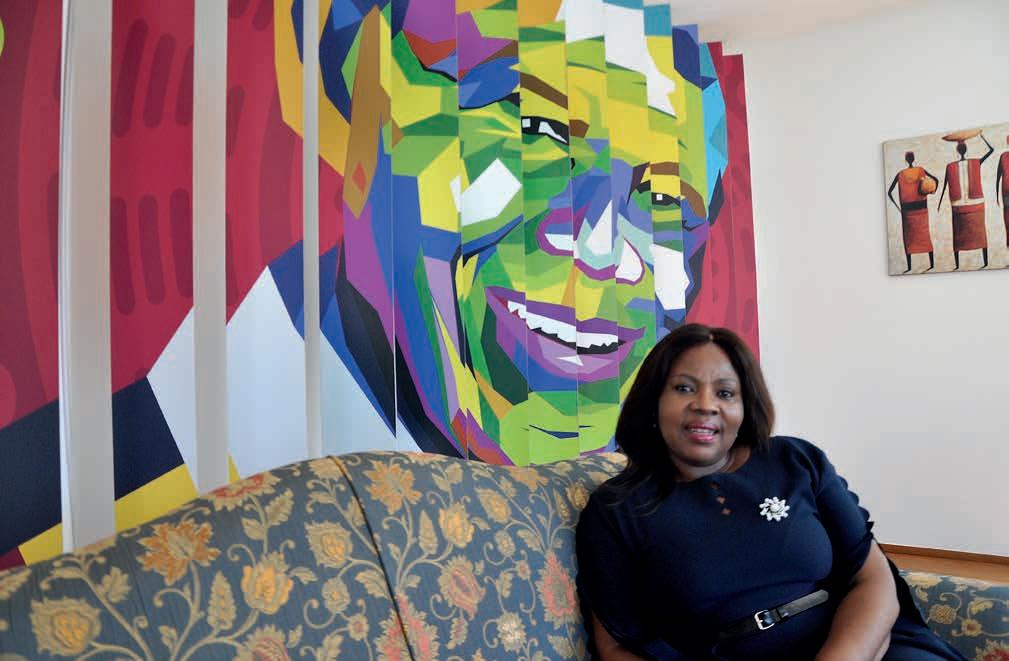
of Deputy Ministers take place annually in alternative capitals, namely Prague and Pretoria. The last bilateral political consultations were held in Pretoria on 5th March 2024, between Mr Alvin Botes, the Deputy Minister of the Department of International Relations and Cooperation of the Republic of South Africa, and Mr Jiří Kozák, the Deputy Minister of Foreign Affairs of the Czech Republic. These consultations afford the two countries a platform to engage on bilateral, regional, and multilateral issues.
The Czech Republic regards South Africa as an important role player on the African Continent, and as a gateway to Sub-Saharan Africa, given its world-class legal framework, sophisticated transport and logistics infrastructure, and first-world financial services and banking sector. These contribute to South Africa’s reputation as a leading country in terms of doing business.
The South Africa and the Czech
Republic economic relations are mutually beneficial, and have promising opportunities. The Czech Republic companies’ investment in South Africa spans six sectors: Business Services, Communications, Electronic Components, Hotels and Tourism, Software and IT Services, and Textiles. South Africa is ready to attract and retain Foreign Direct Investment, and has various initiatives in place to support the Czech Republic’s investors.
This interview is done on the occasion of your Republic’s national day. Let us conclude with your wishes on this special day.
This day, now known as Freedom Day, is commemorated every year to honour those unsung heroes and heroines who fought for our freedom and paved the way for an equal, representative, and non-racial nation. This year marks the 30th anniversary of South Africa’s first democratic elections. My wish for the South Africans is that they continue to stand tall as
a rainbow nation, woven together by resilience, diversity, and shared aspirations. Our democracy is a beacon of hope for the world, reminding us that transformation is possible even in the face of adversity.
This year 2024 is also an election year for the South Africans, and the 29th May 2024 has been declared as the date on which elections will take place. I encourage all South Africans to go and cast their vote and exercise their democratic right.
As we celebrate our freedom, we also extend our gratitude to the Czech Republic for welcoming us with open arms. We thank the Czechs for embracing us. May our friendship and partnership continue to flourish, transcending borders and enriching both our nations.
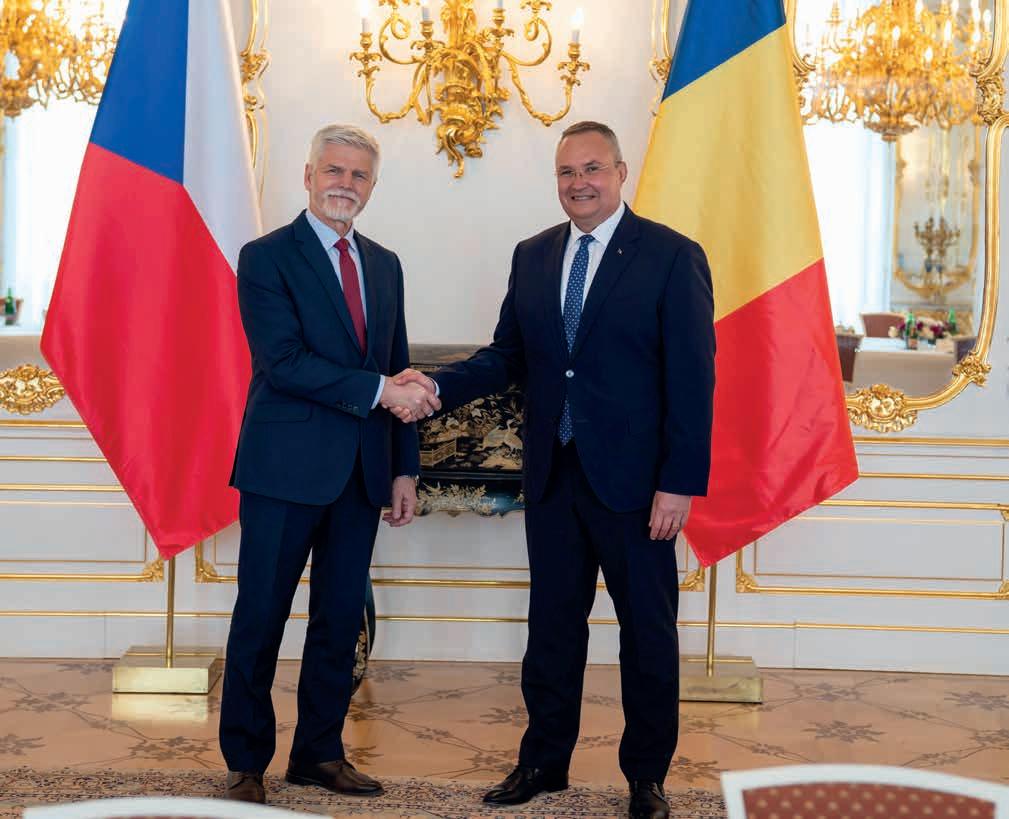
The visit took place shortly after the official visit of the President of the Czech Senate, Miloš Vystrčil, to Romania (in November 2023), signalling the new dynamics of the Romanian-Czech bilateral relations and the common desire to further enhance our partnership, based on the traditional relations, common history, shared values, and joint objectives in the current geopolitical context.
Besides the excellent and extensive talks with the President of the
Czech Senate, Miloš Vystrčil, the President of the Senate of Romania had a dense program of high-level meetings in Prague – with the President of the Czech Republic, Petr Pavel, the Czech Prime Minister, Petr Fiala, the Vice President of the Chamber of Deputies, Věra Kovářová, the Minister of Defence, Jana Černochová, and the Chairman of the Foreign Affairs Commission of the Senate, Pavel Fischer.
The meetings reconfirmed the ascending course of our bilateral
The official visit of the President of the Senate of Romania, Nicolae Ciucă, at the invitation of his Czech counterpart, Miloš Vystrčil, took place between 3rd-4th April 2024, and was an important landmark in the bilateral dialogue between Romania and Czechia.
relations, with a focus on the great potential of our cooperation in the fields of defence industry, nuclear energy, trade and investment, and tourism. Enhancing the cooperation of the two countries on NATO’s Eastern Flank and the need to increase support for Ukraine and the Republic of Moldova were also discussed in the official talks.
All interlocutors expressed support for Romania’s full accession to Schengen space as soon as possible,
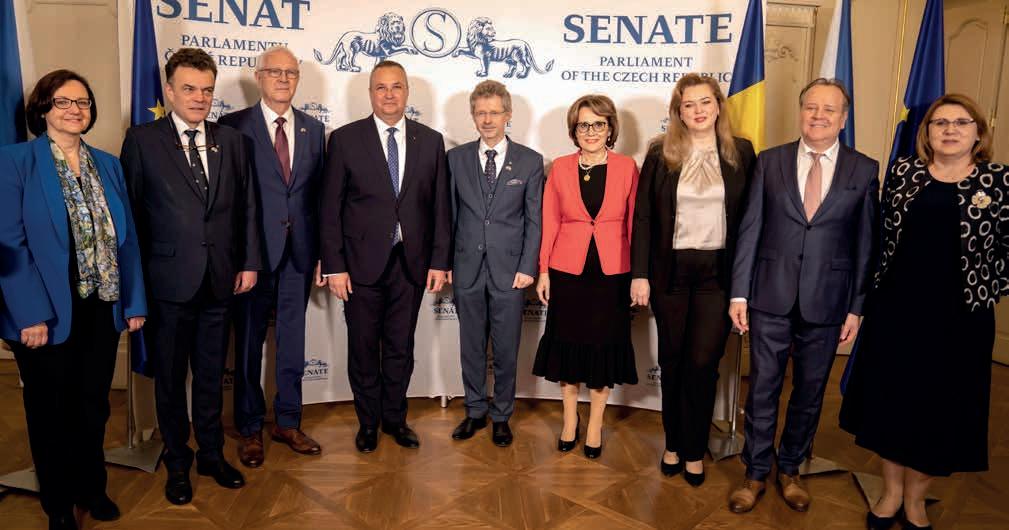
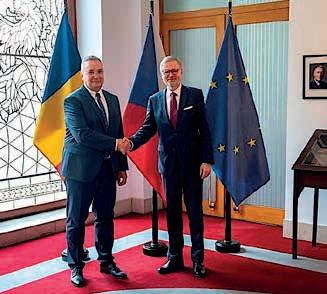
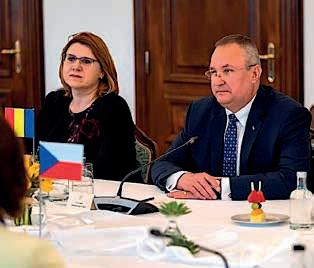
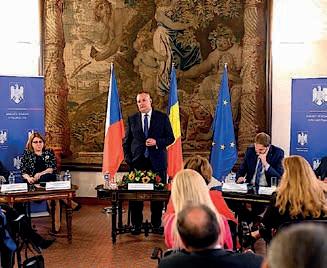
as well as for our country’s accession to OECD. The crucial role of Romania in support of Ukraine, and in ensuring the transit of Ukrainian grains, was welcomed and praised by all Czech officials.
Taking into account the long-standing bilateral cooperation, the similarity of views on current topics, and the shared objectives in the EU and NATO, it was agreed to further enhance the partnership between Romania and Czechia as pillars of stability in our region, and to explore the potential of our cooperation in the economic and sectoral fields, as well as the defence cooperation.
The Presidents of the Romanian and Czech Senates honoured the memory of the fallen in the World Wars at the Vítkov Memorial, and, together with the Minister of Defence Jana Černochová, visited the Military Museum.
The program also included a meeting with business representatives, hosted by the Embassy of Romania in Prague, with the title “Connect & Grow: Business opportunities in Romania”. The meeting revealed the business and investment opportunities of Romania, the advantages of its strategic location, as well as the increasing bilateral trade, with a record level of 6.7 billion Euros in 2023.
Afterwards, they symbolically planted a linden tree and unveiled a memorial plaque in honour of the Romanian national poet Mihai Eminescu in Náměstí Míru / Peace Square, in the proximity of the Rumunská street. This project was initiated by the Embassy of Romania in Prague, in cooperation with Prague 2 City Council and Iași County Council, as a symbol of Romanian-Czech friendship and ever-growing partnership.

You graduated from the Institute of Tourism Studies in Malta. Why did you choose a career in hospitality?
Actually, I never thought of working in the hotel industry. I’ve always been drawn to architecture. But in tourist countries like Malta, many students earn pocket money in the hospitality industry. I found myself working at the pool during summer
holidays, either serving tables or lifting umbrellas. While making some money, I realized that I enjoyed this much more and decided to change direction last minute, opting to study hospitality. Once I entered the industry, it felt like a natural progression to move forward with my career. I believe it was a good choice, as I enjoy every single day working at the hotel, interacting with team members and guests.
Ryan Gauci is a hospitality professional with an extensive background in the industry. Originally from Malta, he recently assumed the role of General Manager at Hilton Prague following a successful tenure in Croatia, where he served since May 2021. Prior to this, Gauci held the position of Hotel Manager at Hilton Prague for nearly three years, overseeing significant refurbishments and strategic repositioning efforts. Altogether, he has dedicated seventeen years of his career to Hilton, contributing to the success of twelve properties across eight countries. What does he have to say about his career experience and his new Prague assignment?
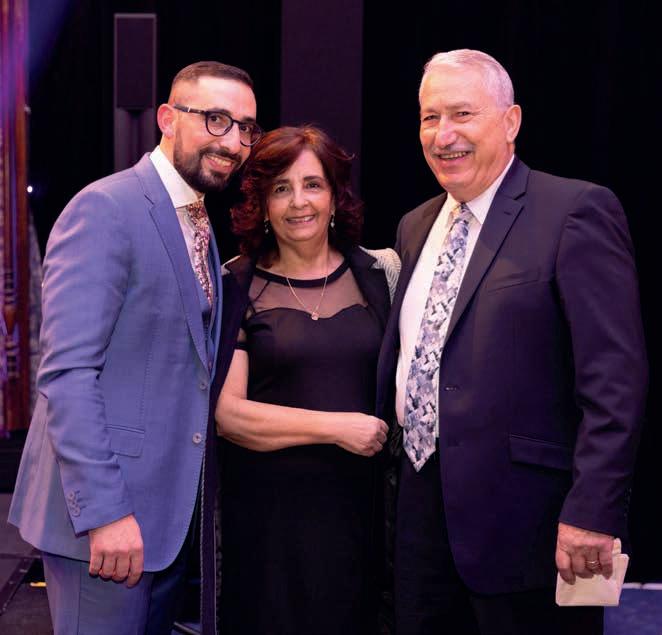
You have been in the Czech Republic before. What is your view of it?
Prague is an up-and-coming city with significant potential. Its growing gastronomic scene, still relatively affordable compared to other European cities, is complemented by ample greenery and parks. The city boasts excellent connectivity and an efficient public transportation system, making navigation seamless. What truly sets Prague apart is its unique vibe, appreciated by visitors whether they’re here for leisure or business.
What is your vision for Hilton Prague?
I would begin by outlining a vision for Prague as a destination. While it has great potential to attract visitors for both leisure and business, there are still challenges, particularly with flight connections. I am keen to collaborate with other stakeholders to improve direct flight connections, particularly with the US and Asia,
to bring more affluent guests to Prague.
At Hilton Prague, our focus this year is on enhancing our food and drink venues to create welcoming spaces where locals and visitors alike can enjoy unforgettable culinary experiences. With offerings such as Cloud 9 Sky Bar & Lounge, Café & Bistro, Hop House beer bar, Beer Garden Karlín, and Seasons restaurant, we are dedicated to establishing vibrant dining and socializing hubs.
Hilton Prague is the biggest hotel in Prague – together with Hilton Prague Old Town you offer over 1,000 rooms. How difficult is it to maintain high occupancy and satisfied guests?
It’s all about the team, and in Prague, we have a great team of dedicated and engaged professionals. It’s important that we all share the same vision and execute it together. When the team is happy, it positively reflects on our guests’ experiences. In the hospitality industry, our common goal
is to ensure guest satisfaction, surpassing their expectations. We also need to adopt different approaches for different types of business. Meeting and conference guests have different needs and priorities than leisure guests, be it time efficiency or specific food and beverage offerings.
How do you motivate and lead a team to achieve their goals?
Motivation comes from recognizing and valuing everyone’s efforts and contributions, regardless of how small they may seem. Every little contribution matters. My management style is best described as collaborative. Having worked in diverse environments, teams, and cultures, I’ve had the opportunity to learn and adapt the style that I believe yields the best results. It’s crucial to me that everyone understands our goals and feels a shared responsibility for achieving them. I aim to foster an environment where we’re all in the same boat, enjoying our work. Such an environment provides the opportunity for individuals to thrive and grow.
What is the hardest challenge for a successful team leader?
Being a leader means constantly being looked up to and analysed by others. Your mood and energy levels have a cascading effect on the entire team. Even on the less bright and shiny days, it’s crucial to maintain a positive energy because you’re in the spotlight, and you want to project a positive vibe to influence the team. Staying calm in difficult situations and maintaining a positive outlook is essential. I always strive to see the glass as half full rather than half empty.
How do you recharge?
I like outdoor activities and sports, mainly triathlon and swimming. Swimming for 30 minutes in the pool helps me clear my mind and
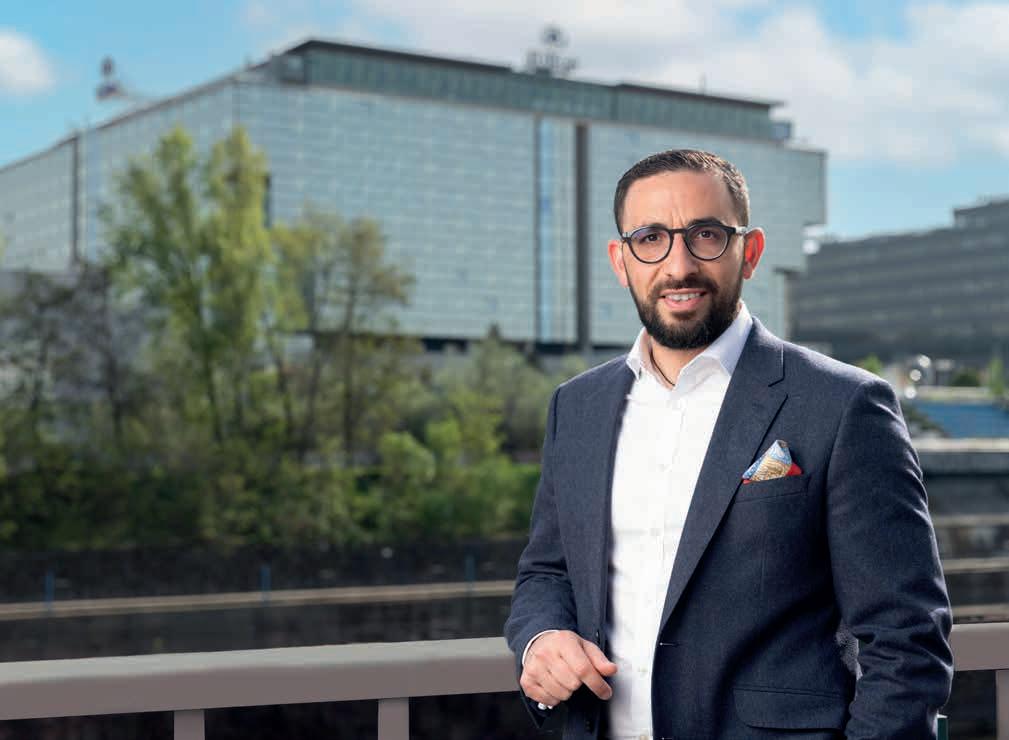
fully relax, allowing me to switch off completely. And I also enjoy cooking very much.
Hilton Prague is known for its charity events. Are you going to continue this tradition?
For many years, we’ve been proud supporters of the Tereza Maxová Foundation through various initiatives, with our annual Christmas charity concert being the highlight. Giving back to those in need is ingrained in our values, and we’re committed to continuing this support in the future. Currently, we’re exploring new formats for our charity event, considering that after almost 20 years, it may be time to change the angle and introduce something different.
Before coming to Prague now, you worked for Hilton in eight different countries. What do you consider to be your most
The opening of Hilton Rijeka in Croatia was a thrilling adventure and milestone for me as a firsttime General Manager. It was a culmination of hard work and anticipation, but witnessing the hotel up and running, with happy guests and team members, made the journey incredibly rewarding.
Having worked with so many people from different walks of life, have you ever dealt with any strange situations?
I recall a curious request from a guest who inquired about bringing their parrot to stay at the hotel. Given our balconies, I asked if the parrot would be in a cage, which was not the case. I then inquired if the guest had a leash for the parrot, which they also did not. Fortunately, the guest decided to leave their feathered friend at home.
Your predecessor spent 16 years in Prague. Are you planning to break this record?
If I can continuously reinvent myself, staying innovative and relevant for 16 years, I will certainly strive to do so. Adaptability and innovation are key to long-term success in any industry.
What is your piece of advice to the next generation of hoteliers?
My advice is simple: be engaged and run the show as if it was your own business. Travel the world, gain experiences, and develop your career. There are endless opportunities within the hotel industry, with Hilton being a prime example.
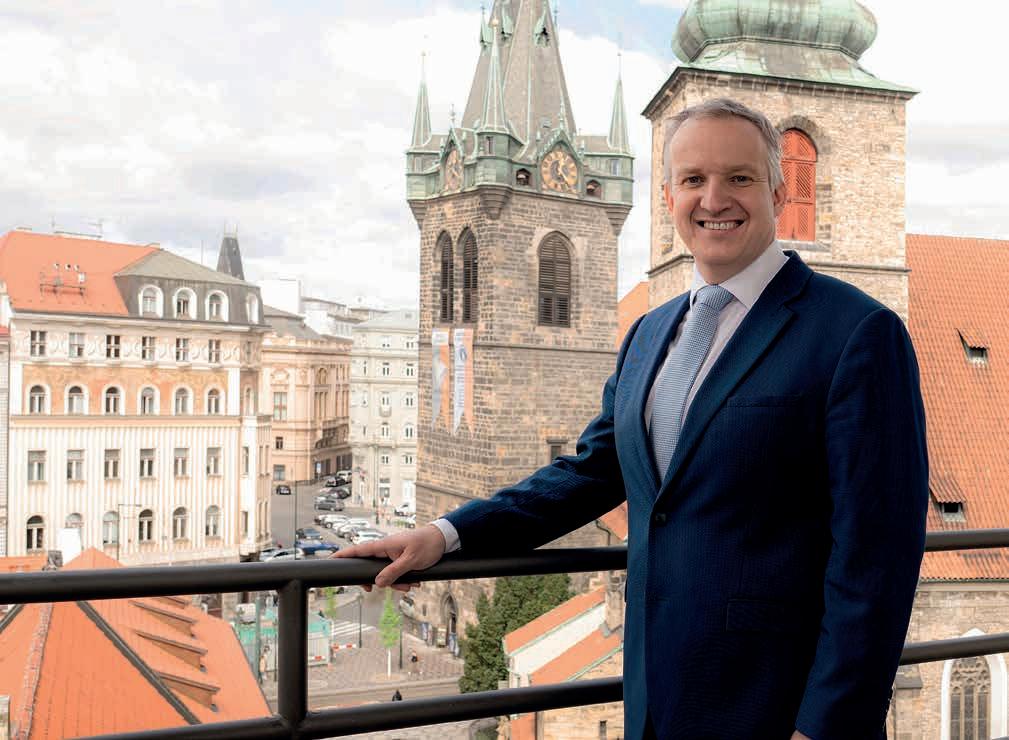
Jindřich Fryč became the Chief State Secretary for the Civil Service in November 2022. The first year of his work in the position was marked (among other things) by the preparation of the government’s amendment to the Civil Service Act. It was passed by the Czech government in April this year, and is now awaiting discussion in the Parliament. Will the amendment create better conditions for the functioning of the authorities, and make the civil service more attractive to the younger generation?
The Czech Republic (as well as all EU countries) faces low interest in working for state institutions, especially among the younger generation. We cannot wait for a miracle; we must create better conditions for the functioning of the authorities, and make the civil service more attractive in the labour market. This is our greatest challenge today. That is why the amendment to the Civil Service Act brings mainly a reduction in bureaucracy, and creates
conditions for more modern and efficient functioning of state authorities. We want the civil service to be a high-quality service to the public, and for service authorities to be modern employers, capable of attracting quality employees, as well as being able to respond flexibly to current trends on the labour market, the challenges of the 21st century, and crisis situations. We are creating space for effective management of authorities, but also for the professional and personal development of civil servants. The proposed changes
will allow authorities to function more openly and competently.
Let’s pause at recruitment to civil service. The possibility of exceptions to the education requirements sounds intriguing. How will this work?
We are coming up with a major conceptual change that may alter the applicant’s perception of the civil service. Although we are not completely abandoning the requirement for prior formal education, we are emphasizing that in the future, in selected positions, we will be more interested in what the applicant actually knows, what skills and knowledge he or she possesses in the particular field, and what competencies he or she has. We are reacting to the dynamic development in the labour market, where it is increasingly common that experts in certain fields (e.g. ICT, economics, data analysis, etc.) do not have
formal university education, but instead prove their expertise and quality during the selection process. It is in the interest of the civil service that these professionals should also be able to work in the civil service. I believe that this change is one of the tools to open up the civil service to them.
What about the graduates from prestigious foreign universities? Will they still have to go through the lengthy process of receiving a formal recognition of their education?
We facilitate the entry into the civil service of graduates with a university degree, higher vocational education, and secondary education with a school-leaving certificate, which they have obtained by studying at schools in the Member States of the European Union, in a country being a party to the Agreement on the European Economic Area
(Norway, Iceland, Liechtenstein), and in Switzerland and the United Kingdom. For the purpose of entry into the civil service the formal recognition of education will no longer be required, and the education will be considered equivalent to education obtained in the Czech Republic. Graduates of these foreign schools will thus be able to enter the civil service more easily. In addition, the government may determine other universities in which the education obtained through studies will be recognised without the need for the formal recognition.
Does the amendment bring any other changes in the area of recruitment?
We are further simplifying the overall recruitment process. We are following the trends in the private sector, for example by allowing to submit the application and all accompanying documents
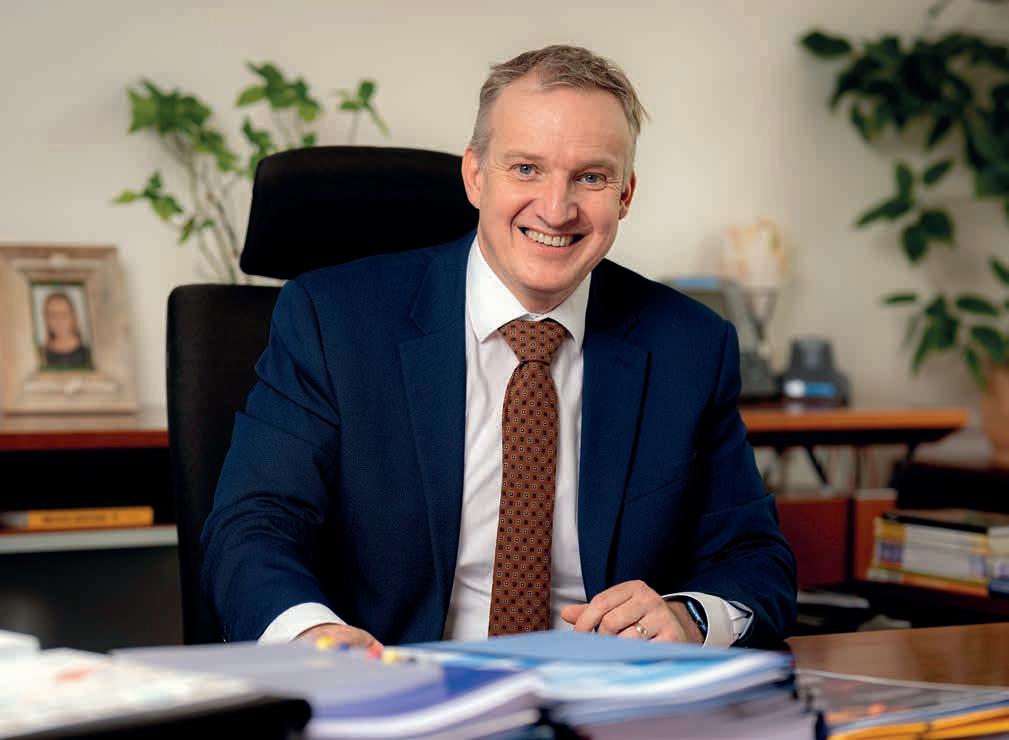
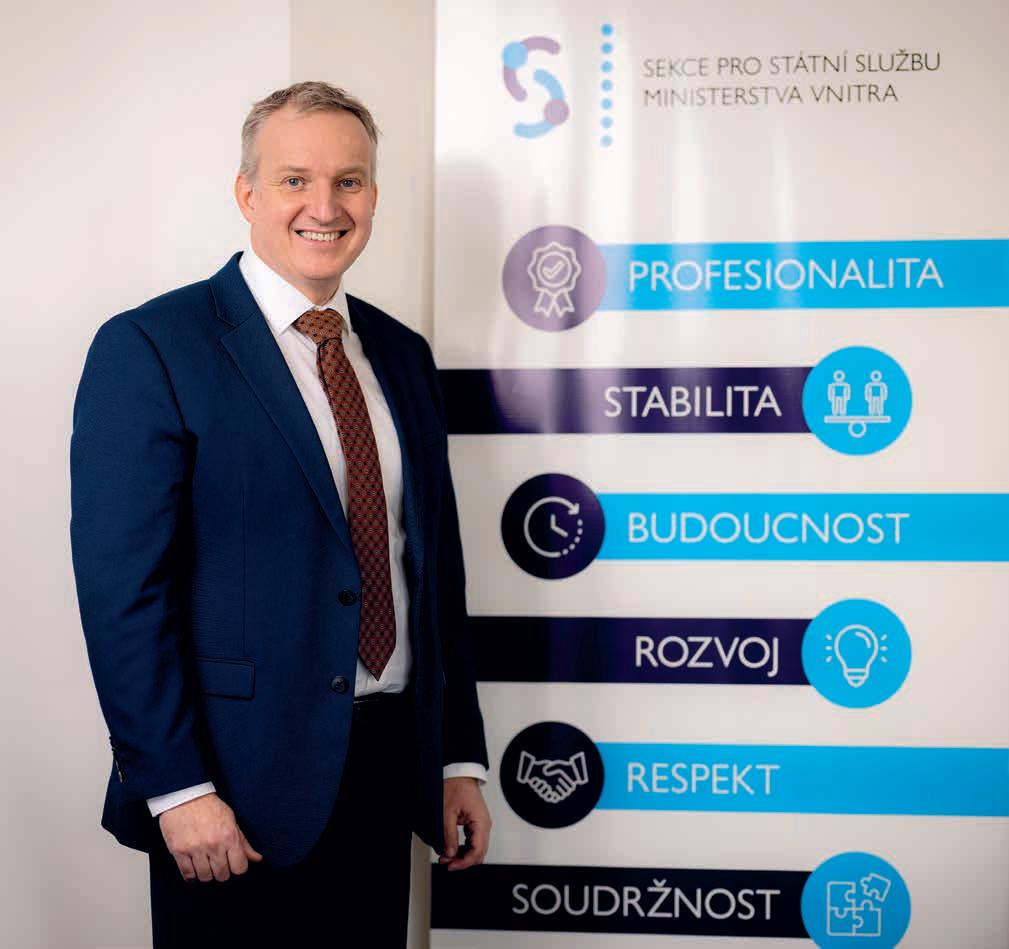
fully electronically. We will put more emphasis on communication with candidates during the selection process, and before the appointment of the selected candidate.
We will also be able to consider other successful candidates in the selection processes. Currently, the selection committee chooses the three most suitable candidates. One of them will be selected for appointment, while the other two must reapply for another selection procedure if they are interested in working in the civil service. With the amendment, we want to allow the authorities to also recruit the candidates who
were not selected, for a period of one year, to a similar position, without necessitating a further selection procedure. We will thus take advantage of the previously lost potential of very suitable candidates – who were not selected for a particular position because another candidate was preferred.
At the beginning of the interview, you mentioned more effective management. What is the amendment supposed to bring, in this respect?
In the area of management, the amendment will bring changes in the regulation of service discipline and performance appraisal.
Violations of service discipline will no longer be dealt with by the disciplinary committee in disciplinary proceedings, but by the state secretary in the ministry or the head of the service authority. They will issue a warning for minor breaches of service discipline, a decision on termination of service in the case of a serious breach, or a decision on immediate termination of service in the case of a particularly serious breach.
We want to move away from an over-formalised system of performance appraisal, and towards a tool for modern personnel management. We will reduce the
number of areas to be evaluated, and place primary emphasis on the evaluation of service performance.
The general obligation to carry out regular performance appraisals will be removed because of the unnecessary administrative burden. We will retain the first performance appraisal, and link it to the adaptation process. We will also retain the possibility to carry out the appraisal according to the needs of the authority, or at the request of the civil servant.
Performance appraisals are one tool. Another one is the development of human capital. Does the amendment bring anything new in this regard as well?
In this respect, the amendment introduces the basis for a career system for civil servants. It should also be mentioned that the civil service differs from the private sector, among other things, in terms of compulsory civil service examinations, whose legal regulation has been completely reformulated and will be now clearer and more precise. The amended Civil Service Act will also guarantee entitlement to preparation for the civil service examination, and to compulsory study texts.
We consider it crucial to support newly appointed civil servants in their first months in the office. They will undergo a compulsory adaptation process, which will, in principle, be mandatory both on the first appointment to the civil service and also in the event of a significant change of a position – typically when a civil servant moves to another service authority. The adaptation process will serve to facilitate the entry to civil service and settling in. We are also introducing the institution of a mentor, i.e. an experienced civil servant who will guide the new civil servant through the adaptation process.
Moreover, we are putting more emphasis on the training and further development of civil servants. So far, the various areas of training have not been defined in any detail in the legislation. We are, therefore, laying down basic parameters for the training, its division into particular areas, and its framework content, directly in the Civil Service Act.
Can you elaborate a bit on the idea of the career system for civil servants? How should we understand this term?
The career system opens the way for better motivation and recognition of a high-quality performance by civil servants who are not in managerial positions. Since high professional standards are placed on them, our aim is to enable them to ‘advance their career’ within the area of their expertise, taking into account their skills, knowledge, and performance. We hope to achieve an improvement in the performance of the authority towards the public, as well as an increased attractiveness of civil service to new and existing civil servants. The career system will also bring new formal designations for civil servants. Our aim is therefore to strengthen the career status of civil servants, and also to make greater use than before of HR elements such as talent management.
The thing often criticized in connection with the Civil Service Act is its high financial demands. Is this issue also targeted in the amendment?
The saving of public funds will be achieved by modifying or introducing certain operations, in particular by shortening the period of the non-active status of civil servants from 6 to 3 months, and by tightening the conditions related to severance pay upon termination of service (e.g. reduction of the amount of severance pay,
or extension of the duration of service for entitlement to severance pay). Savings will also be achieved in the activities of the HR departments by streamlining their processes – in many cases it will no longer be necessary to issue decisions, and instead more efficient ways of delivery will be introduced (such as possibly delivering those via e-mail, etc).
The Civil Service Section led by you will be transferred from the Ministry of the Interior to the Office of the Government. Will that help?
The position of the Civil Service Section will change to some extent with the relocation to the Office of the Government. Its role in the civil service system, which exceeds the scope of any particular ministry, will become more apparent. The aim is to remove a form of ‘resortism’, and thus to emphasise the coordinating role of the Civil Service Section in relation to other service authorities.
The civil service in the Czech Republic will soon ”celebrate” its 10th anniversary. This amendment to the Civil Service Act brings about a significant simplification and transformation of selected attributes of the civil service, which have proven over the years to be insufficiently efficient or administratively demanding in practice. But it is also an amendment modernising the civil service environment, and bringing it closer to the private sector. I see this as an essential prerequisite for increasing the attractiveness of civil service in the labour market, and attracting new civil servants, as well as motivating existing ones.
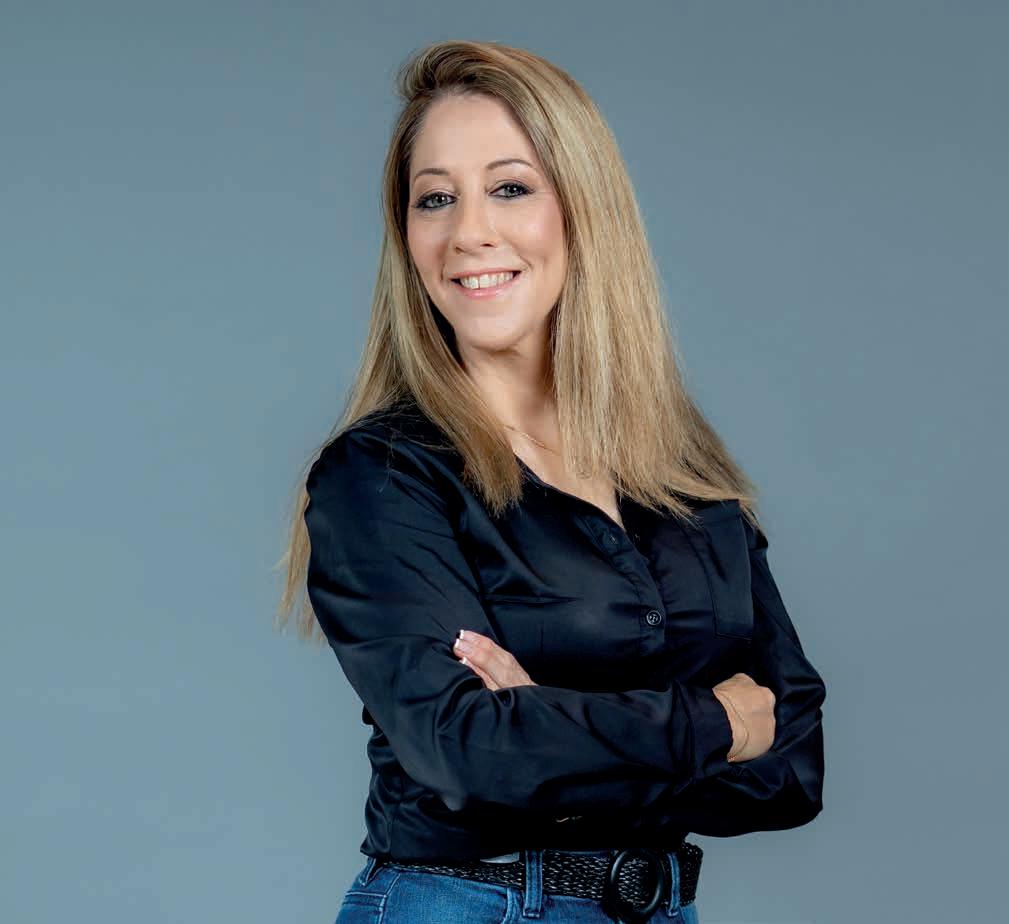
“Just living in Israel means constantly facing multiple challenges, which fosters a mindset of seeking innovative solutions,” acknowledges Avivit Yorkevich, a former Special Israeli Intelligence Forces member, and co-founder of a tech start-up Validit.ai.
“I worked as a fraud detection consultant, and understood how critical the need was for a solution that could validate human statements. I also realized that the commercial world needs a ‘softer’ approach than the one used in the intelligence services. This is how our company was born.”
Who is the woman who founded a tech start-up detecting our truthfulness?
My name is Avivit, and I am a 46-year-old mother of three who can be described as someone who has worn many hats in her career. From being a professional musician to serving as a senior intelligence officer; now I am on my mission in the
tech world – to ensure truthfulness in the digital realm.
I was brought up to be a musician. I sang and performed opera professionally worldwide, mainly in Europe and Scandinavia, and my future was set. But as I got older, I developed a growing passion for intelligence and the unknown. So, I joined the Special Israeli Intelligence Forces, got into the
Deception Detection unit, and, soon enough, I was the first woman to become a senior officer, paving the way for other women in that field.
After twenty years of service in the organization, I decided to retire and find the next hill to conquer.
How did your career in intelligence inspire your current business activities?
Well, during my service in the Israeli Intelligence Organization, one of the major challenges I faced was verifying the tips provided by our sources who were not accessible or present in front of us. In critical situations, such as life-threatening missions, this information was vital, yet reaching the person physically was often impossible. That’s when I started thinking about this problem as my main challenge to solve.
After my retirement, I worked as a fraud detection consultant, and understood how critical the need was for a solution that could validate human statements. I also realized that the commercial world needs a ‘softer’ approach than the one used in the intelligence services. So, trying to find that solution, Yossi, my former service partner, and I set out on a mission to discover a reliable technology that could detect human fraud remotely, and yet none of what we found was sufficient.
That is how Validit.ai, our company, was born. After gathering the best AI and algorithmics team in Israel, building our product, and completing hundreds of thousands of test cases in the commercial world (insurance, HR, and finance), we can now actually conduct any validation – remotely, using just a smartphone camera. Basically, we can tell if a person is truthful in their statement, and by doing that
help mitigate risks and prevent all types of online fraud that affect us all more and more these days.
Can you explain how it works?
Yes. It may be used in any online application, at the end or middle of it. The applicant gets the option to validate the information he is giving through our tool. A camera window pops up with a question like “Is the information provided by this person accurate?”. The applicant gives his answer, his smartphone camera gathers the bio-signals from his facial area, and our AI can determine if the statement he has given is valid.
Will you give us some concrete examples of your tool’s worth?
Sure! Imagine a loan request or an insurance claim you filed, only to be rejected after a long process because something “seemed off”. Now, with Validit, only two minutes
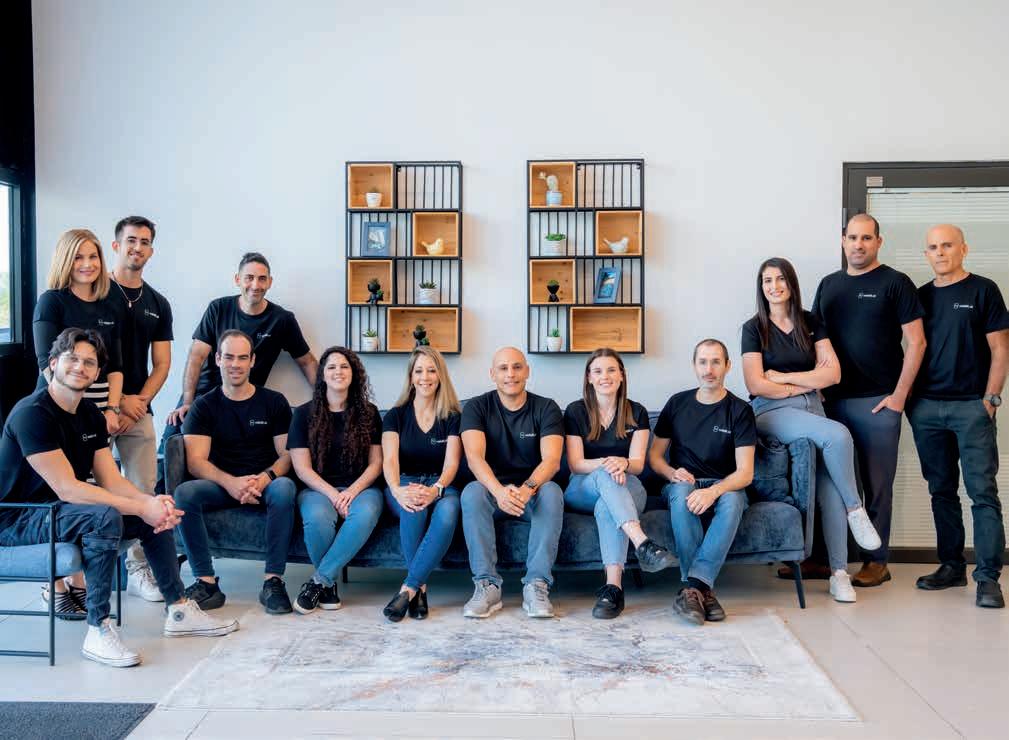
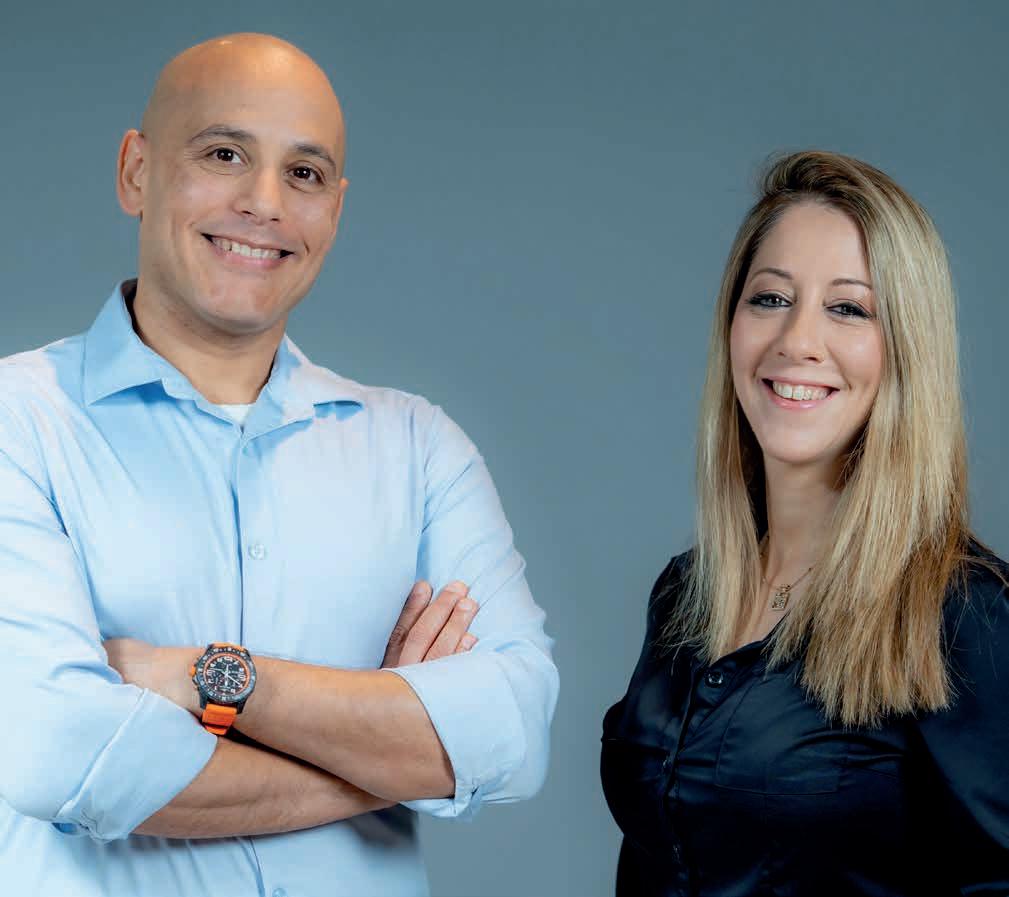
of using our validator could save you from all that trouble. It also builds trust with your bank or insurer, possibly even lowering your premiums :)
We were happy to realize that using our technology has also created a more trustworthy client-business process. That, like in any relationship, only betters everyone.
Are there any particular challenges you are facing? Perhaps, given the current circumstances in Israel?
If we put aside the ‘traditional’ challenges of an entrepreneur, just living in Israel means constantly facing multiple challenges,
which fosters a mindset of seeking innovative solutions. I take pride in our local tech community’s resilience, persisting despite adversities. Israeli technology, like advanced irrigation and the ‘Iron Dome’ defence system, has made a significant global impact, saving millions of lives daily. Interestingly, some members of the team behind the ‘Iron Dome’ are also part of our tech team at Validit.ai.
Finally, what advice would you offer to aspiring entrepreneurs, particularly women?
For the aspiring entrepreneurs I’ll recommend surrounding themselves with positivity and the best team they can gather.
But, speaking as a woman who spent many years in the field of intelligence – a typically masculine domain – I have this to say: women have a fortune to contribute, not only as women but as human beings. They should never let their fears overtake them. Whoever has an entrepreneurial spirit, and who thinks she can make the world a better place, should fight for her dream.
Be determined and courageous, don’t let obstacles stand in your way. The world needs that added value you bring.
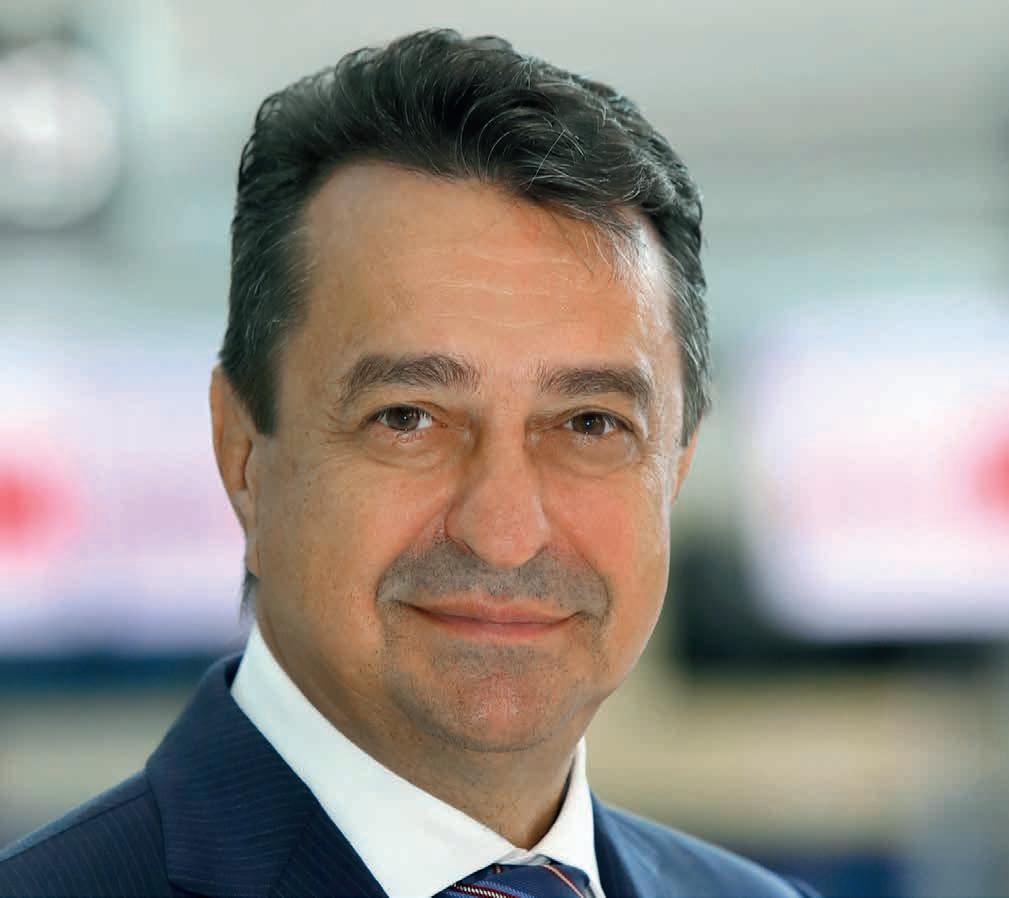
Tell us about yourself. You started your career in aviation in 1986 at Czech Airlines. What made you choose this sector?
Imagine me as a little boy, who, many years ago, used to ride a bicycle with his friends to the threshold of the Ruzyně Airport runway. My parents and I lived in Prague 6, so the airport was just around the corner. Together with my friends, I’d lie down on the
grass and watch the planes take off and land. It felt so amazing. I started dreaming of becoming a pilot. That didn’t work out for me because of my colour blindness, but I wanted to stay close to aircrafts no matter what. After graduating from university, I got a job at Czech Airlines, where I spent twenty unforgettable years. In 2006, I moved to Prague Airport, the company which I managed between the years
“We were pleased to be ranked among the top 5 airports in Europe last year by Google users,” says Jiří Pos, Chairman of the Prague Airport Board of Directors. “We are currently the fastest growing airport in our category, with almost 70 carriers offering direct summer flights from Prague to 170 destinations. As flying continues to be a part of the modern way of life, we expect this summer to be even stronger than last year.”
2011 and 2014 and which I have the honour of managing for the second time since 2021, working with my colleagues from the Board of Directors.
With this life-long valuable experience, can you give a piece of advice to the next generation in aviation?
I really don’t wish to be in the role of a mature man mentoring young people. In my opinion, you should follow your dream, whether it is related to aviation or any other goal in life. We have had a Talent Pool program in our company for many years – it is a program for young people who want to develop their potential. I like learning the details of the projects which were created in this way, and the enthusiasm and energy of the participants in this program make me happy. Intergenerational sharing is important, so sometimes, I, on the other hand, learn from the younger people.
As an expert in the field of civil aviation and tourism, how do you see its future worldwide?
Currently, it is still difficult to predict the future. We have been through a global pandemic and an energy crisis, the conflict in Ukraine continues, and the Middle East has, once again, become a hotbed. We can say with certainty that while, in terms of the number of passengers handled, most airports have already returned to their pre-COVID-19 levels, it’s been taking Prague Airport a little longer as we had a large share of passengers on routes between the Czech Republic, Russia, and Ukraine. However, we are currently the fastest growing airport in our category. It turns out that even the most difficult period in the history of civil aviation, experienced during the COVID-19 pandemic, has now been replaced with growth and
the breaking of past records, which seems only natural. Going on holiday to exotic destinations and visiting famous places or friends will continue to be a part of the modern way of life, which is good news for the entire aviation segment. Internationally renowned institutions such as IATA and ACI Europe currently predict a long-term 4% growth in the number of handled passengers.
Numbers are always interesting. Can you give us a few regarding Prague Airport?
We originally estimated we would handle 15.5 million passengers this year, but are now definitely expecting that figure to exceed 16 million. As part of the summer flight schedule, almost 70 carriers offer direct flights from Prague to 170 destinations, including new additions, namely Beijing, Cairo, Florence, Verona, Astana, Tallinn, and Chisinau, as well as popular holiday destinations such as Brindisi, Izmir, La Palma, and Ponta Delgada.
How does Prague Airport compare to other European airports?
We were pleased to be ranked among the top 5 airports in Europe last year by Google users. It proved that passengers like Prague Airport, and that it offers quality services of a high standard. This achievement was also affirmed by the ASQ international benchmark by ACI Europe (Airports Council International). Based on this, we compare ourselves to European airports of a similar size. Last year we received a rating of 4.18 on a five-point scale, and ranked in second place behind Helsinki.
What future developments are you planning?
One of the pillars of our key strategy, titled Prague Airport – Ready for
the Future, is the development of the airport capacity – primarily the expansion of the operating areas of Terminal 2, the construction of a central security screening point in Terminal 1, an increase in parking capacity, and more efficient organisation of traffic in the airport area. We estimate the first phase implementation costs at 32 billion crowns. We are currently at the stage of architectural proposals and design. But, as they say, ‘near is my shirt, but nearer is my skin’, so I would like to specifically mention this year’s achievements. Since March, passengers have been able to use a modern large-capacity trolleybus for their journey to and from the airport. We have been expanding the self-check-in options, and upgrading the range of airport shops and restaurants. In the summer, we are planning to open a duty-free walk-through zone in Terminal 2.
The high season is at the gate. What awaits us at Prague Airport when we come to board our holiday planes?
We expect this summer to be even stronger than last year. We plan to handle 3.6 million passengers in July and August, which is 400,000 more than in 2023. This increase will be possible not only thanks to new routes, but also thanks to increased capacity and frequencies to a whole range of destinations.
Passengers are advised to arrive at the airport no later than two hours before the scheduled departure time, and head straight to the check-in counter or use the self-check-in kiosks. They should then proceed directly to security or passport control, where they can save time by using self-service border checks. At the same time, everyone should pay attention to the validity of their documents, and take into account that it is not yet possible
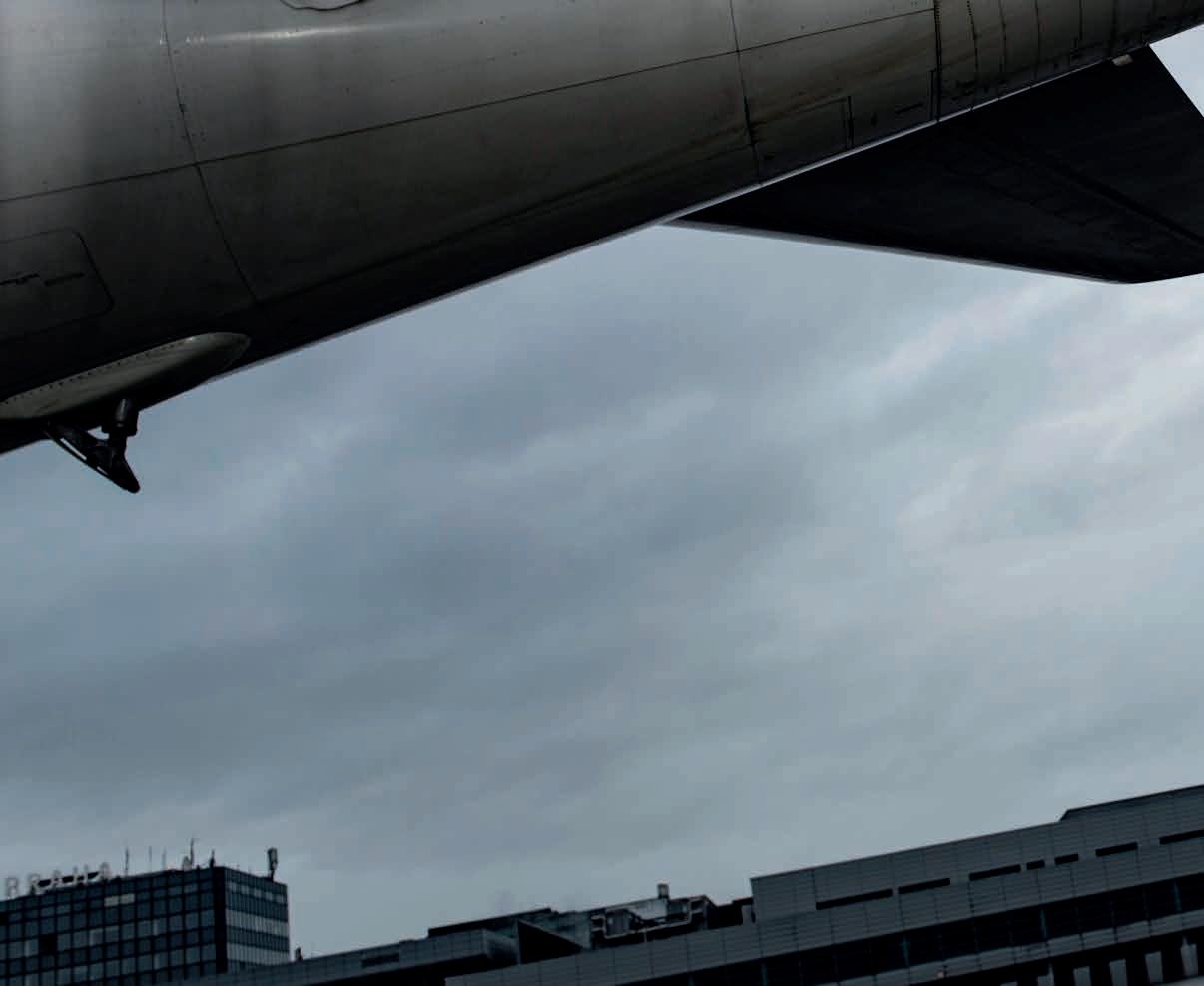
to use electronic ID cards for trips abroad. In addition, passengers are advised to check the boarding time on their boarding pass and arrive at the boarding gate on time. The time for boarding the aircraft differs between individual airlines, with some airlines ending boarding as early as 30 minutes before departure.
Some passengers may be worried about security due to the troubled situation in the world. Is Prague Airport ready for that?
I believe that travellers have nothing to fear in Prague. Prague has long been rated as one of the safest destinations in Europe, and
we also do our best to ensure passengers enjoy their trips without negative experiences.
How does Prague Airport ensure its continued positive relationship with the surrounding community?
The desire to be a good neighbour is in Prague Airport’s DNA. Our relations are based on longterm and regular communication with the management of municipalities and city districts in the vicinity of the airport, as well as with the residents of these domiciles. We organise, for example, Neighbourhood Afternoons, and we run a Good Neighbour grant program to support events and
activities that improve life in the neighbourhood, etc. At the same time, we are developing the Airport City concept, thanks to which, in the future, the airport will offer a number of services to its surroundings that are outside of our core business. These are, for example, educational, health, sports, and cultural facilities within the airport premises.
Generally said, a successful manager always has a good team behind them. Is that correct about you?
That’s exactly right. They say that a good manager leads people by being above them, while a great manager leads his team by also
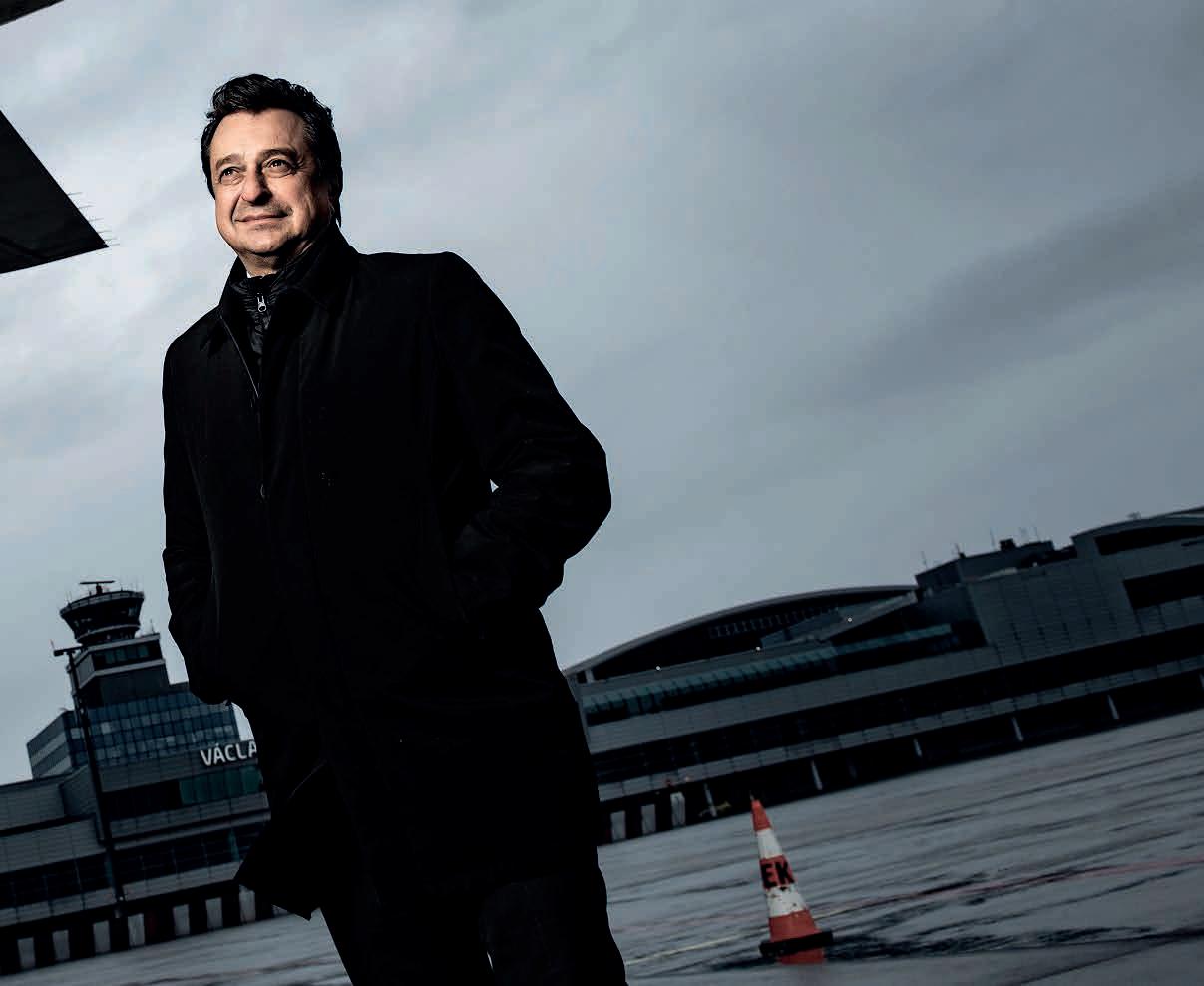
being one of its members. This is my way. The most difficult thing is probably to balance the working conditions so that they are not too loose, but at the same time not too restricting. I am very much inspired by the samurai culture – the main virtues of the samurai were courage, honour, justice, and loyalty. We have been trying to project these virtues onto our company culture for a long time.
What do you see as the most difficult part of your role?
Harmonising all relationships and goals within and outside our company, and attempting to remove unnecessary obstacles
toward achieving maximum efficiency.
Surely, you have experienced many interesting situations at work. Can you share one of the most weird ones?
In 2010, holding a position in Prague Airport management, I was in charge of the crisis team established to deal with the fourday air traffic grounding throughout Europe after the eruption of a volcano in Iceland. It was all the more bizarre because the weather was gloriously sunny in those days, and no one understood why flying should be disrupted.
Let’s conclude with a more
personal question. How do you spend your free time?
The number one thing is dedicating time to my family. My son plays hockey and football, and enjoys other sports. In that respect, I’m a bit of a taxi driver, an encouraging father, and the biggest fan. With my wife, who divides her working time between the PlanetZen massage studio, which she co-owns, and shifts as a cabin manager at Czech Airlines, we like to travel, play golf, ski, and simply spend our free time actively.
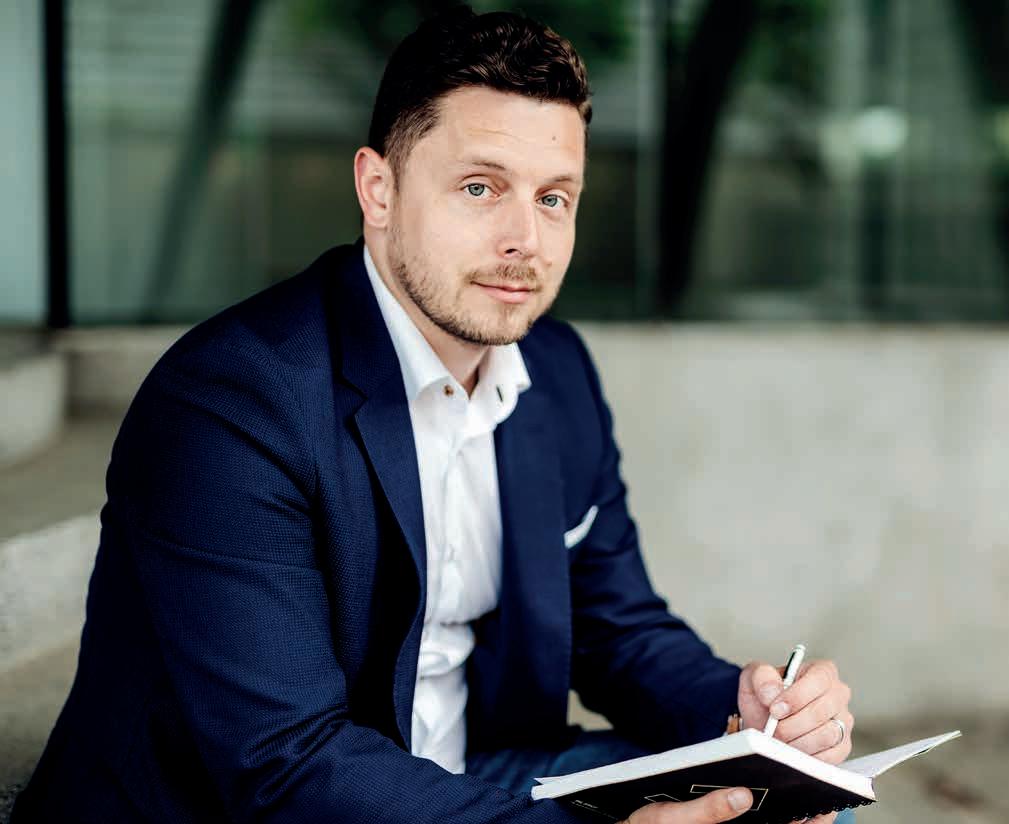
Would you like to work on a mission to the Moon? Or on an Earth observation satellite? Or maybe dozens of other projects around the world? If you are nodding your head yes, chances are you have already heard about TRL Space, a company which its CEO, Petr Kapoun, founded in Brno, with the goal of disrupting the traditional space industry and delivering complete space missions made in the Czech Republic. And because we also control space (on the pages of our magazine), we are glad to introduce a short interview with Petr here.
You present yourself as an “Ambassador for Women in Space”. How do you become one of those?
I believe that we need more women in space, and gender equality in the tech industries is a topic close to my heart in general. It is very sad to see how every technological conference, exhibition, common event, or even business meeting is still a man’s game. That is why I have decided to
accept the role of Ambassador for Women in Space, and I try to promote this topic as much as I can. The best way, for sure, is to lead by example, and I am happy that, since 2018, I have been able to be the host of an event called Space for Women, which is a part of the yearly Czech Space Week. This is an event where we gather successful women who made it through the “man’s world” and are open to sharing their stories, inspiring young girls.
TRL Space is a premier mission integration company, adept at serving a wide array of clients from both space and non-space sectors. Our approach is centred around providing customised satellite-based solutions tailored to the unique challenges and objectives of our customers. Whether it’s for Earth Observation, Telecommunication, or deep space exploration missions, our mission is to deliver unparalleled, bespoke solutions that align with our customers’ strategic goals.
We built upon expertise gained
during the years since the Czech Republic joined the European Space Agency (ESA), back in 2008. Our team has deep experience in working on many large space projects and missions in the space industry (VEGA and PLATO structures, Sentinel, Galileo, BepiColombo, Juice and Solar Orbiter, and ISS experiments). Since 2022, we have been building customised satellites for hyperspectral or high-resolution Earth observation for agriculture, disaster management, climate change, and security.
At the moment, we are working on two Moon orbiters and several
small Earth observation satellites for commercial customers. We are launching our own nanosatellite to demonstrate several payloads and subsystems. Our missions are based on a deep understanding of our customers’ problems and identifying the right solutions, including the right hardware and software tools. In parallel, we are developing unique products such as a Microgravity Lab or LiDARs for Space Traffic Management and proximity operations.
“By 2030, we will have our products and services on every continent”, says your company’s vision statement, among other
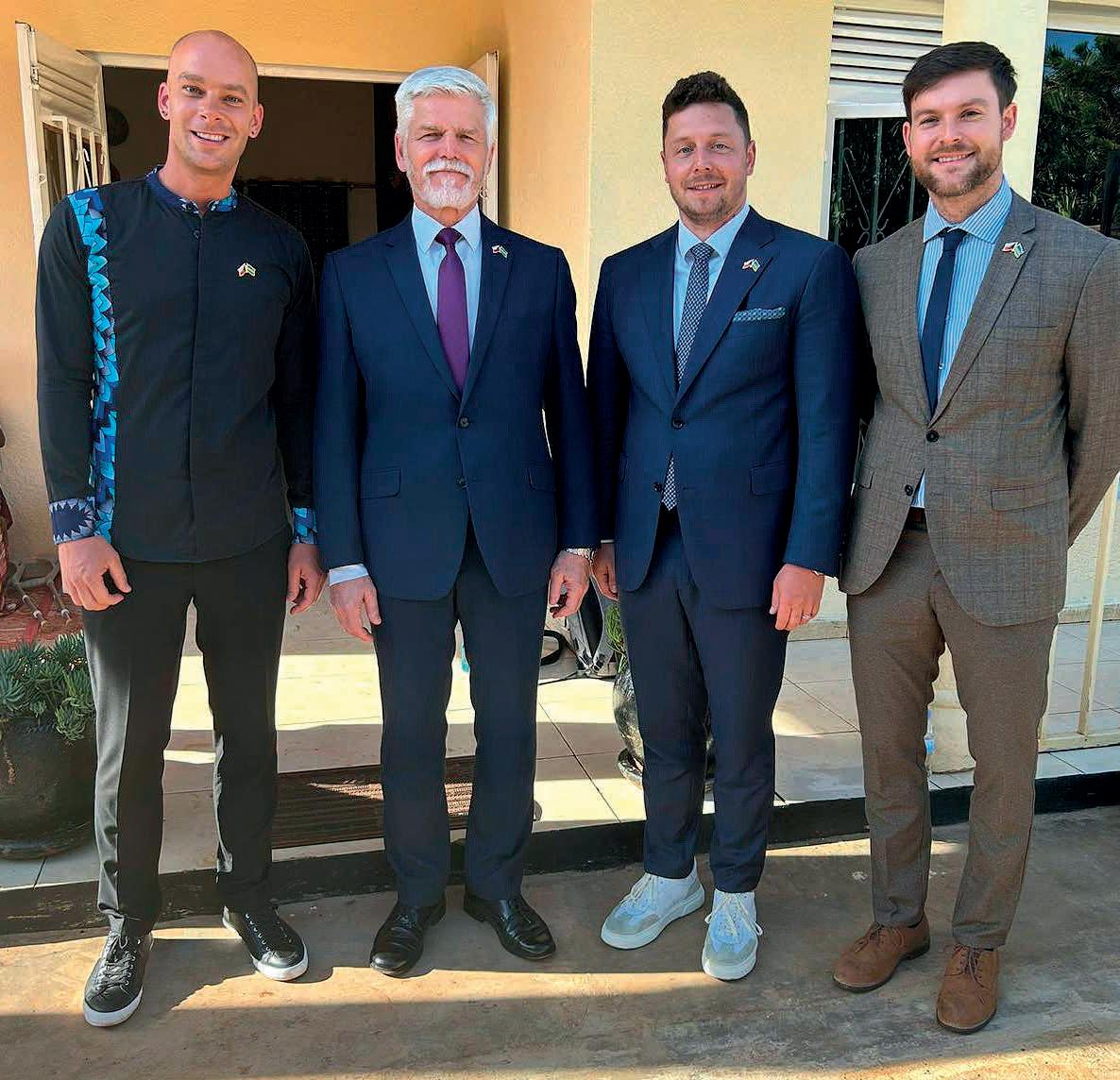
things. Is that why you are active in Rwanda?
In TRL Space Rwanda we invest in strengthening local capabilities for the development of satellite technology. We are committed to bringing expertise, development, and production capabilities to Rwanda in cooperation with its government, the Rwanda Space Agency, as well as universities and research organisations. We plan to invest over 2 million USD in this innovative collaboration and dedication to fostering a sustainable space ecosystem in Africa.
The first phase of the satellite mission, which will be exclusively dedicated to supporting Rwandan agriculture, has already begun. This pioneering endeavour is just the beginning, as our goal is to create a complete constellation of satellites that will ensure regular and sufficient imaging of the entire African continent. While the first satellite will be built by engineers from Europe and Africa working together, future satellites will primarily be developed by TRL Space engineers based in Rwanda.
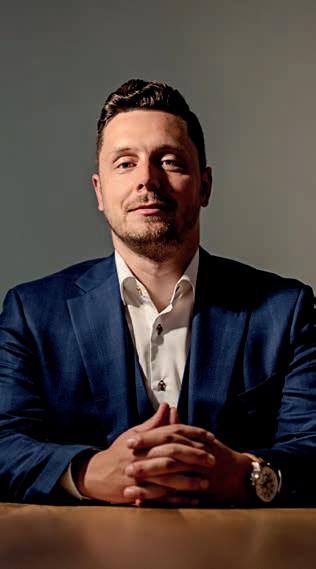
My intention is not just to deliver these technologies to Rwanda. I want to bring added value to the region. Our goal is to introduce new space technologies that increase the economic and living standards of the entire region. I want to make Rwanda a small satellite and constellation centre for Africa.
Is achieving the proper education important in your field?
The education and attraction of talents is everything. It is worth the time and investment. If we want the industry to grow, and if we want to make companies sustainable, we need to nurture amazing young brains, and make sure that there are plenty of enthusiastic engineers looking for a job in the near future. And that is why, without any hesitation, I dedicate a big portion of my time, energy, and effort to this purpose.
Besides leading your company, you hold several more positions in different organisations. Do you have any free time left?
Space is hard. Especially when you are trying to introduce new technologies in Europe, prove that countries like the Czech Republic can lead a mission to the Moon, and are attempting to disrupt the traditional space industry, all while you are also introducing new technologies in Africa. It would be silly to say that my family, friends, and free time do not suffer from what I do. They do. But I believe in what we do, in our vision, in our purpose, and I do care about the environment around us, and about our region, where I live and work. I hope it is a sacrifice worth making.
has been working in the space sector since 2014, managing over 12 space missions. He is the CEO at TRL Space, a Czech private company founded with the sole purpose of bringing together the best experts, engineers, and scientists in the Czech Republic in order to be able to deliver complete space missions and provide products and services worldwide.
He is the Chairman of the Brno Space Cluster and Deputy Chairman at the Brno Regional Chamber of Commerce.
Petr believes in the power of education and is involved in supporting educational activities for elementary and high schools, while having also participated in creating the first space master program at Brno University of Technology – Space Applications.
Biophilia isn’t just about access to greenery – it is really about being close to nature in all its forms. I believe that the office is alive, and can’t be fully replaced by the ‘work from home’ concept – however, we are just using the space in a slightly different way these days. Outside space is key to this. You can see the drive towards more biophilic design and wellbeing for occupants ever more often now, not only on residential properties but in office design too.
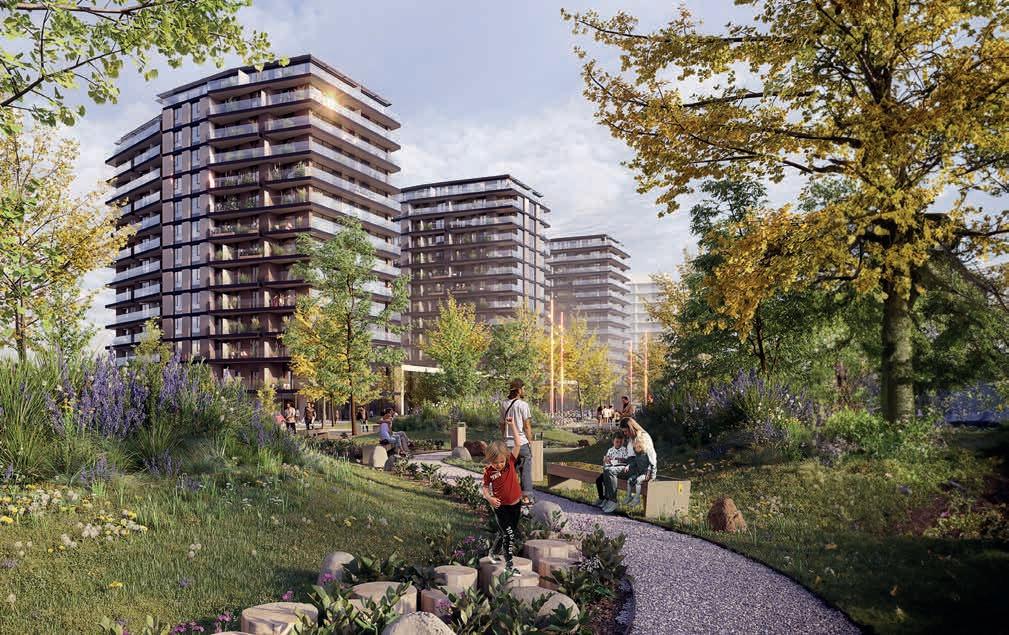
Wellbeing becomes the norm
2024 marks our 12-year anniversary as Bogle Architects, and, since the pandemic, there has been a lot of debate about the future of ‘the office’ with the luxury of ‘work from home’ pervading in the workplace.
My personal view is that ‘work from home’ is career-limiting – for example, if you work two days a week over a 40-year career then that is 16 years without proper career interaction. I believe that the office is alive – however, we are just using the space in a slightly different way these days. Outside space is key to this, and while it is the norm on residential properties, it is also becoming more prevalent in office design –all part of the drive towards more biophilic design, as well as wellbeing for occupants.
This can be seen in our recently completed office buildings at Hagibor, with Crestyl, the first phase of a 100,000sqm office campus. The setting is described as an urban park, which creates an oasis for the overall occupants while the upper floors have continuous balconies for access to outside space.
Similarly, in Belgrade, we have just completed designs for another large-scale, mixed-use regeneration masterplan. Project Duga, just east of the old town, boasts a hotel, residential, retail, and offices adjacent to a new public park, which again highlights the desire to be close to outside space.
Biophilia isn’t just about access to greenery – it is really about being
close to nature in all its forms. In Bratislava, we recently received the planning permit for a residential project on the north bank of the River Danube, with the developer Cresco. The design is predicated on every apartment having a view of the river; maximizing the wellbeing for the residents and creating pockets of greenery between the blocks.
In Croatia, we have just begun groundwork on a private spa, which, while primarily an indoor space, is secluded in greenery on three sides. Its main view looks out towards the Adriatic Sea, once more expounding the health benefits of both outdoor space and the quality of views.
Back in the Czech Republic, we have completed a prototyping facility (Brain 4 Industry) for the
Physics Institute next to our ELI Beamlines laser research project in Dolní Břežany, and also recently had the founding stone ceremony, attended by the Prime Minister, for
our Mephared II project in Hradec Králové. This building for Charles University is the new Medicine and Pharmaceutical Faculty and is a staggering 65,000sqm in size,
with atria arranged to have quality daylight penetrate each of the laboratories and write-up spaces. Thankfully for us all, I don’t think scientists work from home.
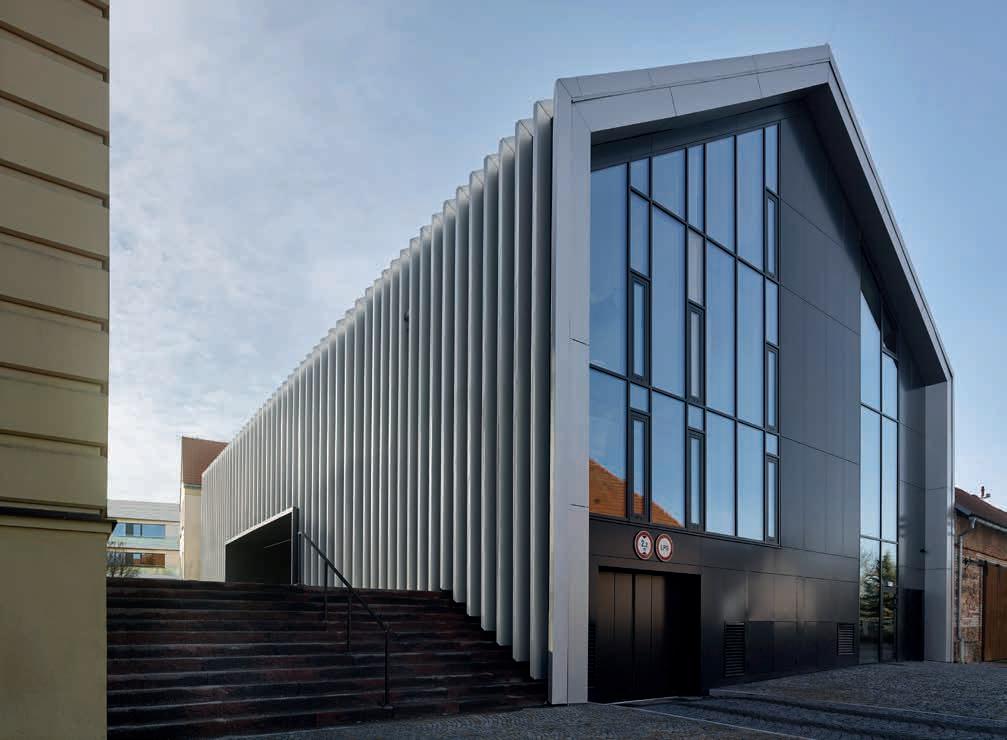
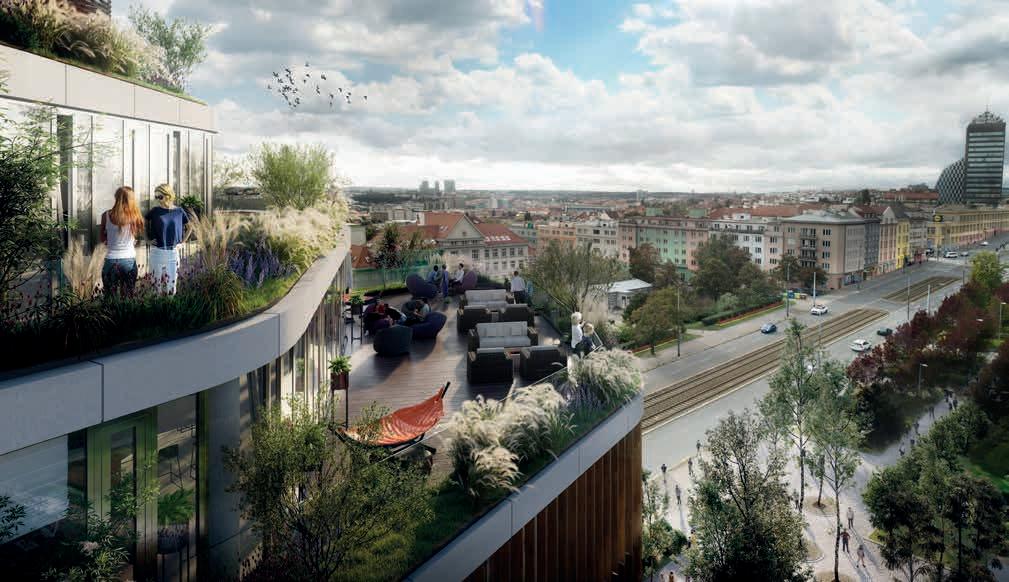
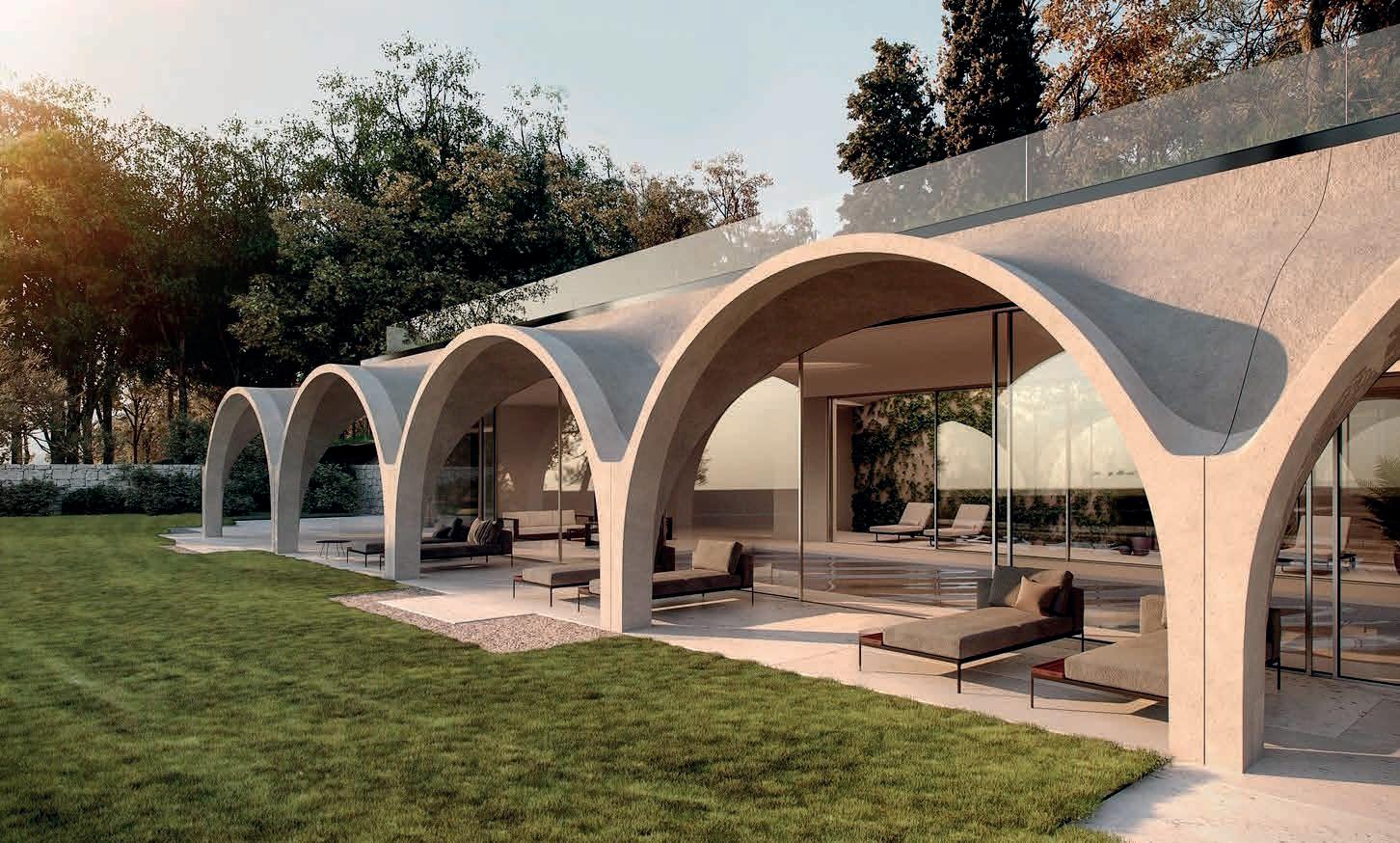
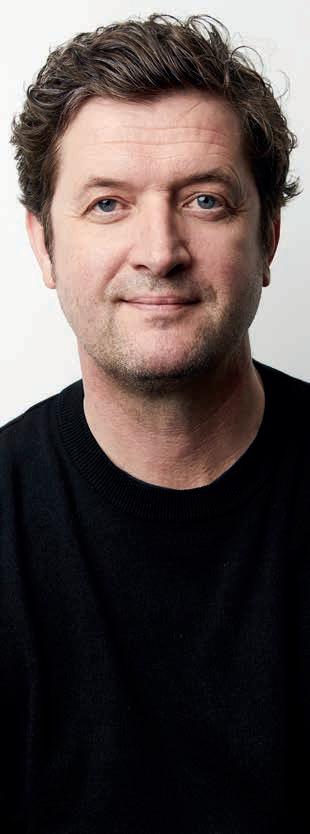
is an acclaimed architect working across several locations, sectors, and typologies, and is recognised internationally for his original thought, creativity, and pragmatism.
After a successful career at Foster and Partners, Ian founded Bogle Architects in 2012, and the award-winning studio is now active across a number of sectors from their London and Prague studios, covering over 30 countries in Asia, Africa, Europe, the Middle East, and South America.
An example of the practice’s work includes the facility that houses the most powerful lasers in the world (ELI Beamlines in Prague), the largest kindergarten in the world (The Early Learning Village) in Singapore for over 2,100 early years aged children, and the most significant regeneration project in Porto, Portugal, a 70,000sqm mixed-use masterplan.
Ian believes in education through encouragement and opportunity, and is frequently invited to lecture on Architecture and Design across the international conference circuit.
Beyond the studio, he is a Trustee of the Jubilee Gardens Trust on London’s South Bank, Chair of Governors at More House School in Knightsbridge, and a visiting professional examiner at London South Bank University.
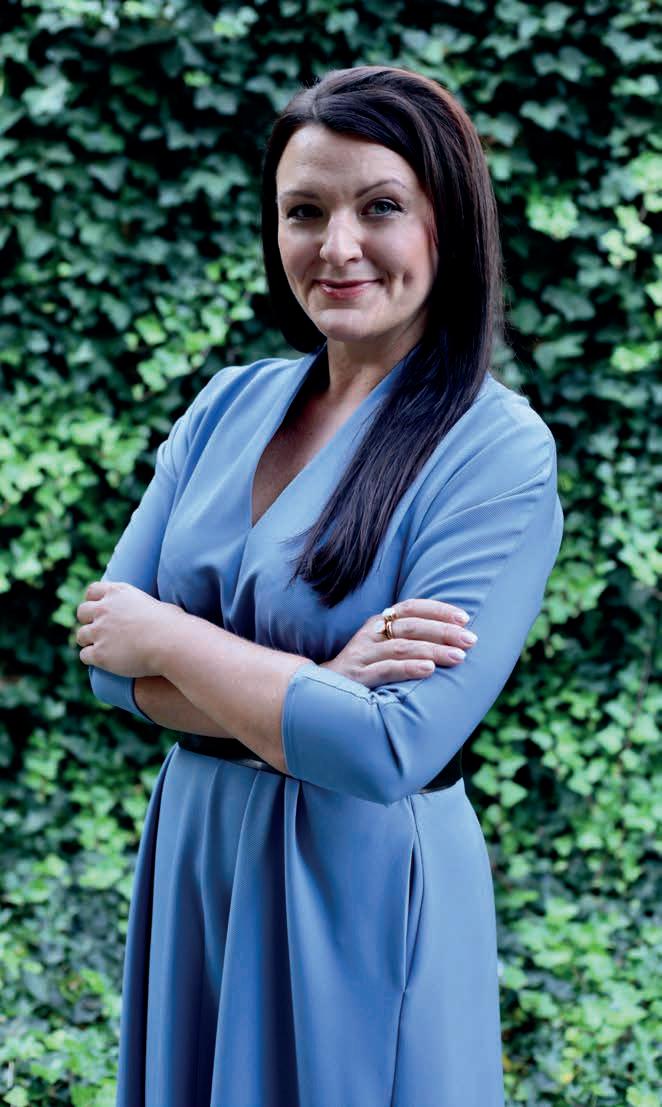
“Being Slovak, working for an EU institution, and being assigned to Prague feels like simultaneously being both at home and abroad. But, above all, I identify myself as a “EUropean”, declares Andrea Ferjenčíková, European Investment Bank Group (EIB Group) Representative in the Czech Republic. The EIB is the lending arm of the EU. The Bank is owned by EU countries, and the Czech Minister of Finance is one of its 27 Governors. “Our mission is to finance sound investments that can contribute to EU policy,” says the representative.
Can you tell us about yourself?
Being Slovak, working for an EU institution – the Bank of the European Union – and being assigned to Prague feels like simultaneously being both at home and abroad. But, above all, I identify myself as a “EUropean”.
I consider myself a dynamic and result-driven professional who has spent the last 16 years in public affairs, economic diplomacy, business, and investments, both at the national and EU levels. I have worked as an advisor to EIB Vice Presidents, headed the Minister of Economy’s cabinet, and worked at the Finance Ministry during the Slovak EU Presidency. I spent several years leading a Slovak NGO, focused on EU economic affairs and policies. In the early stages of my career, I held consulting positions and junior roles at the European Parliament, Ministry of Foreign Affairs, and the Permanent Representation of my country to the EU. I have studied
in London, Warsaw, Bratislava, and Banská Bystrica in Slovakia, and hold degrees and certificates in law, international relations, diplomacy, and finance. In my activities, I strongly advocate for sustainability and the field of sustainable finance.
Besides my everyday tasks, you may find me as a member of businesswomen empowerment organisations, advocating for diversity and inclusion, serving as a member of an investment awards jury, or organising the donation of used computers to children / students facing financial hardships.
You have been in the Czech Republic for nearly five years. Can you share some of your highlights?
In my current role as the EIB Group’s Representative, I serve as the official representative and the head of the diplomatic mission of the EIB Group in Czechia.
When I arrived in the winter of 2019/2020, I encountered strong opposition from political leaders, businesses, and people regarding the ‘green deal’, as many considered it a threat. This was particularly challenging as our bank had just adopted a new energy and climate policy framework, recognising the need to increase support for green investments. I am now proud to see how quickly Czechia understood the potential and opportunities brought about through the green transition, and how this has led to enhanced collaboration on various fronts. The goal is to accelerate the decarbonisation, modernisation, and resilience of the Czech economy, and to improve everyday life for everybody in the country. Today, Czechs are much more open to discussing, and, more importantly, implementing various innovative financial instruments, as well as exploring modern models of
investment governance in the country.
The EIB is the long-term lending institution of the EU owned by its member states, including Czechia. The Czech Minister of Finance is one of our 27 Governors. Our mission is to finance sound investments that can contribute to EU policy. EIB-backed projects strengthen competitiveness, foster innovation, promote sustainable development, and improve social and territorial cohesion while supporting a fair and rapid transition towards climate neutrality.
The EIB Group, which also includes the European Investment Fund (EIF), signed a total of €88 billion in new financing for over 900 projects in 2023. Thanks to these commitments, around €320 billion of investment is expected to be unlocked, supporting 400,000 businesses and 5.4 million jobs. In addition to financing, we provide advisory services, which include technical assistance to support project development, as well as financial advisory to design the most suitable financial instruments for any specific investment project.
The EIB closely collaborates with other EU institutions to foster European integration, promote the development of the EU, and support EU policies in over 160 countries around the world. As of this summer, the Czech EIB office will move to the joint seat of EU institutions at the Palác Dunaj. We can’t wait to be closer to our European Parliament and European Commission colleagues!
How important is the EIB to the Czech Republic’s economy?
I can confidently say that we are creating an impact. Supporting the Czech economy for over three
decades, we have financed projects worth close to €30 billion. Our investments have backed almost all key sectors of the Czech economy, including transport, energy, urban development, and climate action innovation projects. From the outset, we have supported all sectors of the local economy, i.e. the state, regions, municipalities, but also private companies, banks, investment funds, smaller businesses, and start-ups.
Last year, the EIB Group injected a total of €1.88 billion into the country. Three quarters of these investments not only contribute to regional development, but also prioritise environmental sustainability.
Among the recent projects we have financed you can count the modernisation of railway tracks all over the country, the backing of green energy for households and businesses, a push for startups that deal with digitalisation, AI and fintech, and, last but not least, the installation of solar roofs at industrial buildings. In addition, our advisory services have agreed to help the Czech government in developing innovative investment models, which will attract private funds to affordable housing projects.
Generally, our aim is to bring additional value to all our financing operations, and I am positive that we succeed in doing so.
Can you compare the situation today to the one of the 2007–2008 financial crisis?
Today, we are living in an era of multiple crises (“polycrises”), and must respond to emergency calls. Institutions like the EIB are part of the EU toolbox for crises. More than once, we were asked to find investment solutions to complex problems. Our pioneer instrument following the 2007/8 financial crisis was the Juncker plan, which
allowed us to take on considerably more risk in a project than previously possible.
Recently, we have introduced several ambitious schemes for financing and advisory services under our Climate Bank roadmap, hoping to accelerate the urgently needed green transition. During COVID-19, the Group has responded with the pan-European guarantee fund to support the banking sector. This helped thousands of companies across the EU to survive. As a reaction to the unprecedented aggression against Ukraine, we have established a special facility to protect critical
infrastructure in the country. To ensure energy resilience, reduce the EU’s dependence on fossil-fuel imports, and accelerate the energy transition, we are increasing our financing through the Repower EU initiative.
What are the main areas and priorities of the EIB?
Our new President, Nadia Calviño, who assumed office in January this year, has presented eight strategic priorities built on the strengths of the EIB Group. These include strengthening the climate bank, accelerating technological innovation and digitalisation,
stepping up investment in security and defence, modernising cohesion policy, agriculture, and the bioeconomy, as well as investing in social infrastructure such as affordable housing. Finally, the bank will continue its activities outside the European Union, notably in the water and energy sector, and to empower vulnerable groups and communities.
You hold the status of the head of a diplomatic mission. What has led you to this position?
I do hope it is a combination of my stamina, my passion for the European project, and my active
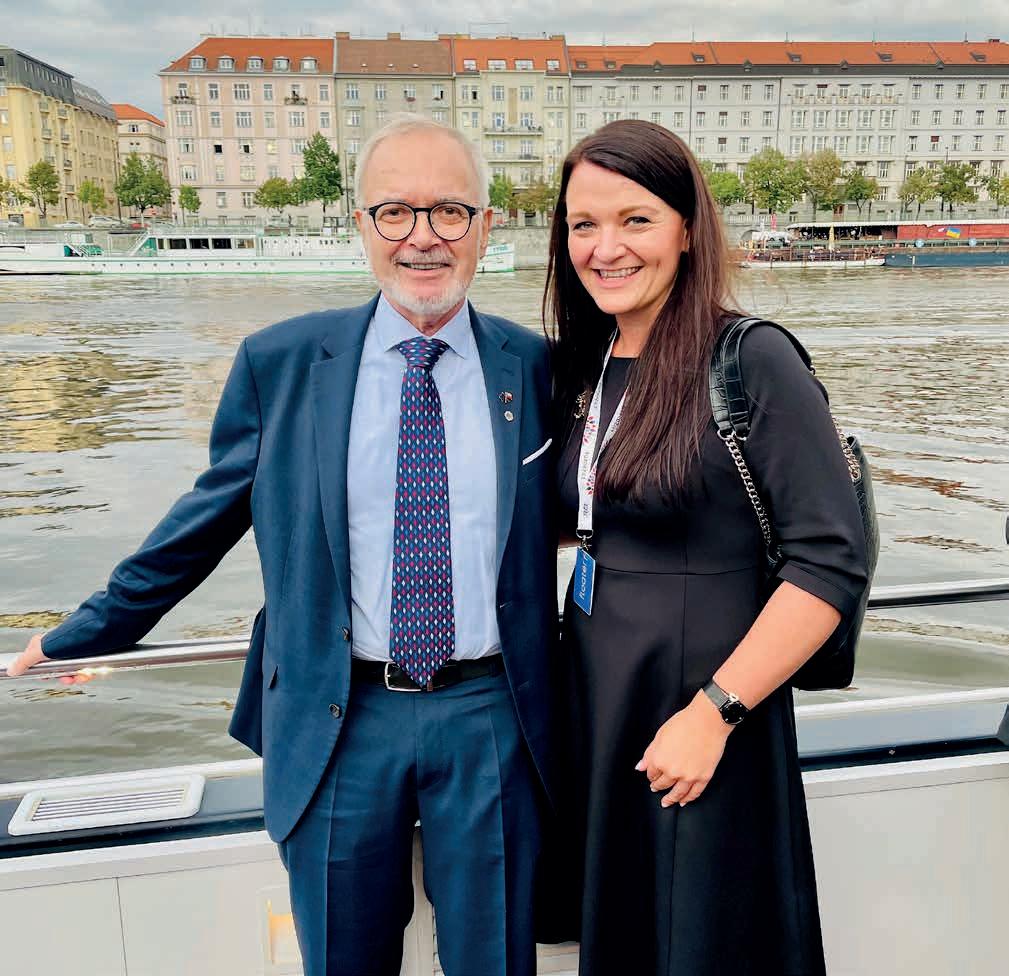
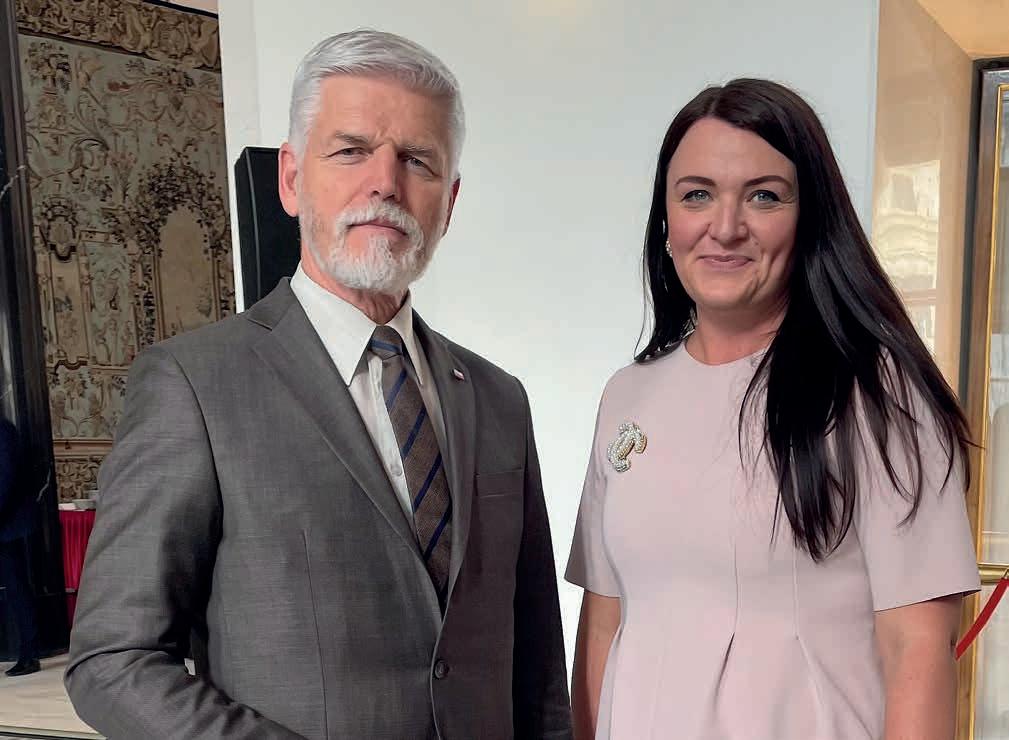
local engagement. In my opinion, institutions like ours should have a strong connection to national and regional governments and organisations in order to best address the needs of the ‘market’. Conversely, they should also have the ability to advocate for and promote policies, and identify business opportunities.
What do you feel is the best adventure you have experienced during your career?
Arrivals. These are the moments that leave lasting impression, and I believe the combination of two different ‘arrivals’ has created a strong footprint in my memories. My first arrival was for an official audience with the Czech President, where I entered via the majestic courtyards of the Prague Castle, surrounded by presidential guards. Another arrival I vividly remember is to Karviná, an old
mining city in Moravia. The dust turns white cars into black, abandoned mining towers lined the road, and, driving there, I realised just how urgent our ‘transition’ and decarbonisation programmes are. This is the sort of adventure that brings even more joy and dedication to my job.
What do you consider the weirdest thing you have ever dealt with?
It should not come as a surprise that we constantly receive requests for financing of various projects, from wind turbines to egg farms. However, most strikingly for me, people associate EU institutions almost exclusively with subsidies and grants. Well, as our name indicates, we are a bank, and our role is to lend and borrow money.
Do you have time for some hobbies?
I am a design and architecture enthusiast, with a love for exploring new cultures through travel. For years, I have been known as an avid baker, which I believe hones my precision and creativity. Lately, I have (re)discovered my passion for plants and drawings. I am curious what will come next!
Where do you see yourself five years from now?
Surrounded by a safe and inspiring working environment, leading yet another initiative, and working towards creating a real impact. My ultimate goal would be to leave a meaningful, sustainable footprint on our society, for a better Europe.
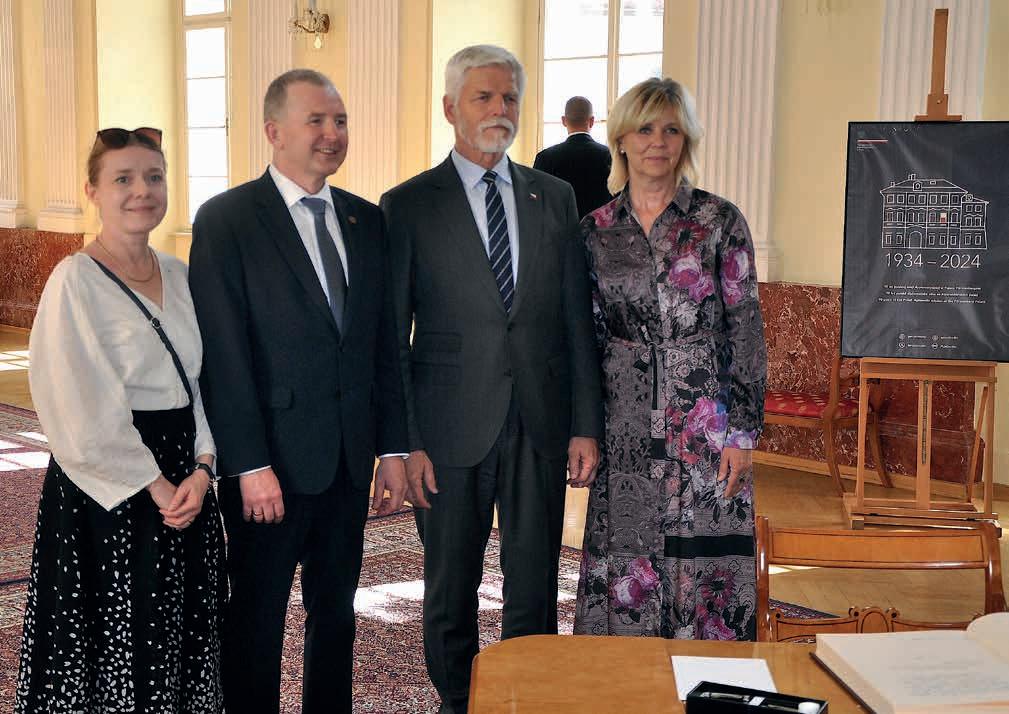
On the occasion of Poland’s National Day, and the anniversary of 90 years of relations between the Republic of Poland and the Czech Republic, the Ambassador of the Republic of Poland, H.E. Mr. Mateusz Gniazdowski, hosted a special reception at the beautiful garden in Fürstenberg Palace (The Embassy of Poland in Prague), with a great view of Prague Castle.
Speech of the Ambassador of the Republic of Poland to the Czech Republic, H.E. Mr. Mateusz Gniazdowski
Dear Mr. President of the Czech Republic, Dear Mrs. Pavlová, Dear President of the Senate of the Parliament of the Czech Republic, Dear Minister of Foreign Affairs of the Czech Republic, Your Excellencies, Ladies and Gentlemen, Dear Friends, Dear Guests.
It is my great pleasure to welcome you to the gardens of Fürstenberg Palace, the seat of the Polish diplomatic mission in Prague for 90 years. Thank you, Mr. President, for accepting this invitation. We find ourselves at a time that is favourable for reflecting on our cooperation – just now we heard Ode to Joy, and recently we celebrated 20 years of EU membership together. While we have been co-creating Europe together
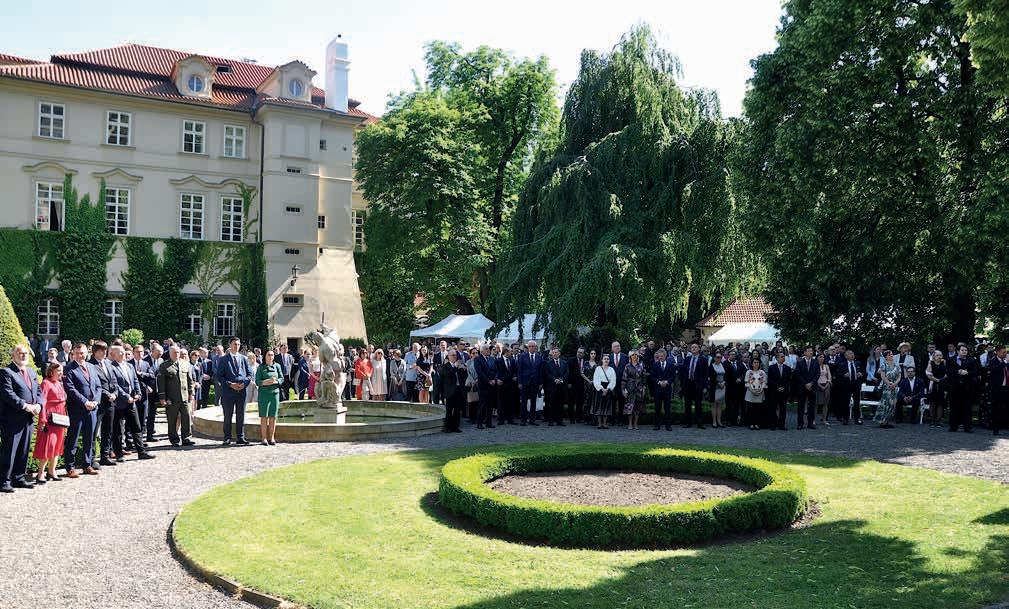
for more than a thousand years – in Poland, Christianity arrived from Bohemia – our membership of the European Union is a historic opportunity to influence the fate of the continent. Today we commemorate the Constitution of 1791, one of the first in Europe, adopted by the Polish-Lithuanian Commonwealth: a modern constitution with the principle of the separation of powers, natural liberty and the sovereignty of the people, based on the common political values of a civil society and a will to reform the state. The protection of democracy and these values marks another important anniversary for us: we have been NATO allies for 25 years and have valiantly co-created a third of the Alliance‘s history. As tangible proof of this, we are already looking forward to the meeting of NATO Foreign Ministers in Prague.
The last two years have demonstrated how close Poland and Czechia are to each other: how similarly they perceive the issues of freedom, independence and democracy, and how they
oppose revisionism and imperialism. This is reflected in practical cooperation on behalf of Ukraine suffering a barbaric invasion, and includes the supply of arms and ammunition. It is good to have allies like the Czech Republic in these efforts. We are also bound by our interest in close transatlantic cooperation.
Recently, MFA Radosław Sikorski mentioned in the Sejm that Poland‘s most important partners in the EU are Germany and France, while the Nordic countries and the Baltic states, as well as Romania and Czechia, were highlighted as „our closest allies and friends“. The Minister added at the time that „these are countries with whom we understand each other without words“, but that doesn‘t mean we do not talk to each other!
Let us remind ourselves that President Petr Pavel, after his election and after his traditional first visit to Bratislava, went to Poland. This year, PM Tusk and Mr. Sikorski have also visited Prague as well as the Speakers
of both chambers of the Polish Parliament on the occasion of the V4 Summit. Furthermore, intergovernmental consultations will take place this autumn. Polish-Czech cooperation is intense and completely amicable. Given the crisis of V4, in which we intend to remain, we observe the will for closer bilateral political consultations. This was illustrated by the meeting of PMs before the V4 meeting and a similar bilateral meeting of FMs.
Polish-Czech contacts are more intense than ever before – including cross-border ties, trade (€33 billion/year), tourism – with growing understanding, mutual learning, and affection. Czechs are traditionally listed in surveys among the nations that Poles like best, while recent surveys show that Poland is among the top three countries liked most by Czechs. We are becoming a reference point for each other, we understand each other more and more which allows us to deal with our differences.
The citizens of our countries wish for good Czech-Polish relations.

Our good cooperation is reflected in the wider region and is appreciated by our allies.
I would like to thank the Representative Band of the Land Army from Wroclaw for honouring our celebration. Seeing the Polish uniforms, I would also like to draw attention to an important element of the cooperation of the Polish and the Czech armed forces. Our officers and soldiers, as always in the most difficult times, understand each other very well. I would like to thank the sponsor, PKO BP, and the whole Embassy team for cooperation. Thank you all for being here with us today.
Speech of the President of the Czech Republic, H.E. Mr. Petr Pavel
Your Excellency, friends of Poland and the Czech Republic, Ladies and Gentlemen.
First of all, I would like to express my gratitude for the opportunity to speak here today. I accepted the Ambassador’s invitation with true pleasure.
I perceive the relationship between Czechs and Poles as a source of inspiration. We have been living side by side for many centuries and our nations are deeply intertwined. We are linked by a history of great changes and twists, as well as by the everyday history of cross-border destinies, accompanied by friendships and quarrels.
Nevertheless, we are friends first and foremost! However, our friendship is not a mutual uncritical admiration. It is a dynamic of goodwill.
A book by a Polish bohemist Aleksander Kaczorowski is titled: „Czechia. You can’t make this up“. I could have not said that better! We look at each other with kindness and lasting awe – and yet we understand each other.
Today we gather here to commemorate Constitution Day. Your Constitution of 3 May, born 233 years ago, is a symbol of modern Europeanism. It foreshadowed the long struggle for Polish
sovereignty and real control over its own destiny; a control that is impossible without freedom, equality and justice.
I am pleased that these are the values that our countries stand on even today; and I firmly believe that they will continue to do so in the future.
Allow me to add a personal memory from 1981, when I was on vacation on the Hel Peninsula. The Solidarity movement was at its peak, social dynamics were galloping and the price of petrol suddenly rose by perhaps 1000%. When I asked a petrol vendor to sell it to me for some reasonable money, he uttered a memorable phrase: „We have freedom, which also means free prices“.
The wild capitalism is behind us, but a piece of logic from the petrol vendor words is permanent. Freedom is not free. If we do not want to live in a totalitarian state and controlled poverty, we must stay responsible, tolerant, just, and uphold the principles of
a free economy and social sensitivity at the same time. We must honour democracy.
We are trying to do it separately and we are trying to do it together. We are active players in the EU. We are responsible allies in the NATO. We are leaders in supporting Ukraine.
Our historical experience has provided us with a better
understanding of what is at stake if we do not consistently concern ourselves with what is happening beyond our borders, and not just to our east. Let’s persevere!
Dear friends, dear guests, I wish you and us all the best. I wish Poland a successful presidency in the EU Council in the first half of the upcoming year. I wish everyone as many gatherings as possible where we can celebrate
true democracy. I wish us many more decades of freedom and great partnership.
In other words: “Czechia and Poland. You can’t make this up!“
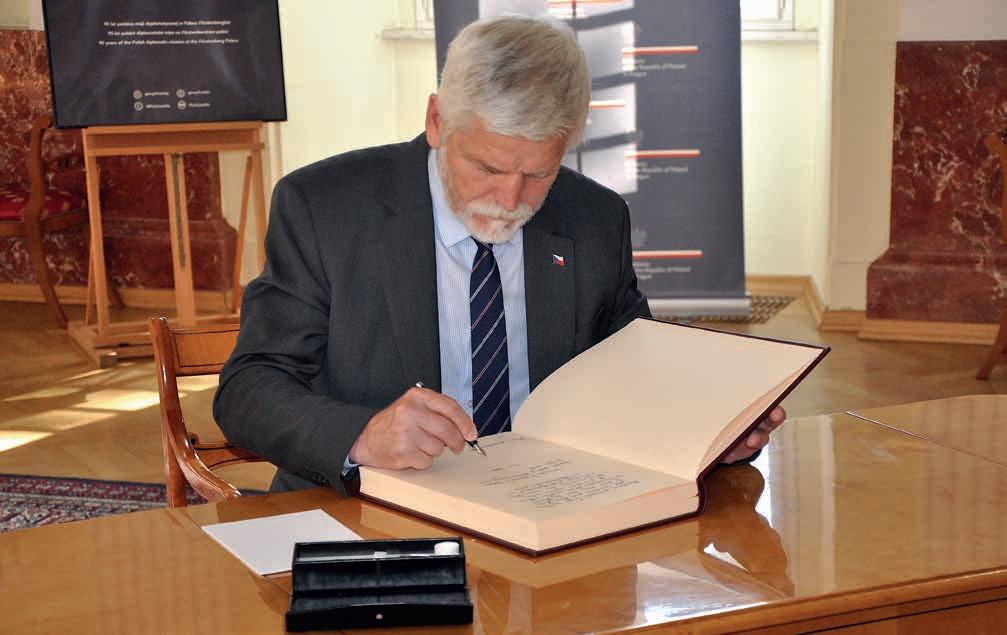
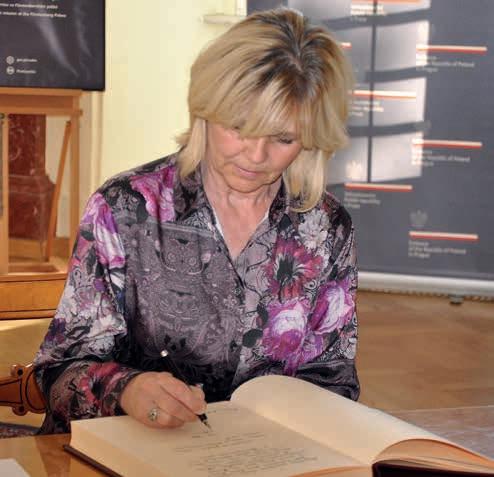
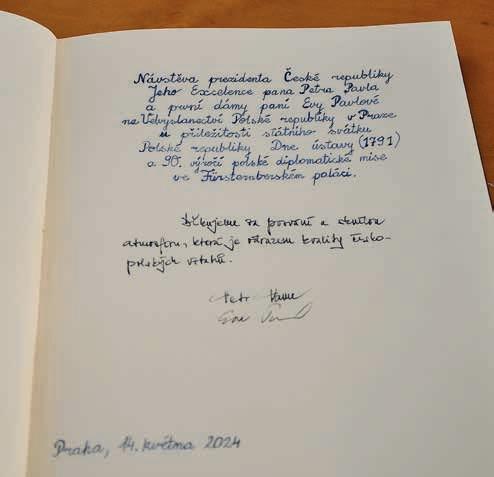
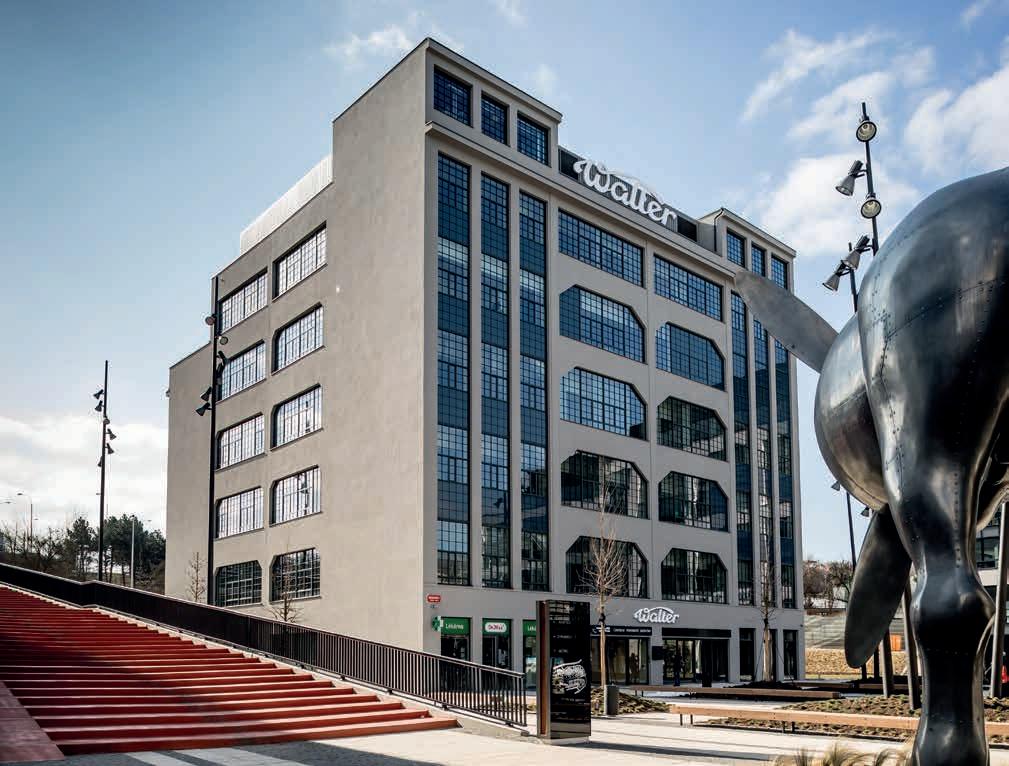
Life is getting faster, our to-do lists are getting longer, and now, more than ever, time is money. No wonder we are witnessing the growing popularity of the new trend of one-day surgeries. It deals with planned surgical procedures, and allows for treatment with a minimally invasive approach, eliminating the need for long-term hospitalization. Let’s have a look at the Canadian Medical Waltrovka Clinic in Prague, a facility offering a wide range of procedures. Among the fields where one-day surgery is applicable are general surgery, gynecology, orthopedics, urology, and pediatric surgery.
The client comes in for surgery in the morning, and leaves to go home, all within 24 hours. For some types of surgeries, patients can leave immediately after local anesthesia, or after a short rest following general anesthesia. This is possible thanks to the use of modern and minimally invasive procedures, as well as gentle anesthesia that do not burden the body.
“The main advantage of a one-day surgery is a quick return to normal life, including work. At the Waltrovka Clinic, a team of experienced professionals with
years of practice take care of the clients. Highly qualified nurses are part of the team, and, together with the doctors, they form a well-coordinated team from which the patient benefits the most. We value a professional and human approach. Discretion and language proficiency of the entire staff are also par for the course,” explains Radim Stein, the manager of operations at the Canadian Medical Waltrovka Clinic.
A one-day surgery is suitable for patients undergoing planned operations. The most common medical fields include:
General Surgery: hernia surgery, gallbladder, appendix, hemorrhoids, removal of tumors
Orthopedics: joint arthroscopy, reconstructive joint arthroscopy, carpal tunnel, forefoot surgery
Vascular Surgery: varicose vein surgery
Gynecology: surgery of female organs, not only plastic and aesthetic gynecology, but also diagnostic and therapeutic procedures, surgical treatment of fertility disorders, removal and insertion of IUD, Hysteroscopy, cervical conization, polyps removal, laparoscopic sterilization
Urology: foreskin preservation procedures, circumcisions, vasectomy, frenuloplasty, water hernia plastic surgery, varicocele, spermatocele
Pediatric Surgery: surgery of pediatric patients – hernia plastic surgery, water hernia, varicocele, undescended testicles, foreskin preservation procedures, circumcisions, removal of tumors
A modern trend is laparoscopy. Currently, most organs in the abdominal cavity, such as the gallbladder, hernia, and appendix, are commonly operated on laparoscopically. It is considered a very gentle and safe diagnostic and therapeutic surgical method. A laparoscopic procedure means less stress to the client, shorter recovery and work disability, less post-operative pain, and, last but not least, a smaller scar. The minimally invasive procedure and short hospital stay eliminate the risk of hospital-acquired infections.
Above-standard care at the Canadian Medical Waltrovka Clinic
At Waltrovka Clinic, one-day surgical procedures are performed by experienced specialists in two modern and state-of-the-art multi-disciplinary operating rooms. In the inpatient section, they offer hotel-type single rooms
that are above standard, as well as one double room. Patients have privacy in their rooms, with standard amenities including Wi-Fi, as well as their own bathroom, shower, and TV.
Pediatric surgery is also a specialization of Canadian Medical’s Waltrovka facility, and children are a very important group for the clinic. Such surgeries are only allowed to take place in facilities that are appropriately equipped (both technically and in terms of personnel) – conditions which the clinic at Waltrovka meets. Care for children requires perfect coordination between the surgeon and the parents. The operation is performed by a pediatric surgeon, in collaboration with a pediatric anesthesiologist. For pediatric patients, their hospitalization is a greater burden than the actual surgical procedure. They stay in a foreign environment, must adhere to hospital routines, and
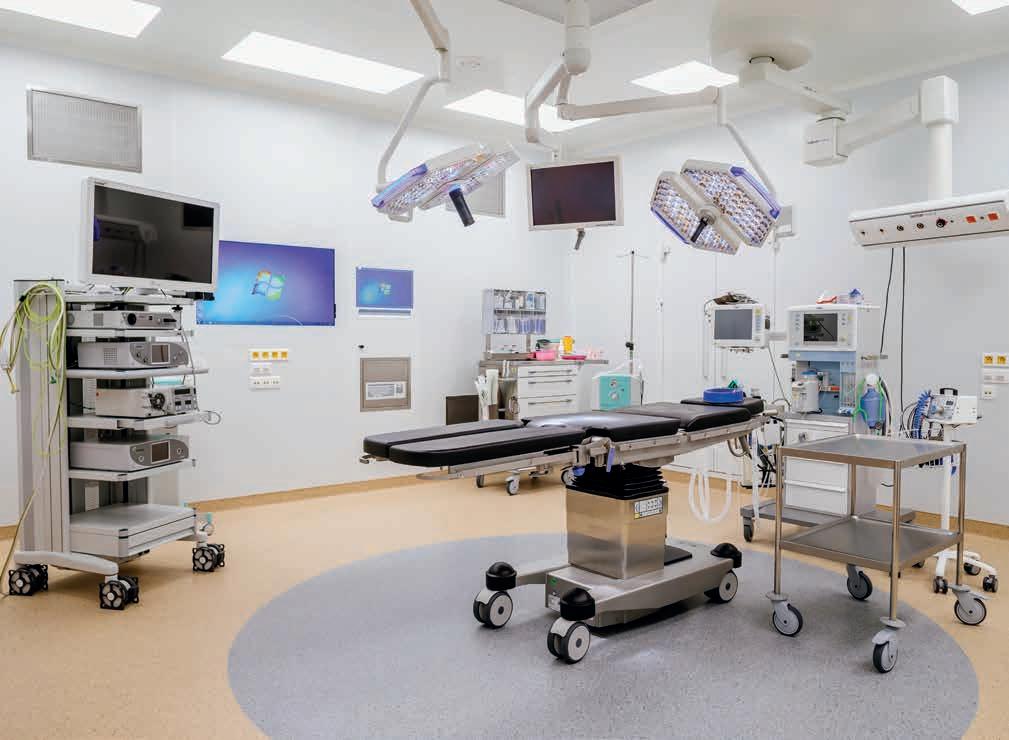
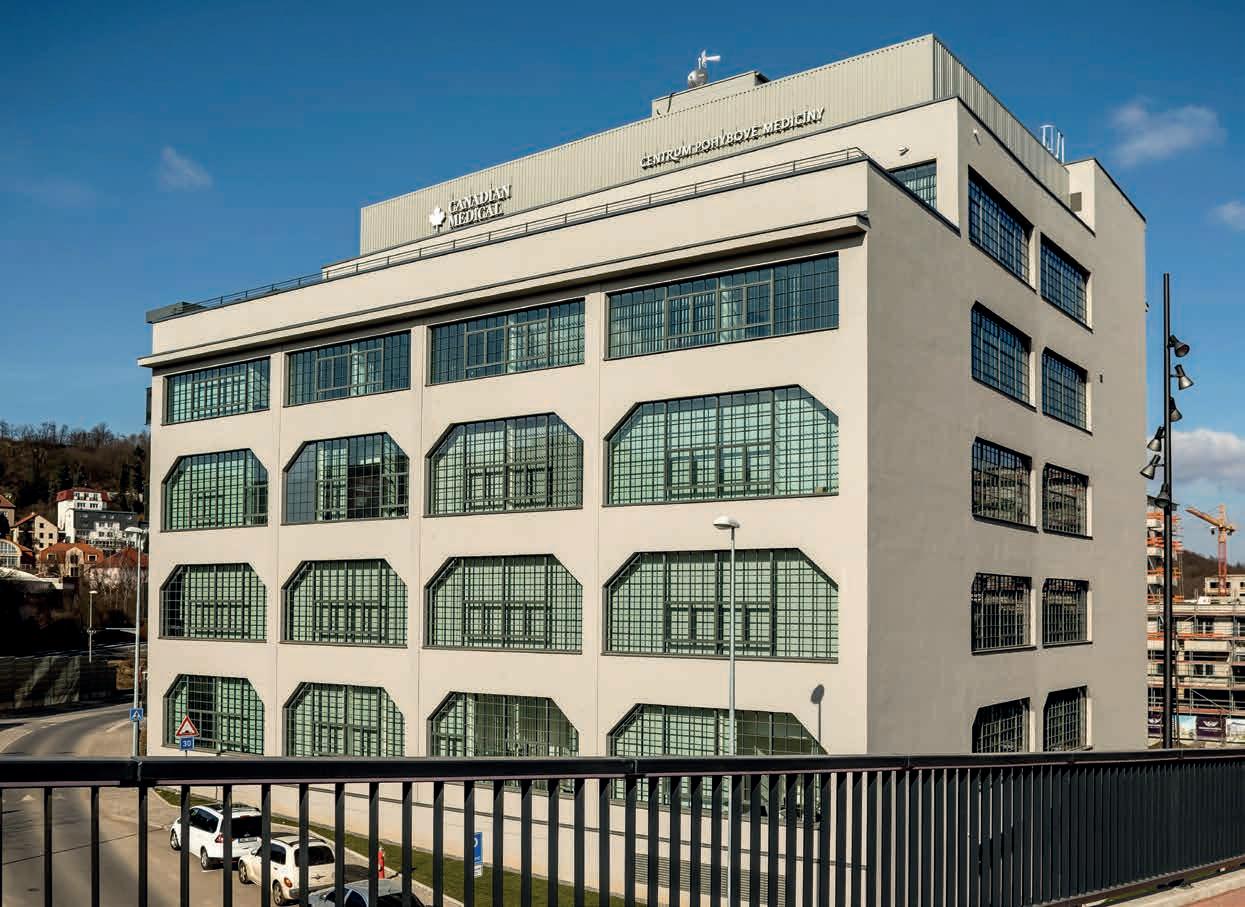
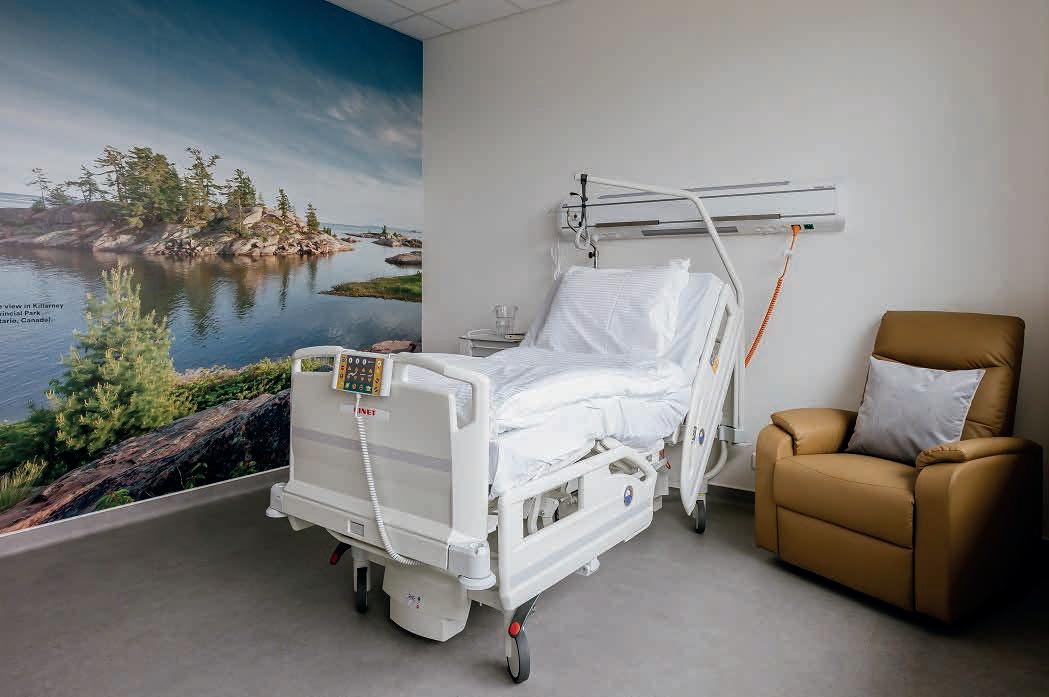
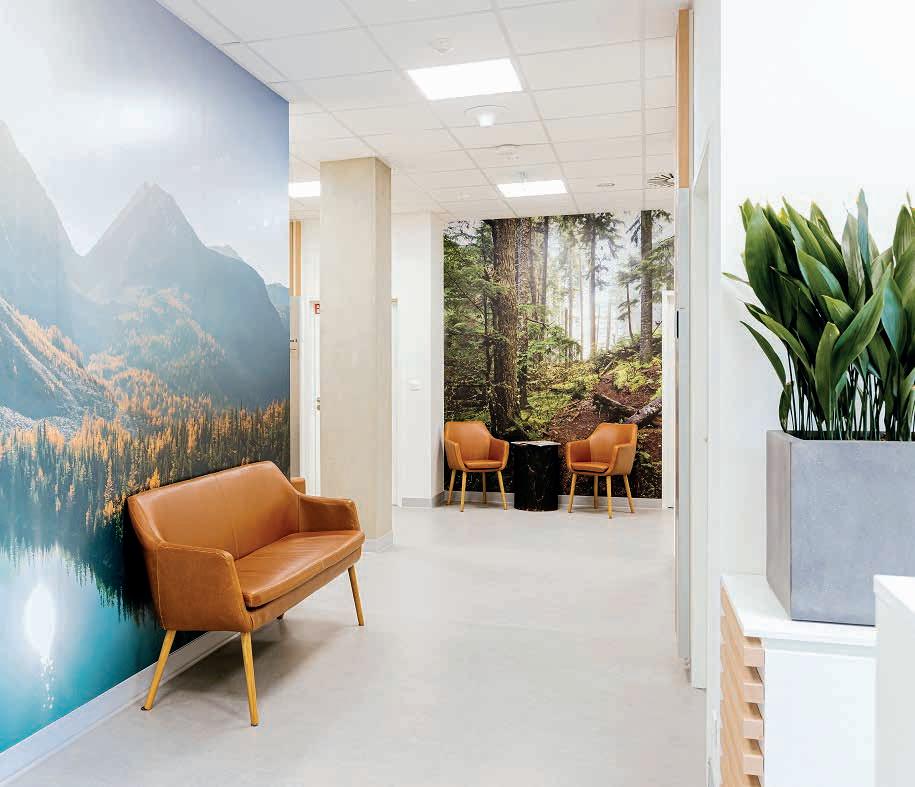
often get bored. An experienced and empathetic team, as well as a pleasant environment tailored for children, helps them better cope with the operation and stay. At Waltrovka, they approach children with great caution and care. During treatment, modern and age-appropriate educational tools are used. Among other things, each pediatric patient is greeted with a teddy bear on their bed, on which the doctor then explains what the little patient can expect. The presence of parents throughout the treatment is standard practice.
Making an appointment, and after
How do you make an appointment? And what should you, as a patient, expect? “After showing
interest in a non-urgent procedure, the client is first scheduled for a consultation with a doctor, who will choose the most suitable method of operation based on their current health condition. Together, they will decide on a tailored treatment plan. We put emphasis on an individual approach and the patient’s current health condition, including longterm monitoring with the ‘Quality of life after surgery’ protocol,” explains Stein. “All our care is in line with the international IAAS criteria for day care.”
Subsequently, the operation date is planned together with the coordinator, and the client then undergoes all necessary pre-operative examinations. The client arrives on the day of the
operation in the morning, and is accommodated in a premium room. After the operation and an assessment of the patient’s overall health condition, they are discharged to their home environment as soon as possible. Throughout the recovery period, the client stays in touch with the doctor for planned check-ups, as well as any needed health-related consultations. The Canadian Medical Waltrovka Clinic has contracts with all Czech health insurance companies, and surgical care is available to all clients with Czech health insurance. Clients with foreign insurance are also accepted on a direct billing and self-pay basis.
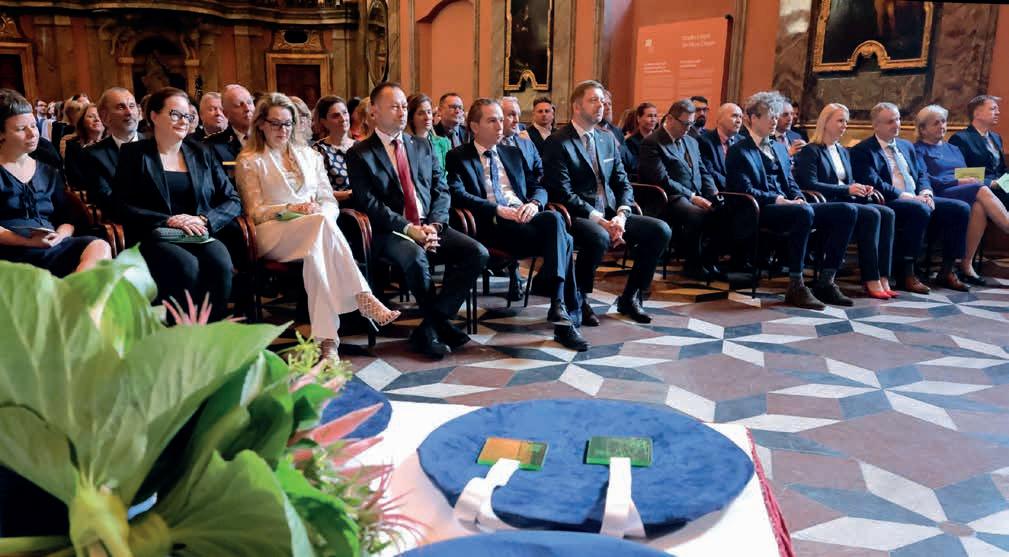
In the labyrinth of bureaucratic structures, there exist unsung heroes — individuals and teams, working tirelessly within the Czech state and municipalities. Their exceptional efforts often go unnoticed, overshadowed by the complexities of public administration. Yet, their impact is profound, shaping the quality of life for citizens and improving the efficiency of government operations.
The Administrative Achievement of the Year initiative is a commendation and celebration of those individuals and teams contributing to the improvement of governmental work and the quality of life in the Czech Republic. It gathers successful examples of projects that have led to enhancements in
public services, and which promoted innovative ideas and teamwork within the public sector. This project, created by the Ministry of the Interior’s Section for Civil Service, in collaboration with the Byro platform (a non-governmental organization), emphasizes overcoming obstacles and advocating for new ideas despite challenges. Its goal is not only to celebrate the successes of workers in the public sector, but also to inspire others to know that there are alternative approaches.
The Administrative Achievement of the Year 2023 is not a competition with winners and losers, but rather a celebration of boldness, determination, and openness.
It is an acknowledgement of those who have gone the extra mile, fostering better collaboration, leveraging data for informed decision-making, embracing digital innovation, and, ultimately, serving the public interest with excellence.
The call for nominations for the prestigious awards was open to the public, colleagues, and superiors across six distinct categories: Innovation in Public Services, Digital Transformation, Outstanding Collaboration, Team Support, Analytical Work, and Public Administration Hope. In the inaugural edition, a remarkable 136 nominations flooded in from various offices and municipalities across the entirety of the Czech Republic.
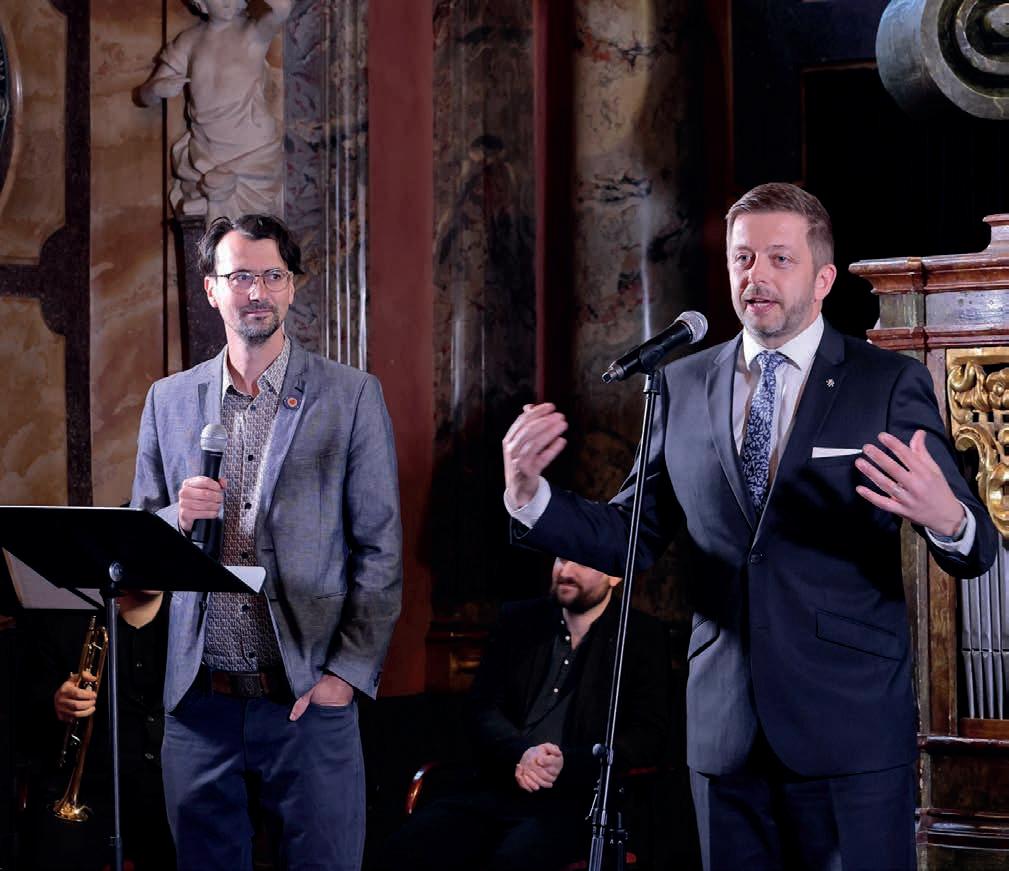
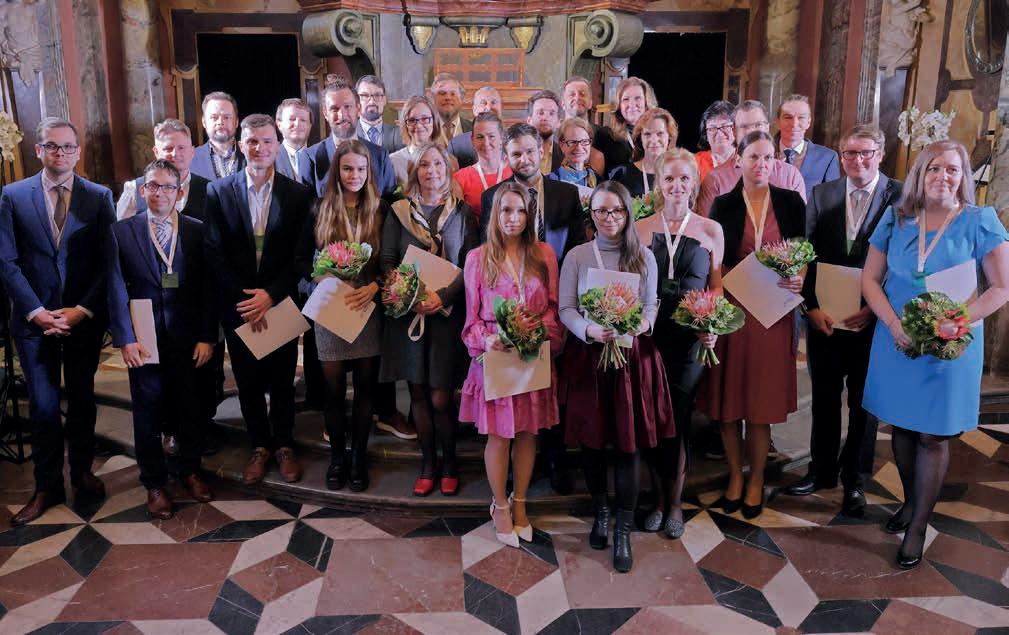
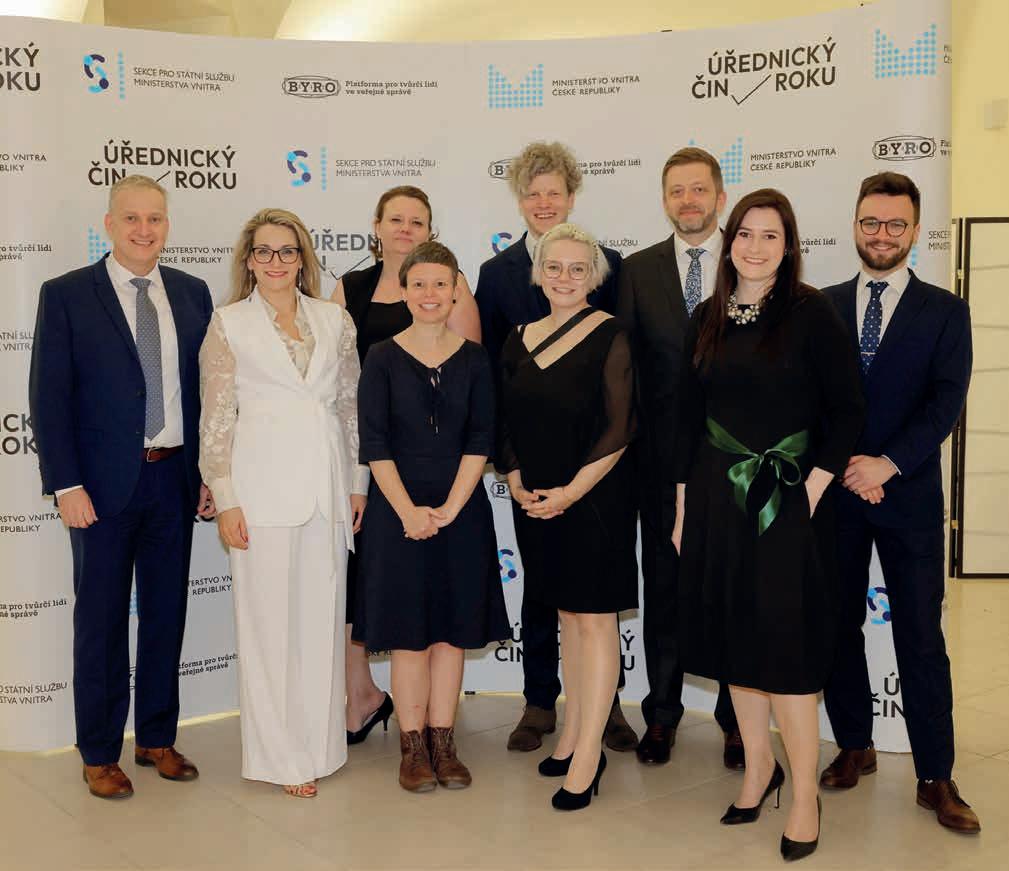

Among the nominees were regional initiatives, such as the restoration of the Imperial Baths in Karlovy Vary, as well as national initiatives, such as the Strategy for Supporting Czechs in EU Institutions (outlining how to prepare future 21st-century teachers who are preparing for their profession at university) and a strategic collaboration in handling the large number of refugees from Ukraine (with focus on their integration into primary and secondary schools). Eleven remarkable projects were awarded across various
categories, showcasing exemplary efforts from governmental offices and regional authorities. A list of awarded projects is available on: www.cinroku.cz.
The award went to representatives from the Ministry of Education, Youth and Sports, Pardubice Regional Office, Vysočina Regional Office, Ministry of the Interior, Ministry of Regional Development, Karlovy Vary Regional Office, Central Bohemian Regional Office, National Pedagogical Institute of the Czech Republic, Government
Office, Ministry of Justice, and Ministry of Culture.
These exemplary projects underscore the dedication and ingenuity of public servants across the Czech Republic, highlighting their commitment to enhancing the quality of life for citizens, and fostering positive change in governance.
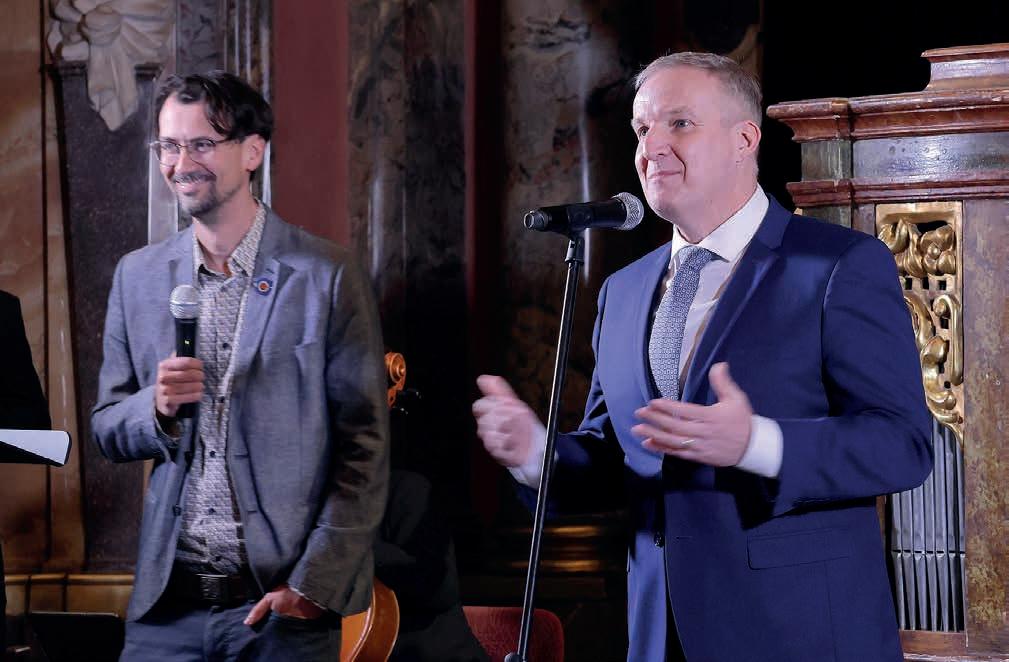
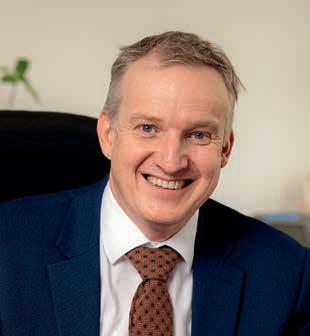
is a senior civil servant, who has held the top position since November 2022. The Chief State Secretary is the head of the Civil Service in the entire Czech Republic. This is the top position within the entire civil service. For his work, he also received The Order of Academic Palms from France, the Grand Federal Cross of Merit from Germany and the First-Degree Medal of the Czech Ministry of Education, Youth and Sports.
They say if you want to walk far, walk with friends. In iota, people of goodwill from around the world can find a safe space to be valuable and earn an honest living while creating together luxury decorations and accessories of unexpected designs. Alongside the managing team, there are many other talented women who knit, weave and join together the elements from which the products are finally made. The majority of profits from iota’s product sales will be invested in welfare and educational programs worldwide.
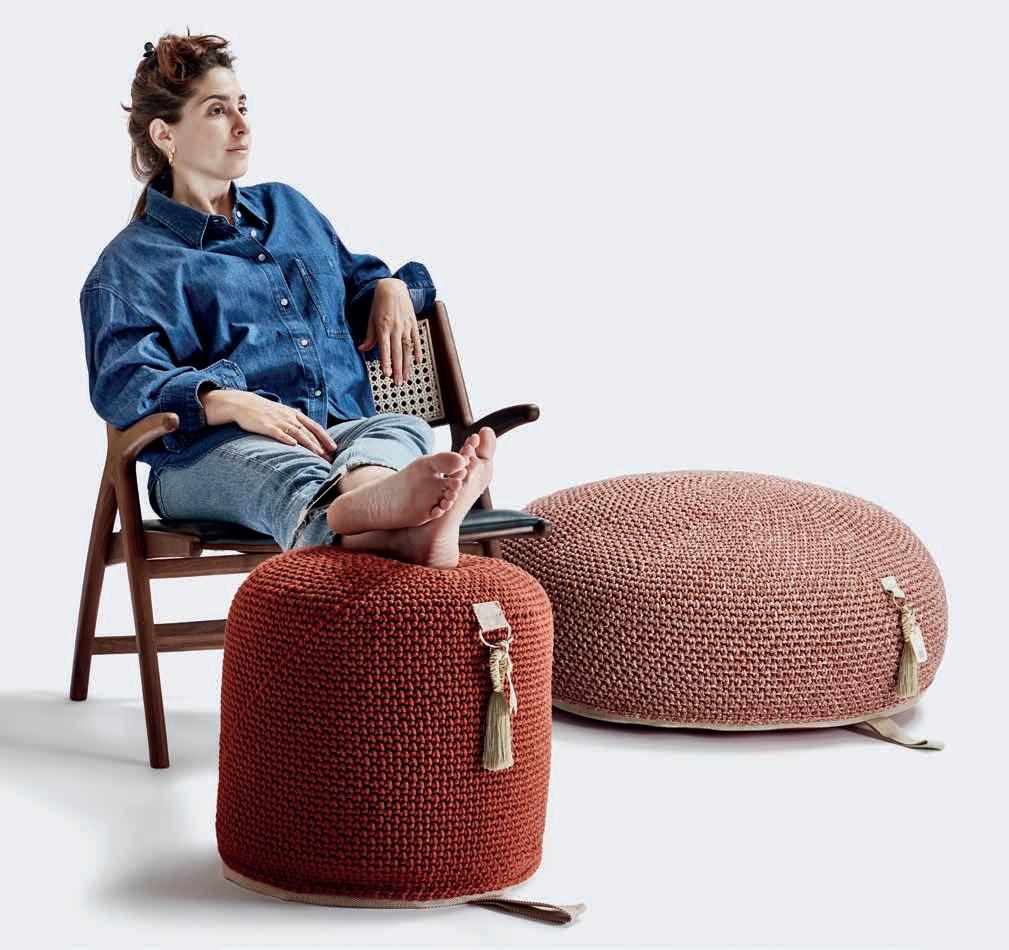
From a single stitch to a final product
iota is a social project striving to design beautiful handmade objects for our homes while creating jobs for otherwise unemployed women worldwide. The vision behind iota is to establish a movement that allows different women from around the world to learn a technique of traditional handcraftsmanship,
by providing them employment and allowing them to work from home and earn an honest living. Behind the idea, there is also the belief that regardless of the infinite possibilities that technology offers, there is still a search for a personal and unique handprint.
The name iota has a meaning. It stands for “a bit” in Latin and as it is, little by little, from a single stitch to the final product, from
the individual to the global, the project aspires to make an impact on the lives of everybody involved – the clients, the employees and the community. iota aims to work within communities with high rates of unemployment and provide mentoring and training programs for both men and women. iota teaches methods of re-appropriating traditional craft techniques and as a result, the apprentices create handmade

elements which then turn into the final design and earn their living.
The main concept in iota’s design is creating innovative products from a traditional starting point, and changing the perception of what can be done using hand techniques. The motto followed here is “We make tradition contemporary”. First, old techniques are learnt and when combined with modern knowledge it is possible to come up with new unique and innovative design. Luxurious bespoke yarns are used in the process and collaboration
is going on with various designers and craftspeople, as well as manufacturers. All this creates a new textile language that combines various materials into unlimited products.
The process of hand craftsmanship, which necessarily requires time and attention from the craftswoman, creates an emotional connection between her and the final product she created. This connection creates emotional products. The products embody the craftswoman’s unique fingerprint thus making her an inseparable part of the final product. As opposed to a machine which creates anonymous products,
such handmade products have a past, a background and a memory.
A skill, if utilized, can have rewarding qualities; rewarding to the product that is created as a one-of-a-kind element; and rewarding to the craftsperson, whose skill makes him an expert, and therefore meaningful. This empowerment, deriving from owning a skill, is what iota strives to preserve and enhance.
In iota, they use different traditional techniques and different fibers: wool, polyester, cotton, acrylic and leather. Most of the threads are made especially for iota and are unique in their shape, construction or coloring. By combining different materials to create the fibers, they are able to preserve the strong qualities of each of the components and to create the precise assembled thread combining both fine texture and construction strength. Along with the fibers which draw together the textiles, iota products are composed of additional materials such as timber, metal and leather. These answer constructive and design requirements and create smart and complex objects.
iota’s collections are dedicated to crochet knitting (knitting with one needle). This technique, originally from northern Europe, allows the creation of both planar and three-dimensional shapes by making knots in different spacing and thus represents endless configurations. Knitting is an international language, with global terms and signs, thus overcoming distance, culture and language difficulties, and permitting iota to create an equal identical starting point for their team. The women who knitted the elements for the collection needed no prior knowledge of knitting but were rather taught the technique in
a short course given by iota which allowed them to specialize in it. In addition, numerous knitting tutorial videos are available online, allowing the apprentices to magnify their knowledge and refine their skills individually.
The brand is built on people
They say, if you want to walk far, walk with friends – and this is exactly what iota is doing. The brand is built on people, and they are the ones creating the products and the company’s vision. Speaking about iota wouldn´t be complete if we didn´t mention a few names behind the project.
Shula Mozes is a social entrepreneur and founder of LAMERHAV. LAMERHAV seeks social change through in-depth intervention in the lives of highly motivated Israeli youngsters who lack the family backing necessary to realize their potential as adults. Shula presents social motivation by backing the iota brand and working to push it forward.
The connection between Shula and Tal Zur, an Industrial Designer, who is responsible for the design vision, is what created the brand and brought it into development. Tal, an alum of the HIT Design Academy and today a junior professor at
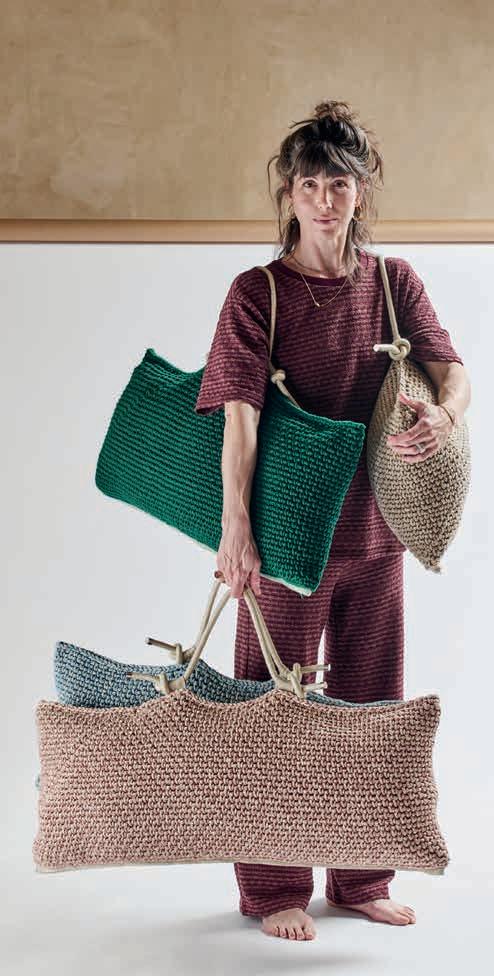
the school is also an alum of the Museology and Curator program at Tel Aviv University. Tal works a great deal with crafts and combining industrial and textile designs. She serves as the brand’s CEO.
Dorit Chesler is the Commercial Manager. Dorit is an Architect, a graduate of Tel Aviv University, and has an advanced master´s in historical construction. She is an organically raised manager who believes in the integration of creativity and management. Her role in iota is managing of all the brand´s day-to-day operations and leading all chief processes within the brand and with its partners.
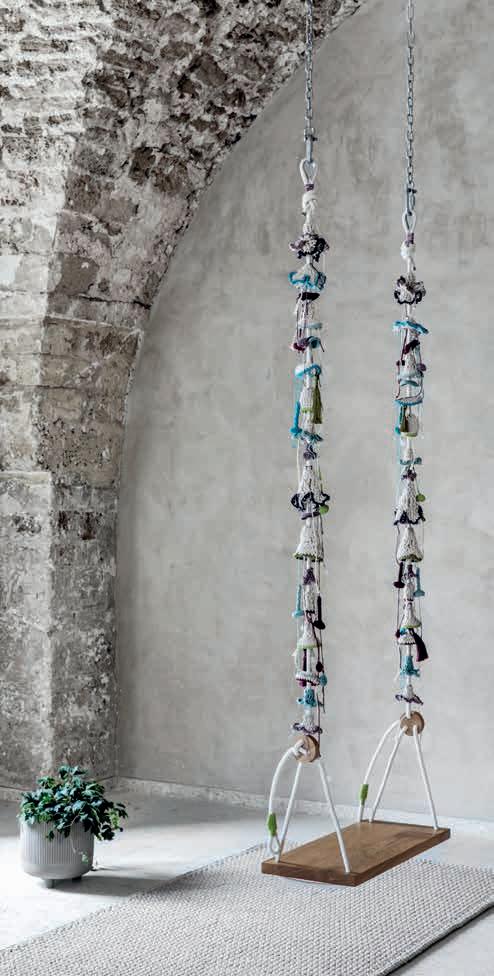
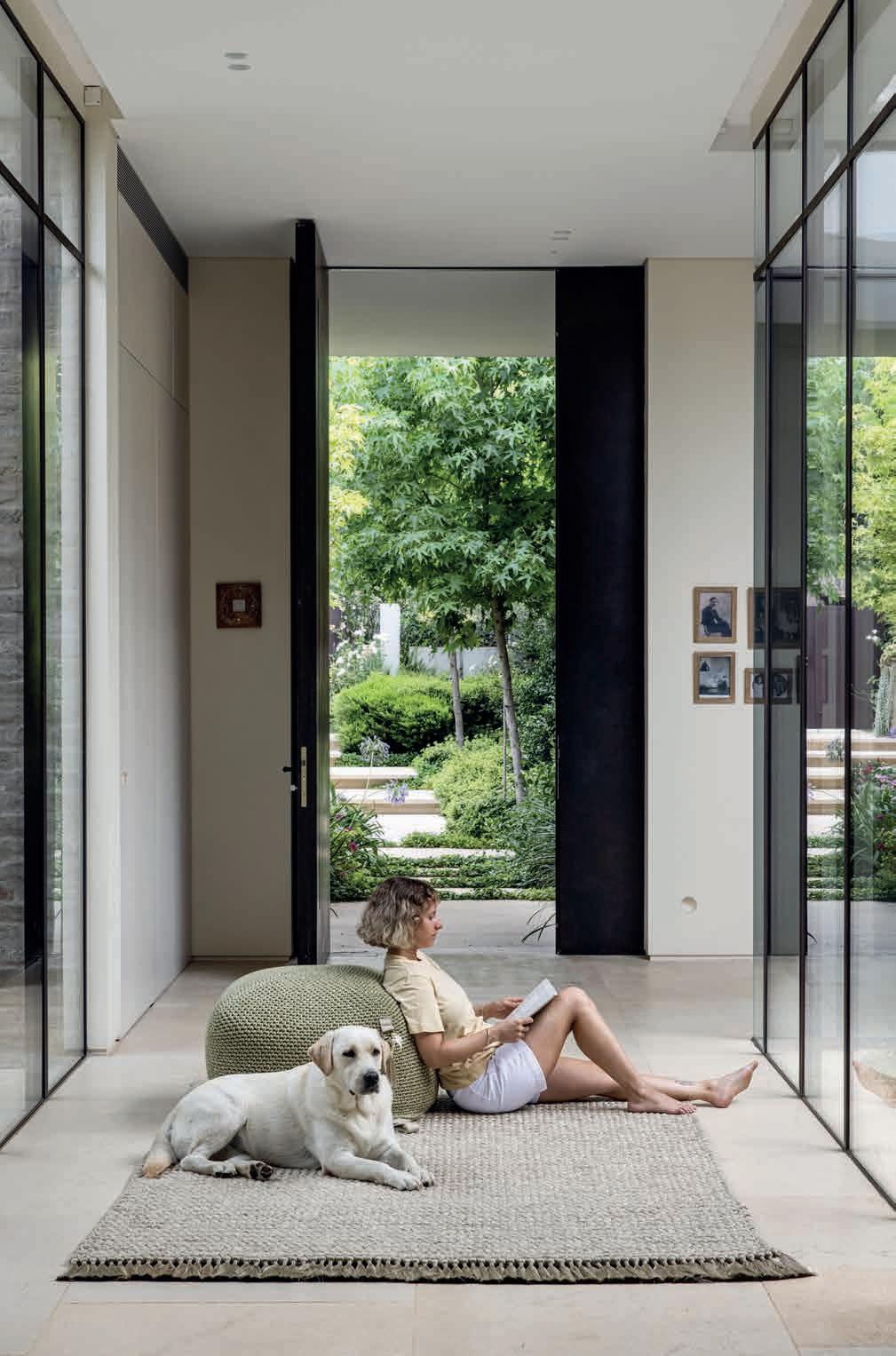
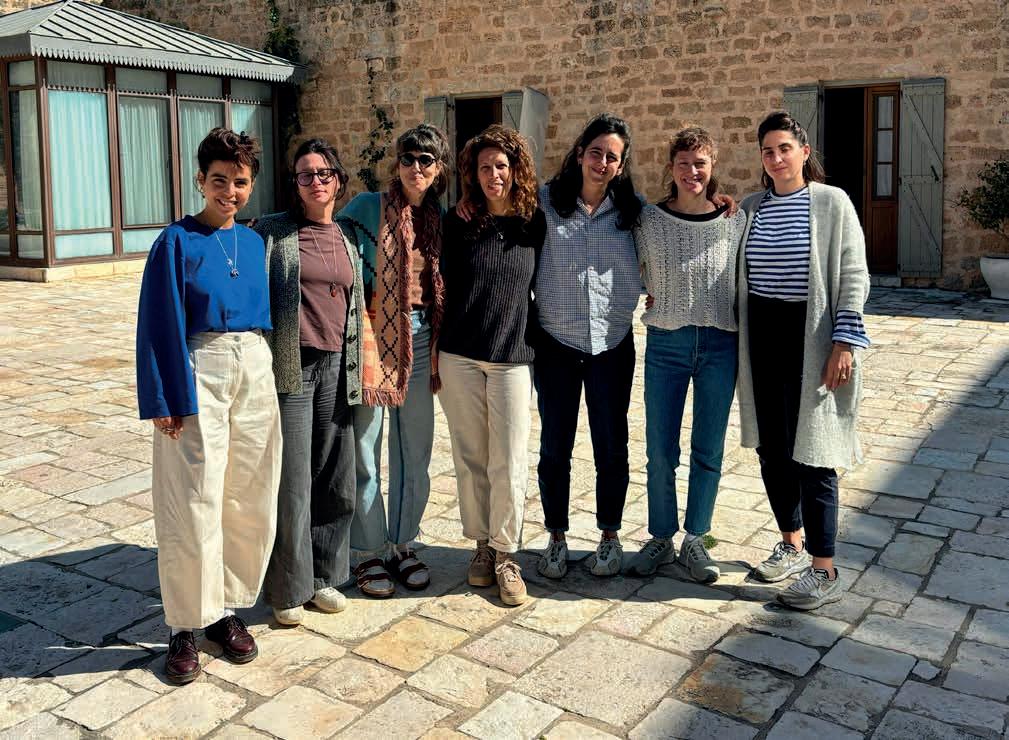
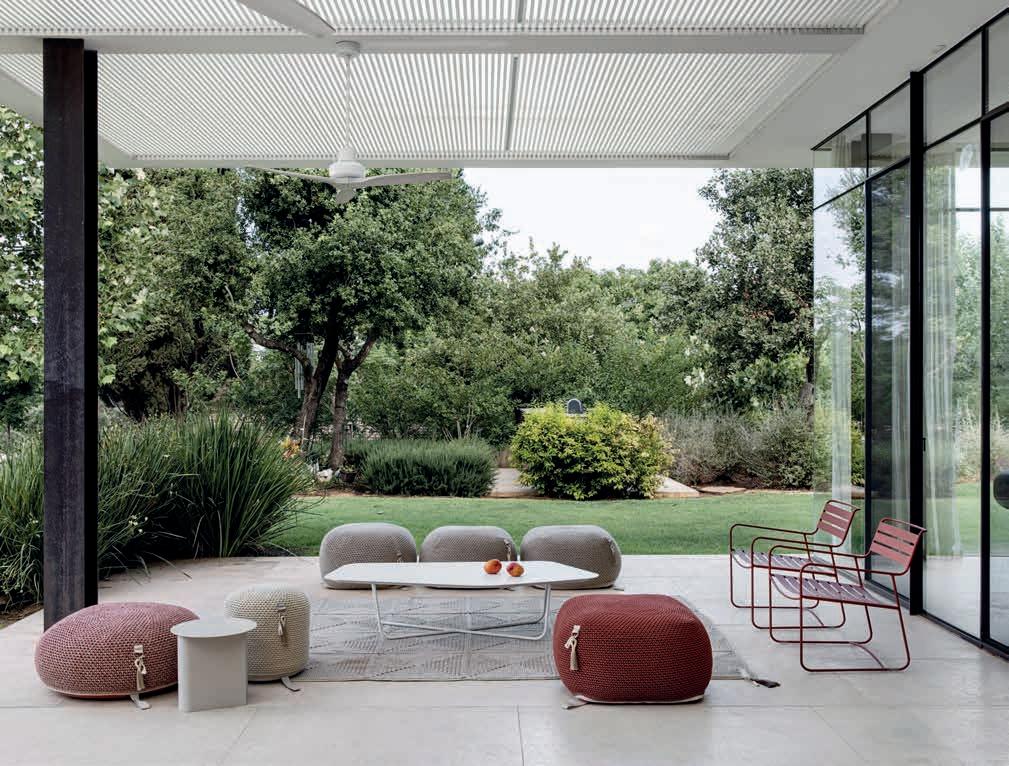
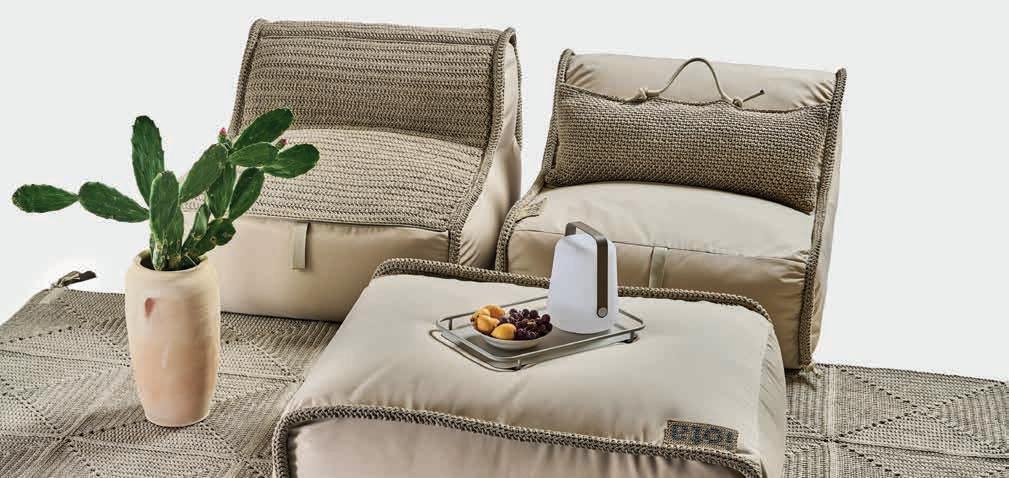
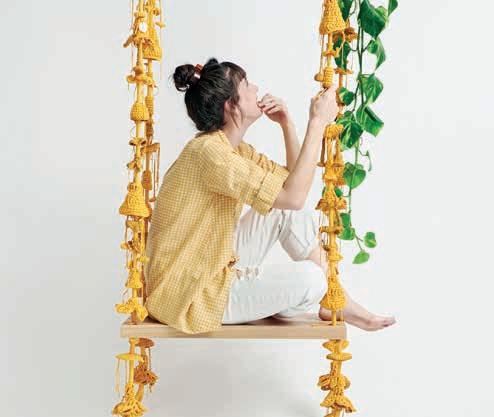
Noa Curiel, Product Designer, is an industrial designer, an alum of HIT Design Academy and L’ecole Lesage for embroidery in Paris. In iota, Noa is the lead designer of product development in all stages, from the drawing table to the final production, and leads the processes of the creative team.
Tami Eilat, Project & Visual Manager, is a graphic designer, alum of Shenkar design academy. She plays two roles in iota, integrating her skills and abilities. Tami manages all the brands day to day and operations, being the one who sees all the small things that no one ever sees and making sure that everything is as it should in every scale. She is also the brands
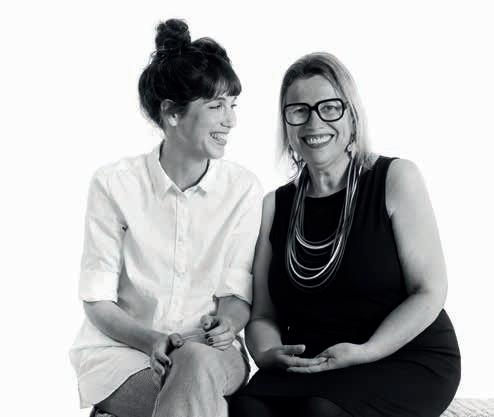
visual manager, bringing her unique visual point of view and defining how the brand presents itself in all aspects, online and around the globe.
Chen Bogin, Head of Marketing & Customer Relations, is a product designer, alum of HIT design academy. In her final project she was trying to bring together plant seeds with textile, realizing that sustainability could come alive in different ways. In iota Chen takes care of telling iota’s story, creating new business, partners and contacts.
Lena Wolchok, Hand Work and Product Development, learned to knit at age five in her hometown
of Novosibirsk, Russia. She did not pick up a needle again for 25 years, until she realized her talent for knitting could save her from a frustrating career as a math teacher. She began applying her mathematical mind to the counting of stitches and became an expert knitter. In iota she is responsible for the translation of ideas into tangible items.
iota handmade luxury products can be purchased at: www.iotaproject.com/shop
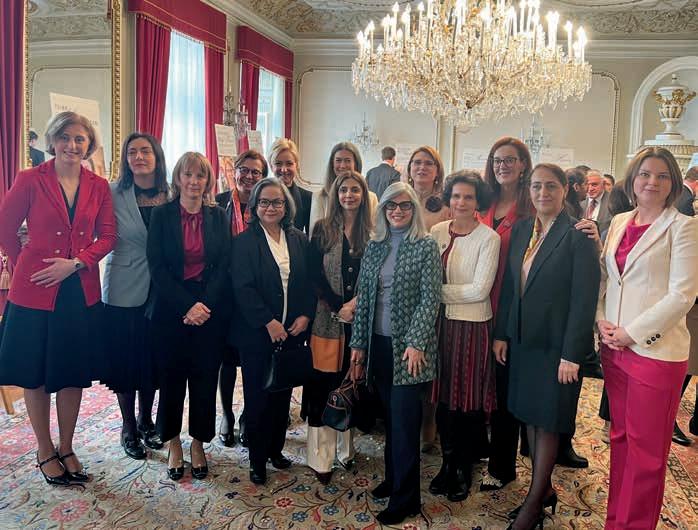
This inspiring exhibition was opened at the Prague Embassy of Romania, symbolically on this year’s International Women’s Day. H.E. Ms. Antoaneta Barta, Ambassador of Romania, hosted the inauguration event in the presence of the authors and her fellow women ambassadors, to whom she expressed many thanks, saying that without their support this project would never have been accomplished. “The exhibition creates a sense of community of the strong, successful, and inspiring women. This artistic project wants to highlight the stories behind our official role, the stories that made us what we are today,” said H.E. Barta in her welcome speech.
The idea of creating a series of photo portraits and stories of all 17 women ambassadors in Prague came from H.E. Ms. Martina Mlinarević, Ambassador of Bosnia and Herzegovina. “I wanted to write about my friends in a special way. To
write about the women ambassadors’ upbringing, about growing up of the girls in different parts of the world, about experiences that made them the strong and extraordinary women they are today,” she said at the opening.
The author of the portraits is H.E. Mr. Bijan Sabet, Ambassador of the USA and a photographer, whom Ms. Mlinarević described as a person of exceptional artistic talent with a special fondness for photography. “Usually, when I am asked to do something, I am kind of trained to think about it for a second – when Martina asked me to do this, it was the fastest yes I have ever come up with,” he shared his feelings in his brief speech.
The exhibition is meant to inspire and encourage women to follow their dreams. The authors (two of them ambassadors themselves, plus Ms. Amila Hrustić, a designer from Bosnia and Herzegovina
They grew up in different parts of the world, in different circumstances, languages, and cultures, but what they have in common is being an incredible inspiration to others. These women ambassadors use their strength to advocate for positive changes in their communities. This is why this series of portraits and stories was created, in a project called H.E.r Story.
living in Prague) hope that, as you read the stories and see the faces of the women ambassadors, you will be inspired to achieve everything you have ever dreamed of. That is also why a group of young Ukrainian girl refugees were invited to the inauguration – to hopefully find a ray of sunshine and hope in the exhibition. H.E.r Story will be now on display in public spaces, to encourage and give examples in order to help all young girls fulfil their dreams.
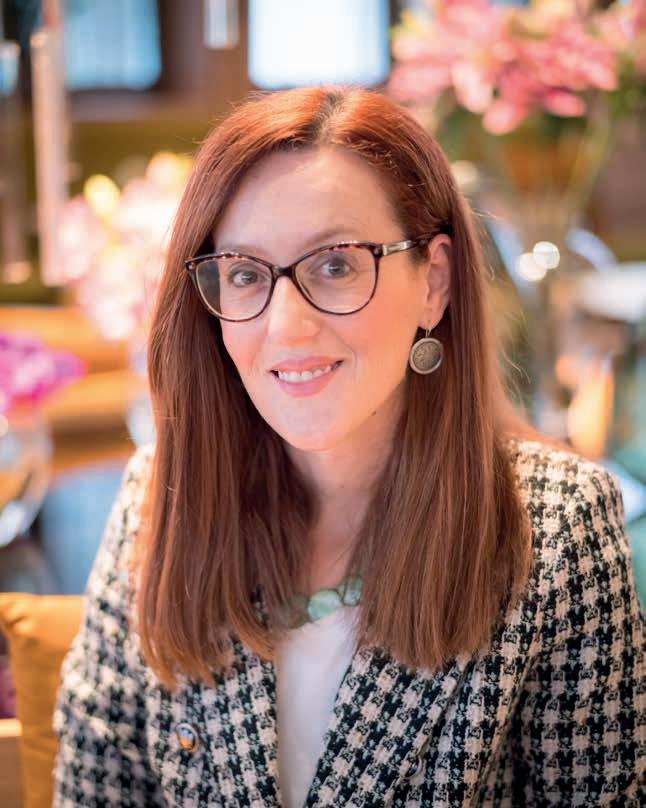
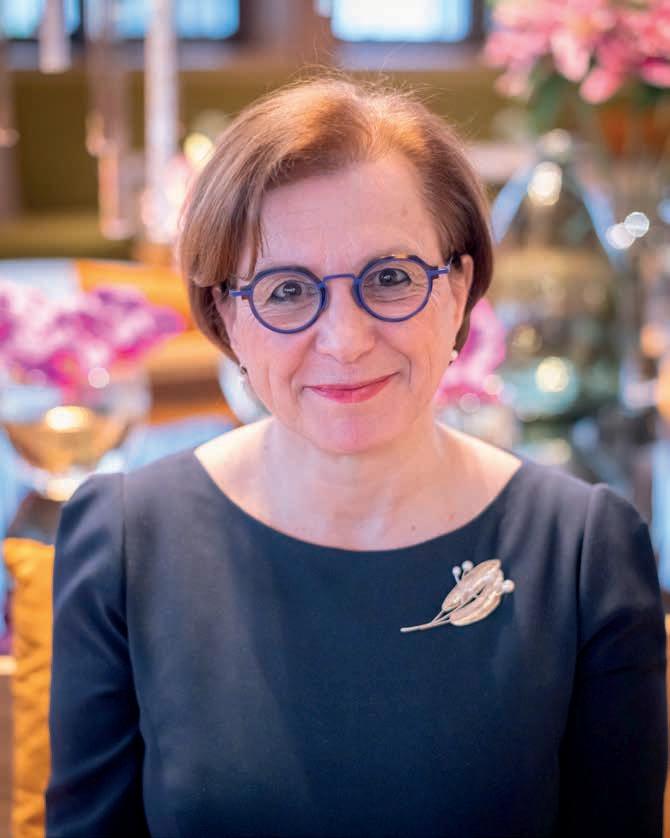
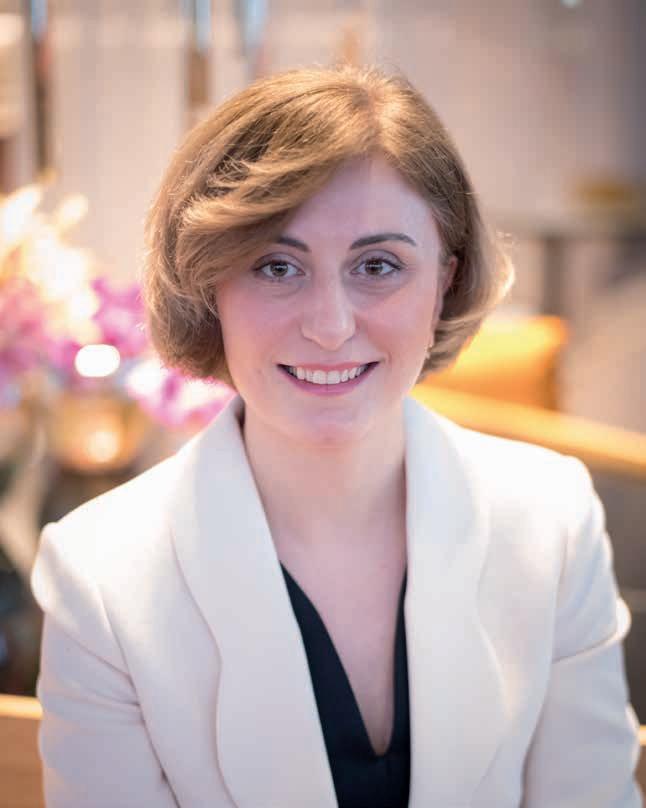
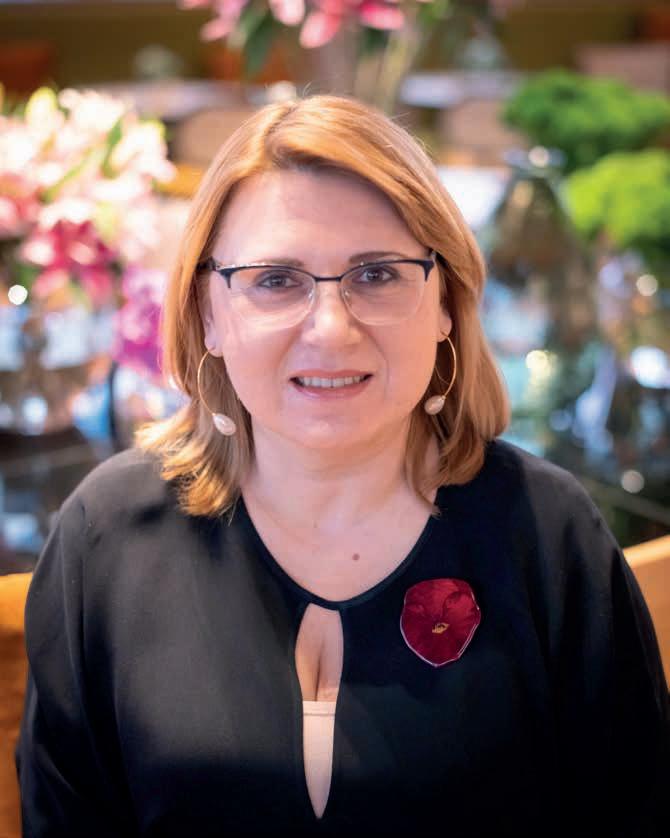


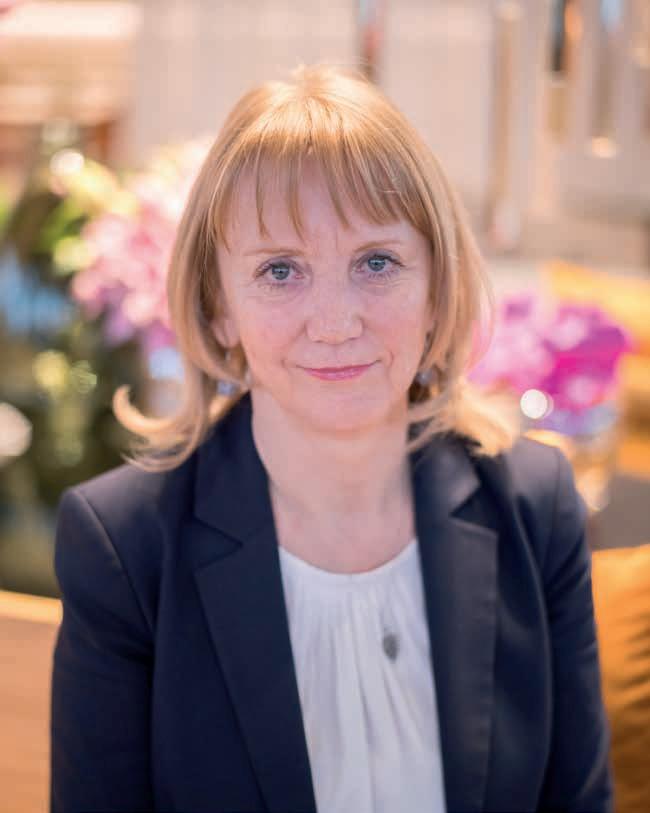
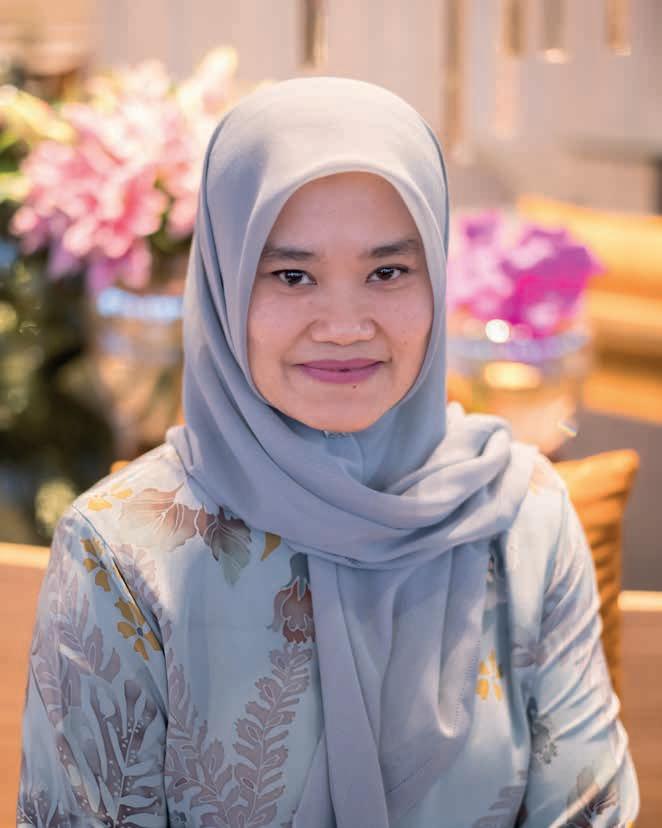
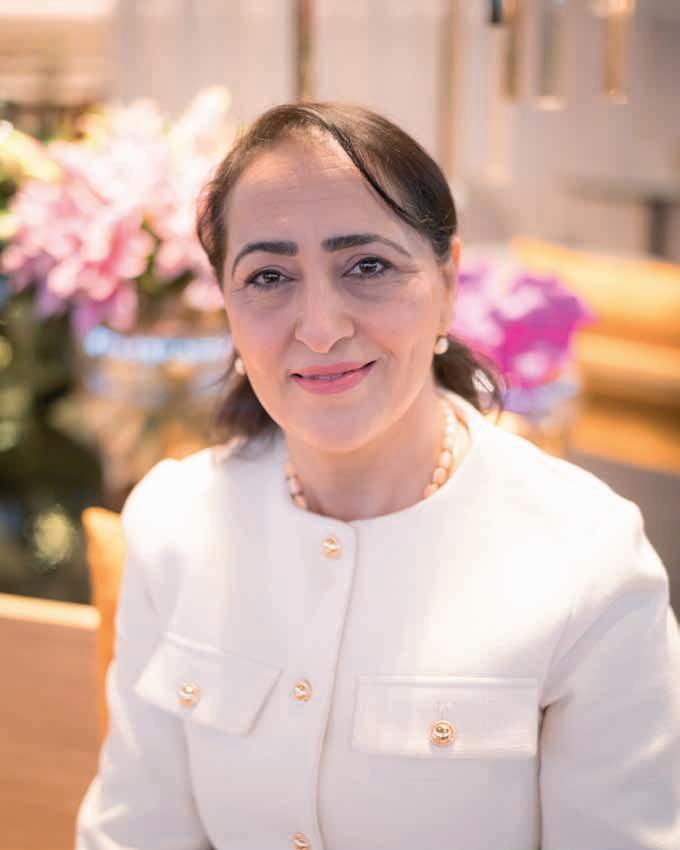
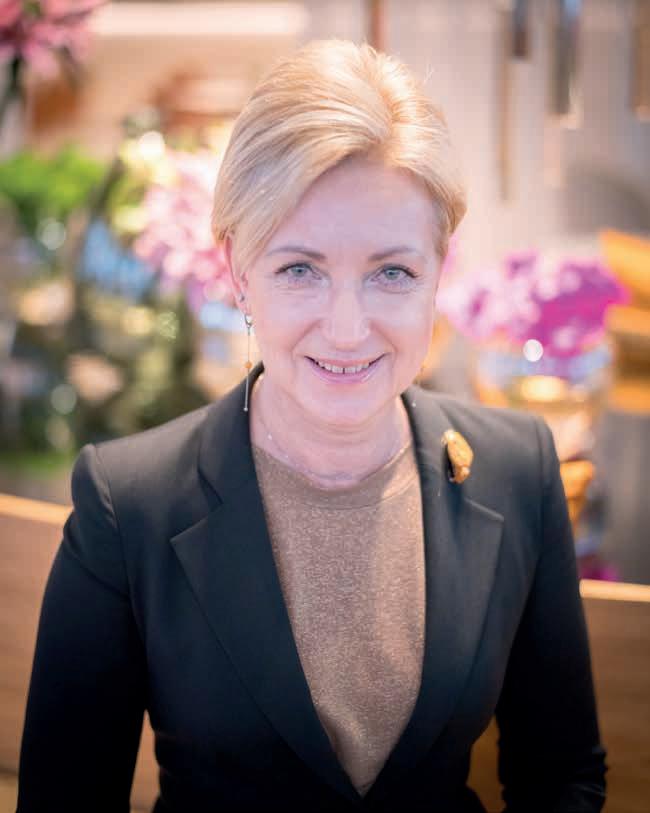
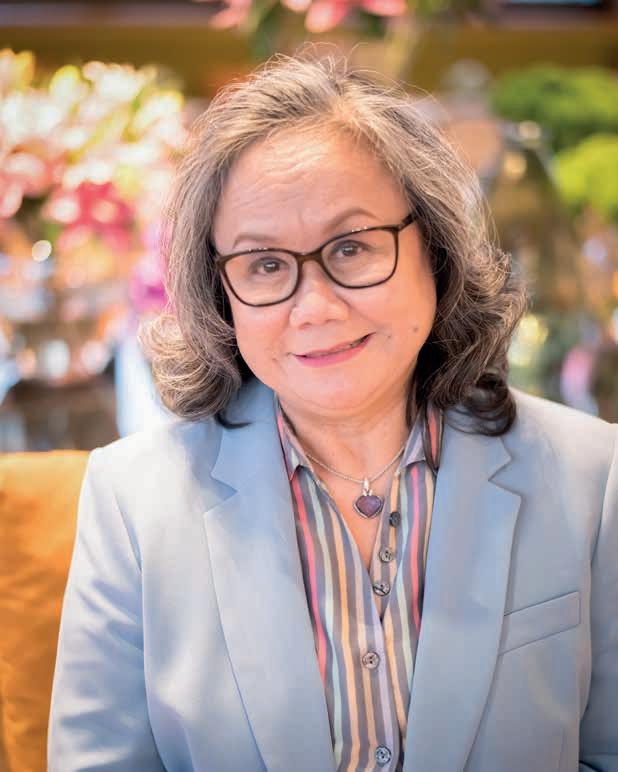
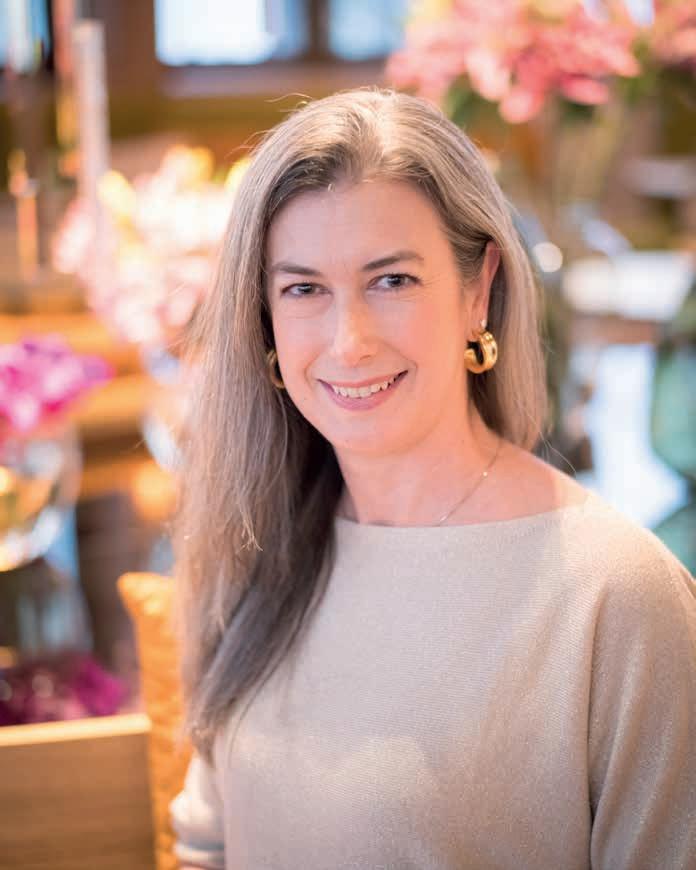
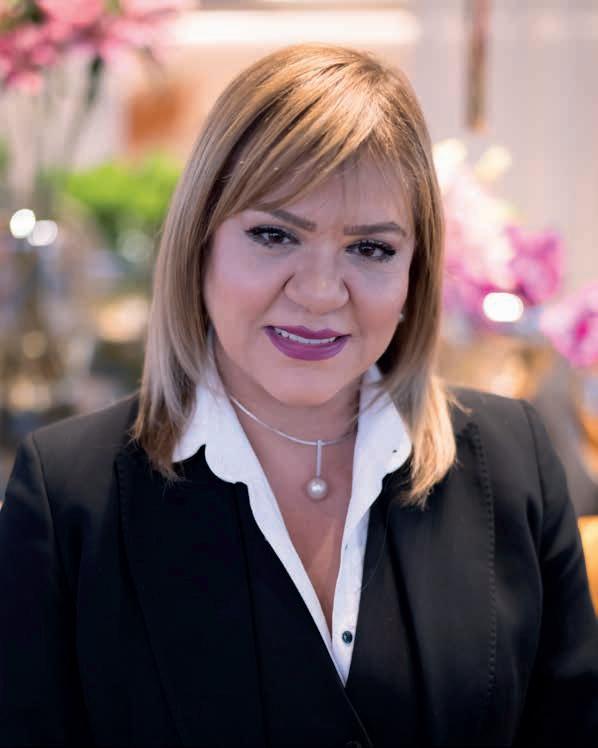
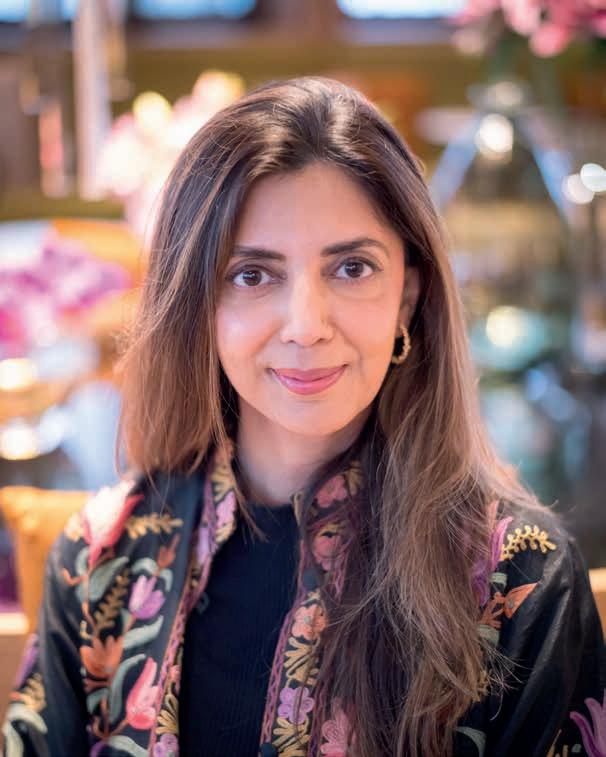
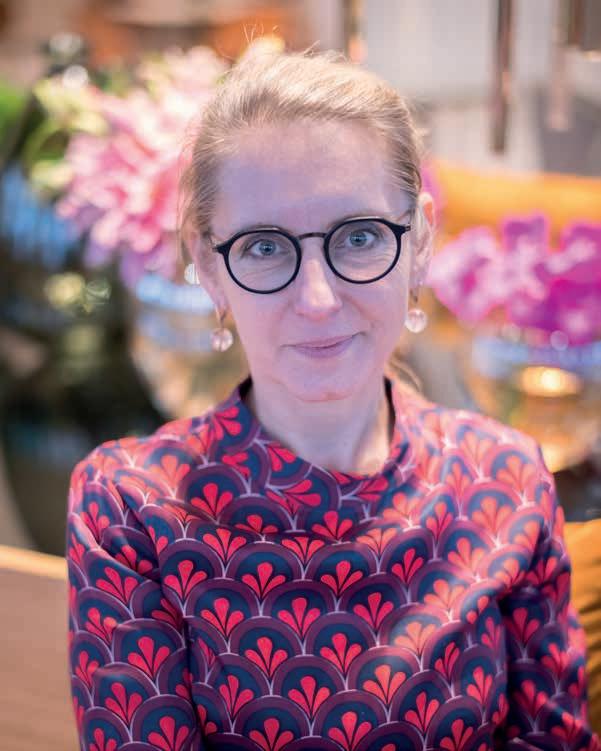
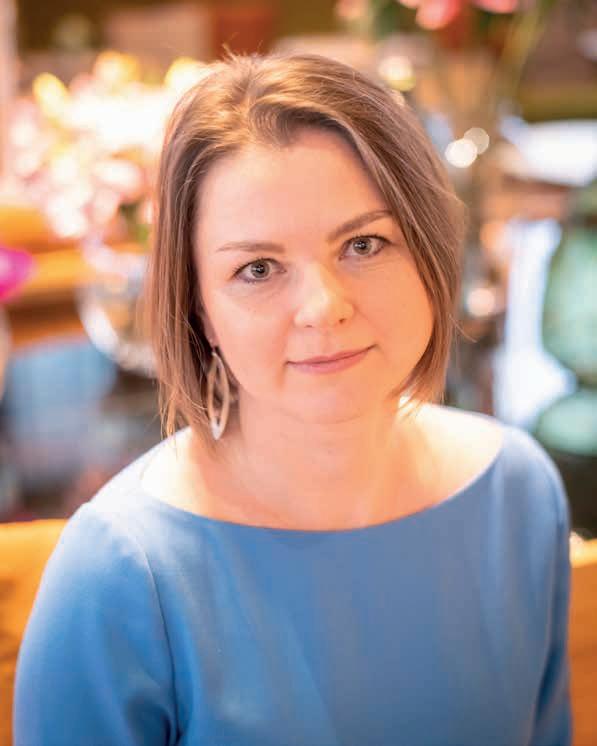
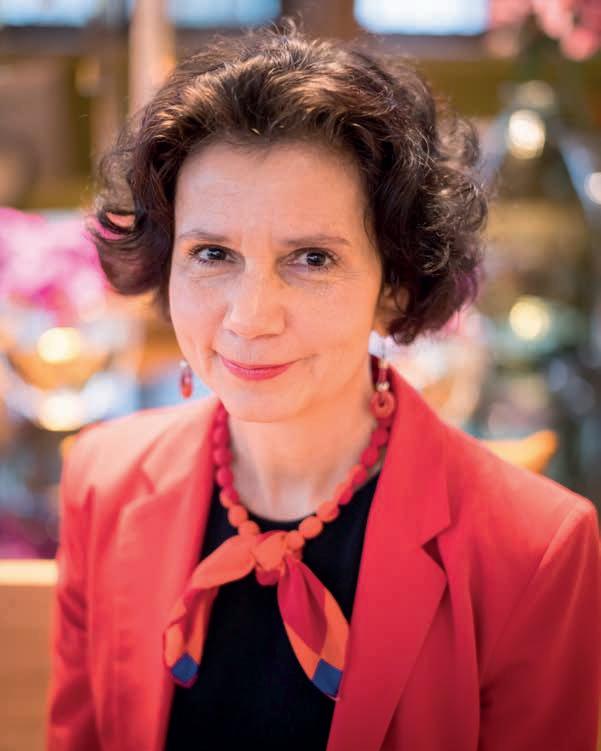

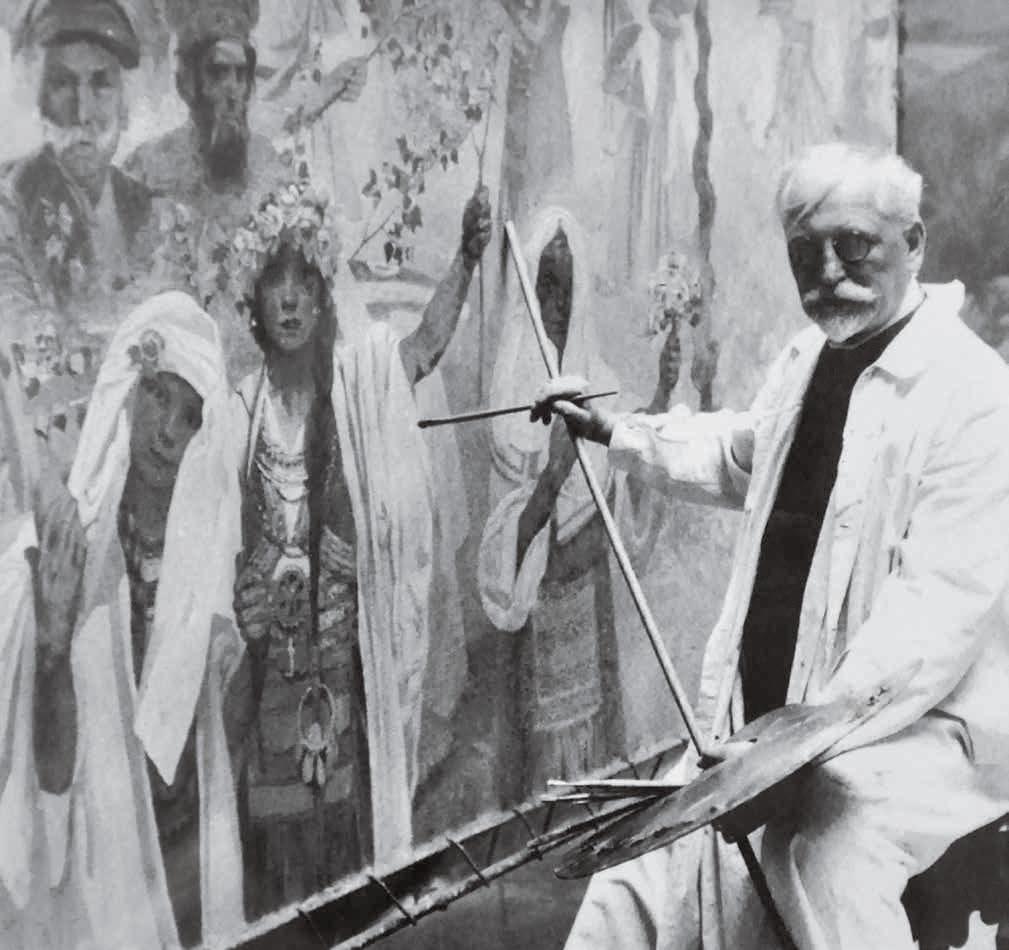
Alphonse Mucha (1860-1939), a South Moravian native, is renowned as a famous painter, and an icon who has inspired generations of artists worldwide. While in Prague in 1929, he wrote the following words about his work, the Slav Epic.
“It was as early as 1900, that I decided to devote the second half of my life to work that would help to build up and strengthen the sense of national identity in our country.
I am convinced that every nation can only continue to develop successfully if its growth is incessantly and organically connected to its roots and that the knowledge of one’s history is essential for maintaining this connection.
Our literature offers us beautiful works that present the course of
our history – sometimes glorious, sometimes sad – to the inner sight of our people.
Even music, symphonies and cycles connected to our history awaken the love for our homeland through art. I wanted to speak to the nation’s soul in my own manner, through the bodily miracle that carries the impressions to consciousness the fastest.
I would say that the image works forcefully: it can penetrate the soul through the window of an open eye.
It is up to the observer to deal with the perception as they wish. They can dismiss it, not fully acknowledging its existence, or they can get seduced by its alluring exterior, stop in front of the sight and perhaps even search for its meaning and significance, eventually finding the core from which it arose, be it beauty or truth.
I considered this, now completed, work to be my duty. However, it would be impossible to carry out such an enormous endeavour without material support.
My friend, Mr Charles R. Crane, who, although American, harbours a great love for Pan-Slavism, understood my efforts and helped me realise my dream. In 1910 in Chicago, we agreed that he would help carry the costs associated with my work, which would then be given as a gift to the city of Prague.
In all the paintings, I steered clear of everything that could resemble harsh quarrels and the blood spilt during such altercations.
The purpose of my work has never been to destroy but to create constantly, to build bridges because we must all seek solace in the hope
that all of humanity will become closer, all the easier, if they know each other well.
I will be happy if I am allowed to contribute to spreading this knowledge with my modest share –at least for now among us, in our Slavic family.”

On 10th May 2024, a memorandum regarding the joined cooperation between the city of Brno and the Mucha Foundation was signed, relating to the presentation of the artistic estate of Alphonse Mucha, as well as all the places connected with him. This was signed by his
grandson, John Mucha, and the Mayor of Brno, Mrs. JUDr. Markéta Vaňková, at Moravský Krumlov Castle.
This ceremony was also attended by the Governor of South Moravia, Mgr. Jan Grolich, Senator and Mayor of Moravský Krumlov,
M.Sc. Tomáš Třetina, Alphonse Mucha’s great grandson, Marcus Mucha, and many ambassadors and members of the Diplomatic Corps. The ceremony was followed by a remarkable tour of the Slav Epic led by John Mucha, Alphonse Mucha’s grandson.
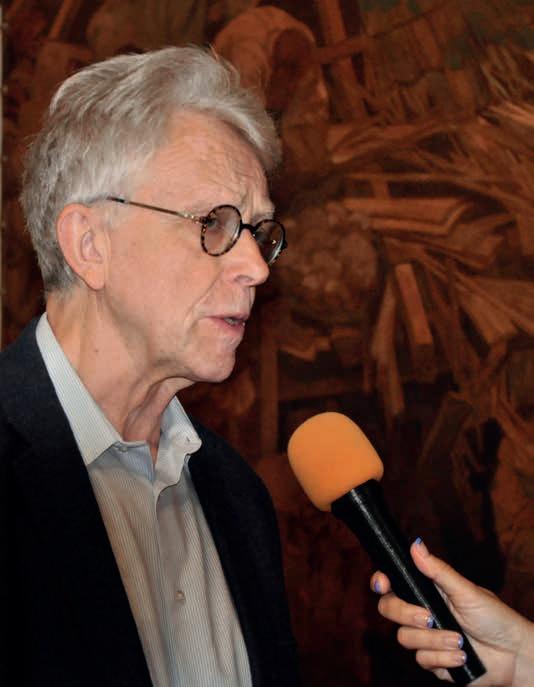
In 2024, the Mucha Foundation will present the five-part exhibition “Mucha and Photography: Personal Vision”, the third part of the Mucha Trail series.
The Mucha Trail 2024 exhibition will showcase Alphonse Mucha as a brilliant photographer, and will be a compelling record of the personal life visions of the artist, a true and genuine master of the camera.
In the 1880s, the introduction of technological advances such as lightweight hand-held cameras and gelatine silver made photography a much more accessible medium for amateur photographers. Among the first generation to be inspired by this development was the young Alphonse Mucha. At the time, Mucha was a student at the Munich Academy of Fine Arts and used a borrowed camera to take his first photographs. These include landscapes, street scenes from his apartment window, and portraits of friends.
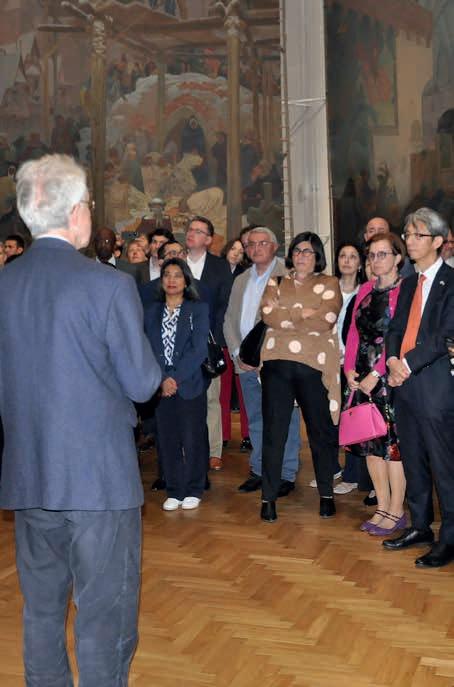
These photographs demonstrate Mucha’s interest in capturing the busy life that surrounded him. Mucha’s photographic output grew dramatically in Paris, especially in the period after he purchased his first camera in the early 1890s. Photography became an everyday affair for him, not only to document his studio models and to supplement his preliminary sketches, but also to experiment with light and shadow and to explore new ways of looking at the world. During this period, Mucha also began to create staged photographs for his book illustrations, with his friends and models posing as characters in stories. This section of his photographs forms an important part of his artistic legacy and demonstrates his theatrical approach to his work, which culminated in his late masterpiece, The Slav Epic.
Today, the Mucha Foundation holds approximately 2,500 of his photographs. They have survived as period prints or as negatives
on glass plates/celluloid, and cover an extremely wide range of subjects: not only studio models, images of his family and friends, portraits, landscapes, and nature and architectural studies, but also documentary and staged photographs (mise-en-scène).
The curator of the five-part exhibition is Tomoko Sato, who is responsible for all of the Mucha Foundation’s major exhibitions and projects over the past 30 years – not only in the Czech Republic but also worldwide. In the opinion of John Mucha’s family, she is the most important expert on the life and work of Alphonse Mucha in the world. Tomoko Sato graduated from the University of Manchester, and is based in Cambridge, United Kingdom.
It was an unforgettable event.
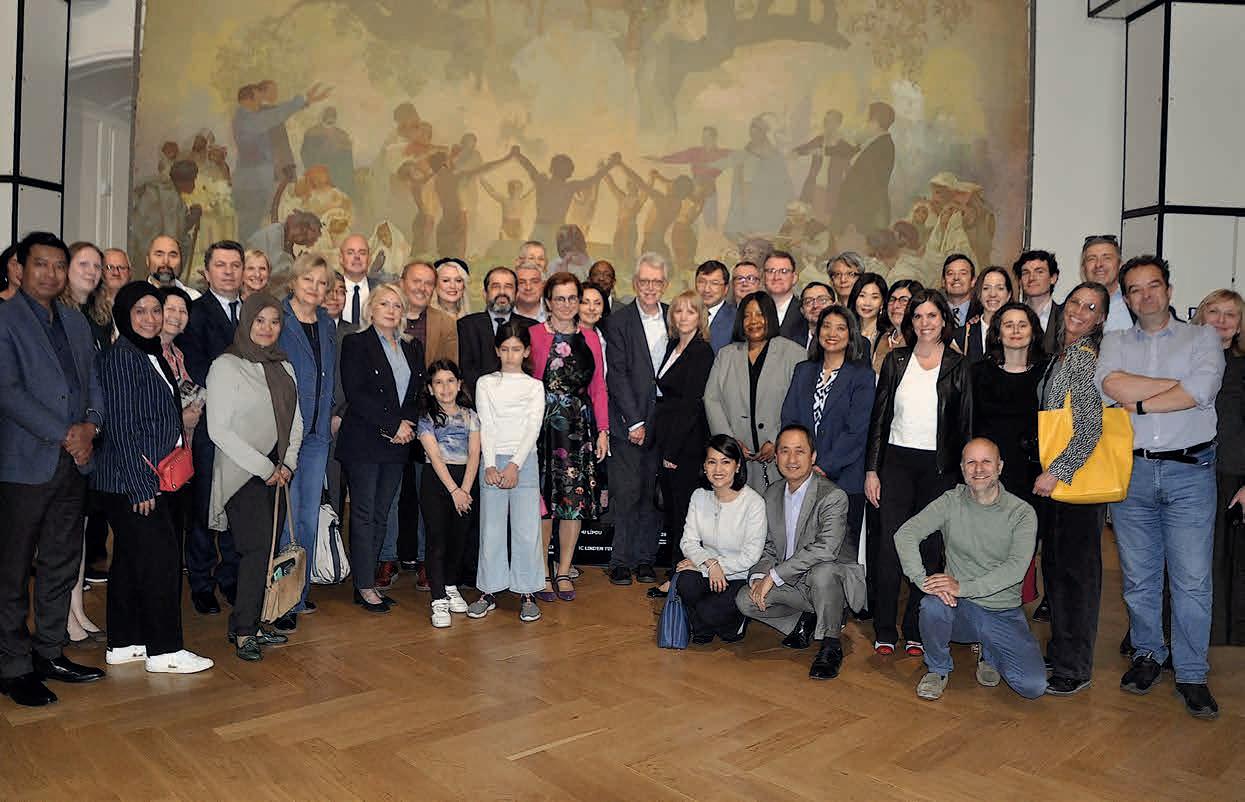

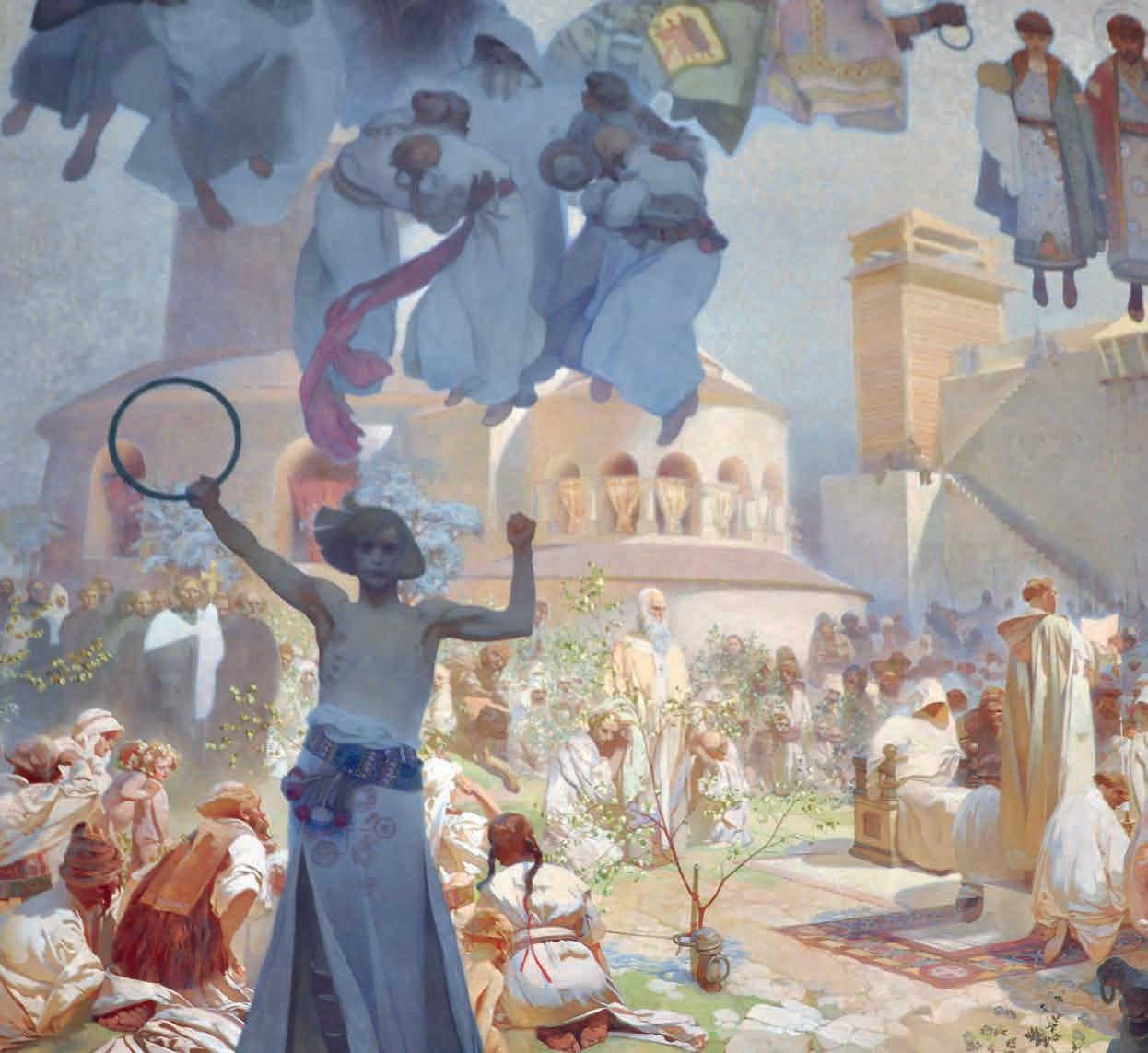
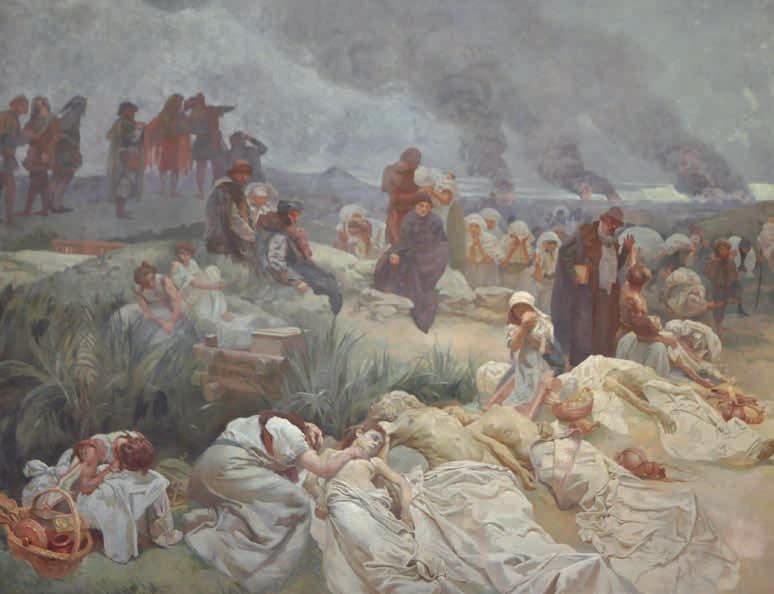
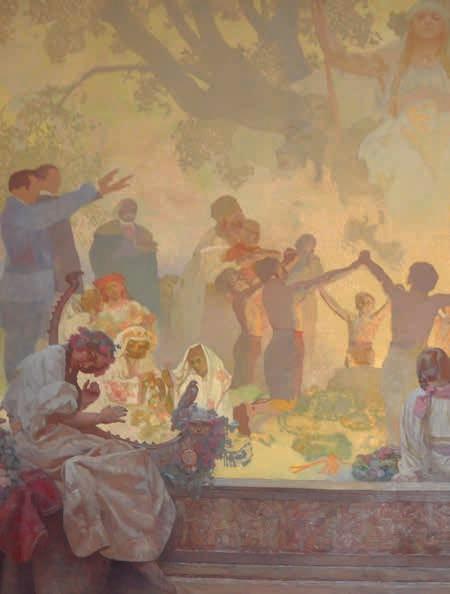

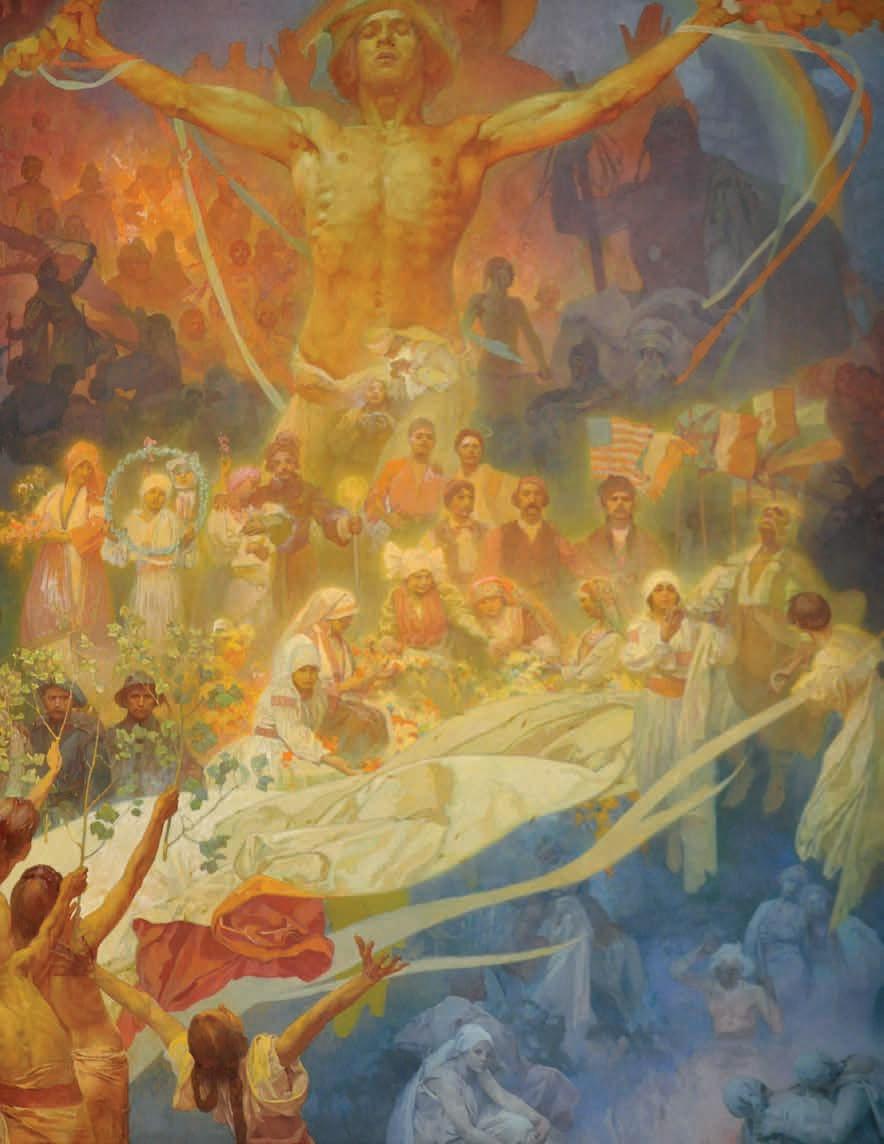
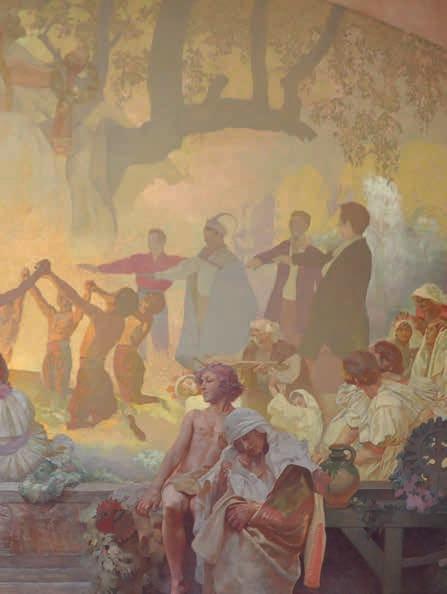

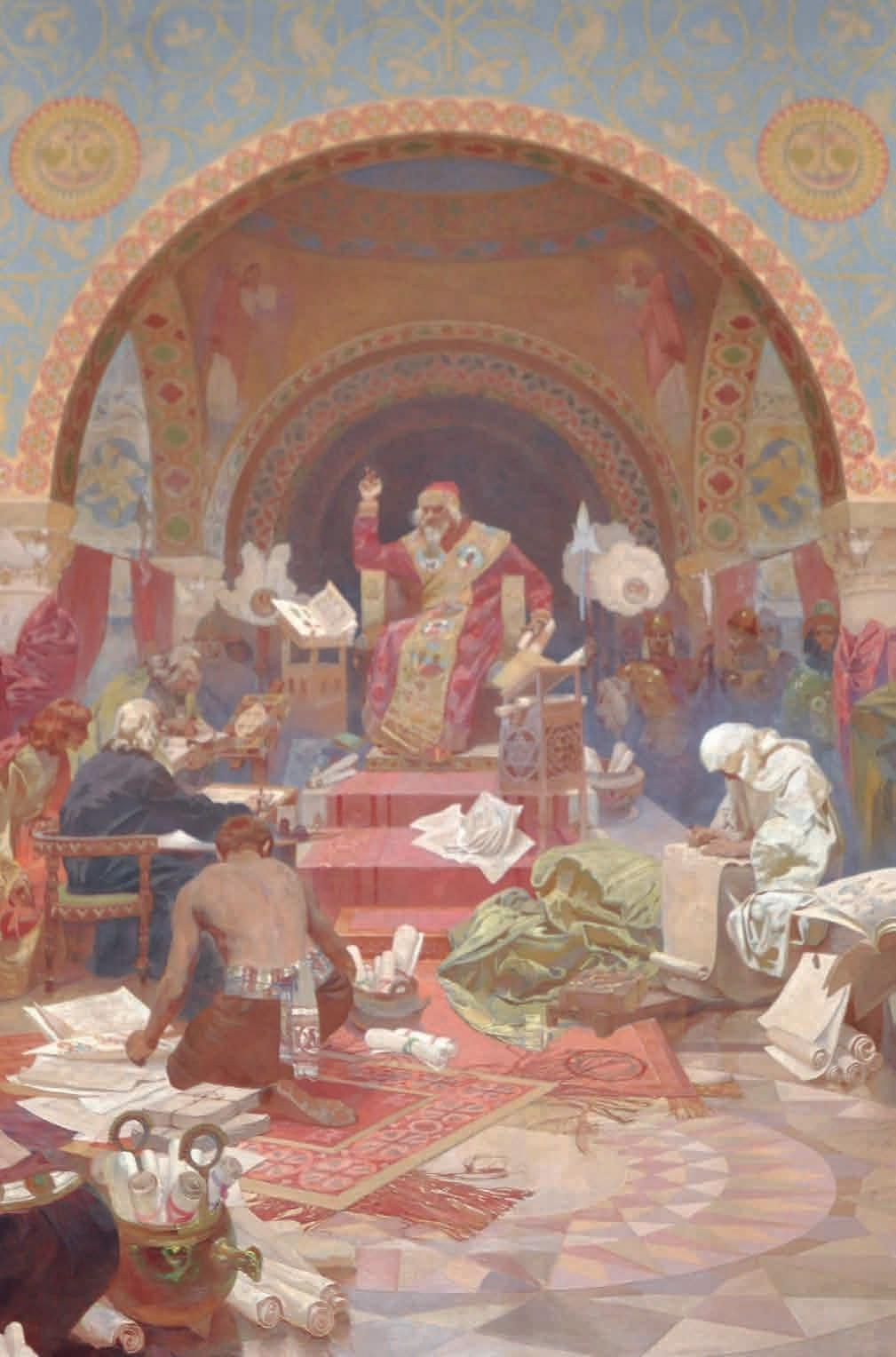
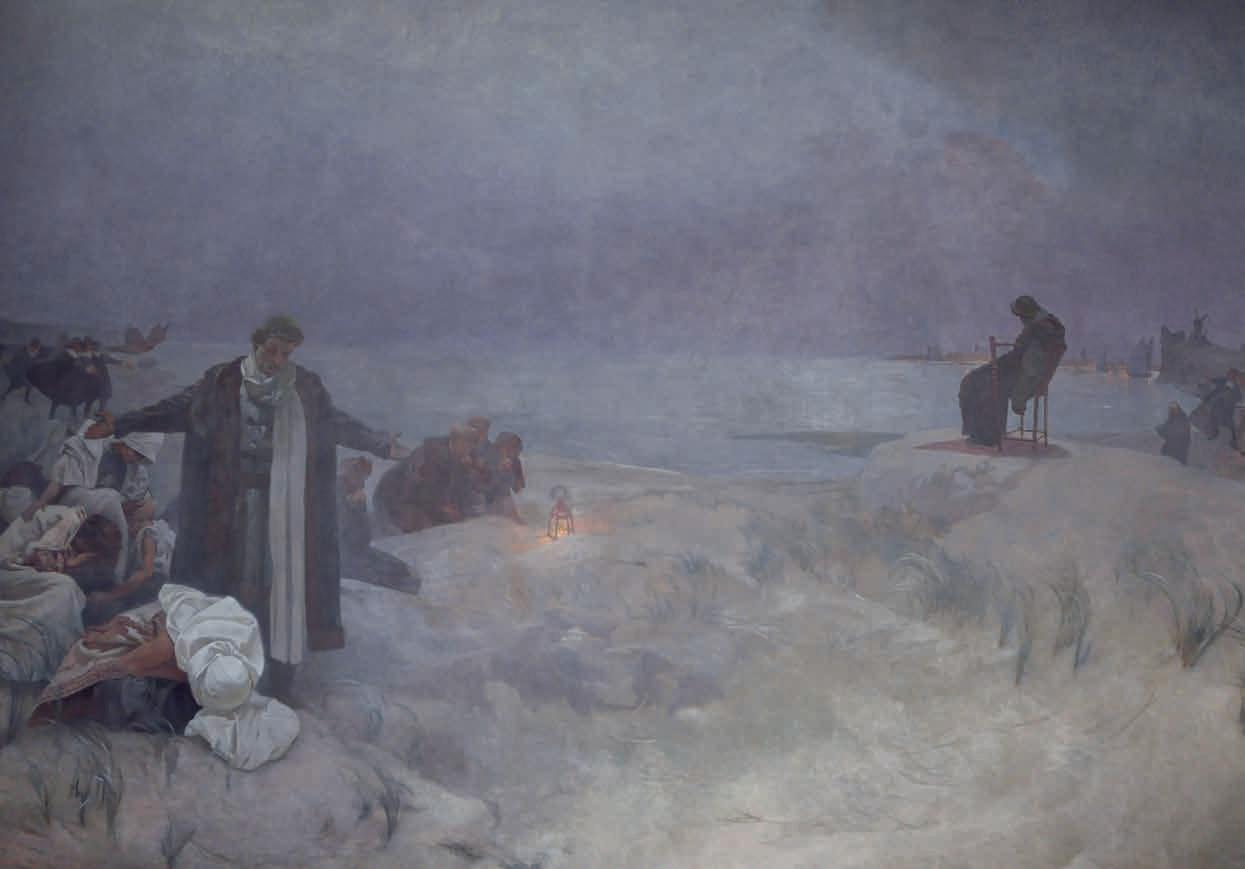
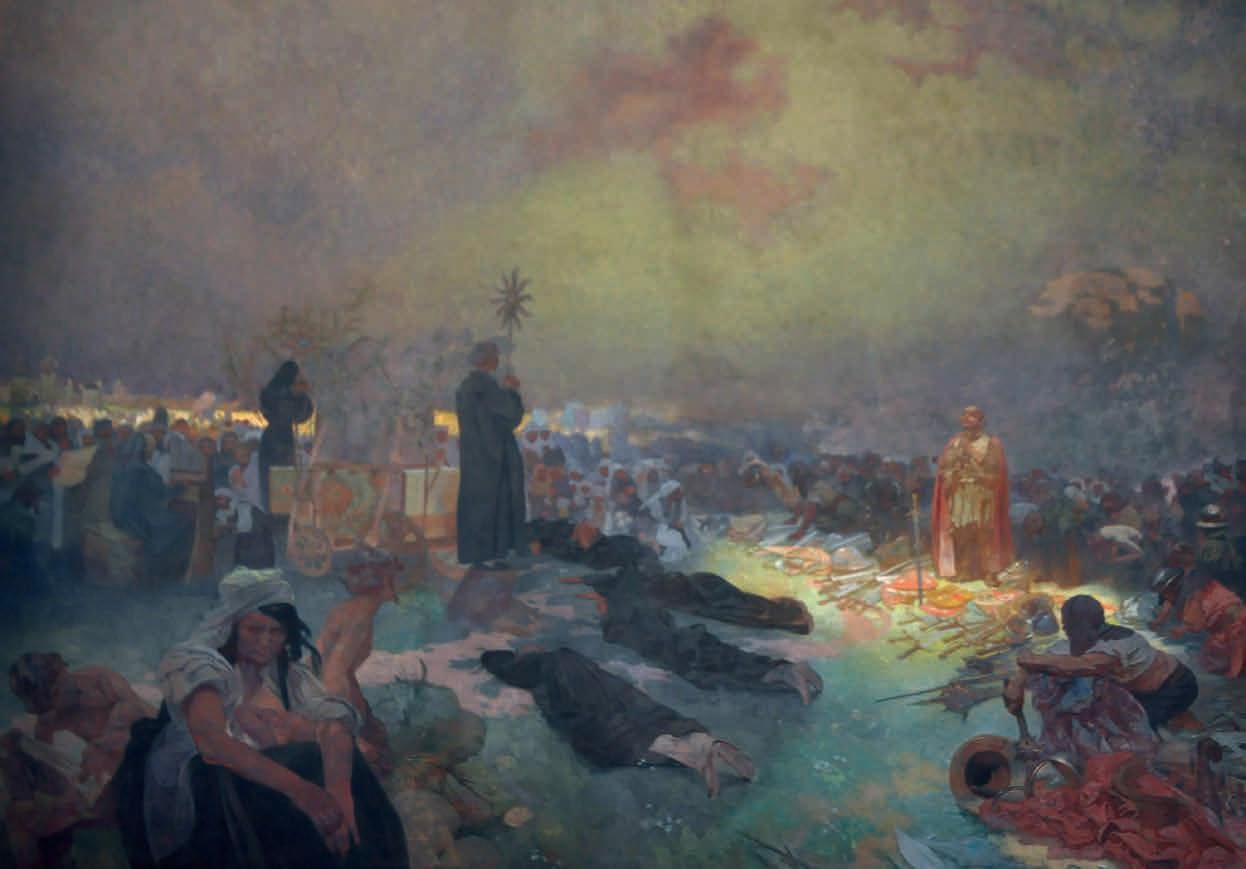
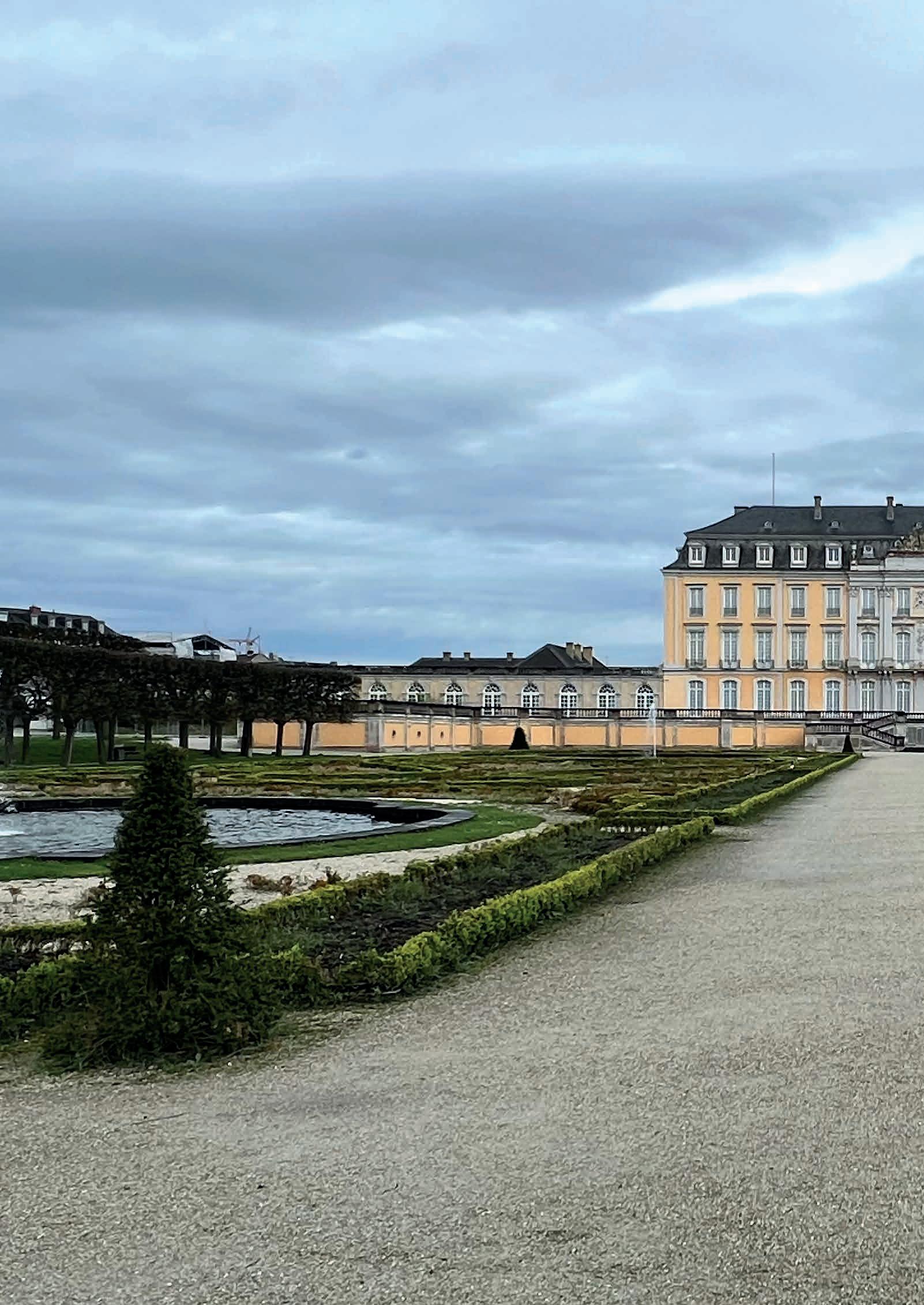
In 2023, the Czech-German cross-border campaign Ahoj Nachbarn! – Hallo sousede! was created thanks to the cooperation of the CzechTourism office in Berlin and the German Tourist Board office in Prague. Residents of both cities also joined in, often posting on social networks and giving their neighbours tips on what to visit in their home countries. In order to be excellent neighbours, we decided to repeat last year’s successful trip and travel to Germany once again – since we believe that it is necessary to keep up our good habits.
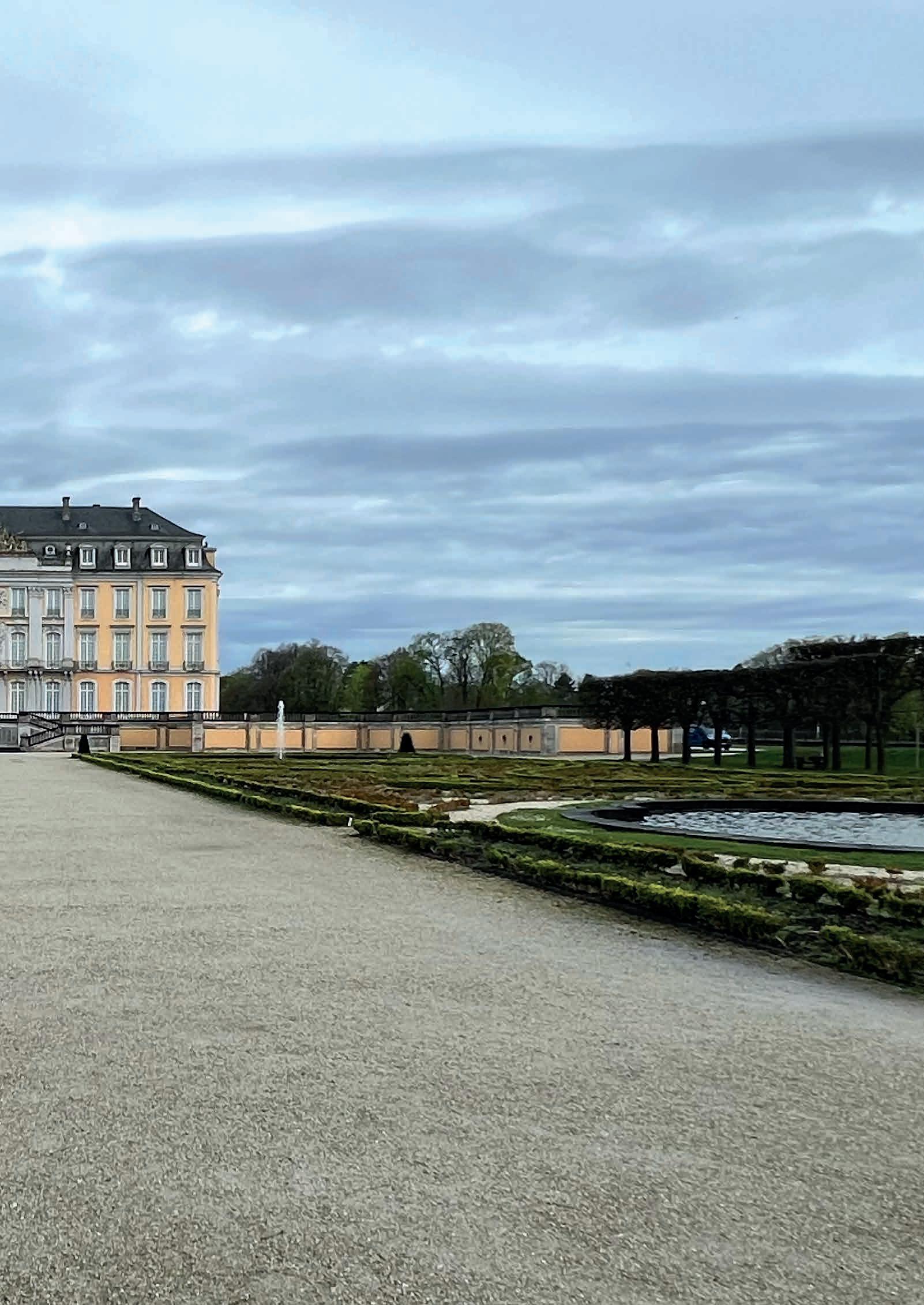
Germany has long held the first place for the number of foreign tourists visiting the Czech Republic.
“A total of 178,891 Germans arrived at domestic hotels in August 2023, which was 9% more than the year before, and even 13% more than in August 2019, before the Coronavirus pandemic. Among the foreigners who visited the Czech Republic, guests from Germany won an imaginary gold
medal, they were the most,“ says František Reismüller, director of the Czech Tourism Center –CzechTourism.
“We focused primarily on sustainable tourism. Cross-border travel concerns not only attractive border areas, but also other regions of both countries,“ described Jan Pohaněl, head of the German Tourist Office for the Czech Republic, speaking about last year’s Czech-German cross-border
campaign Ahoj Nachbarn! – Hallo sousede!.
To be not only good but excellent neighbours, we decided to keep up with our good habits and take yet another trip to Germany this year. This time to the north part, to the Bonn area. We loaded the car for a weekend trip with our two lovely dogs, who are happy to travel around, and set off.

This time, it was a long drive –over 700km. With a few stops, it took us about eight hours. The first stop was at Burg Heimerzheim, a historical landmark in
Swisttal. This lovely historical castle offers nice hotel rooms, as well as facilities for major events. We appreciated the large parking lot, and noticed a few places for recharging electric cars. www.wasserburg-heimerzheim.de
Swisttal is a small, beautiful city with some good dog-friendly restaurants. In this part of Germany, asparagus season has just started, so we could enjoy a wonderful dinner made from local ingredients.
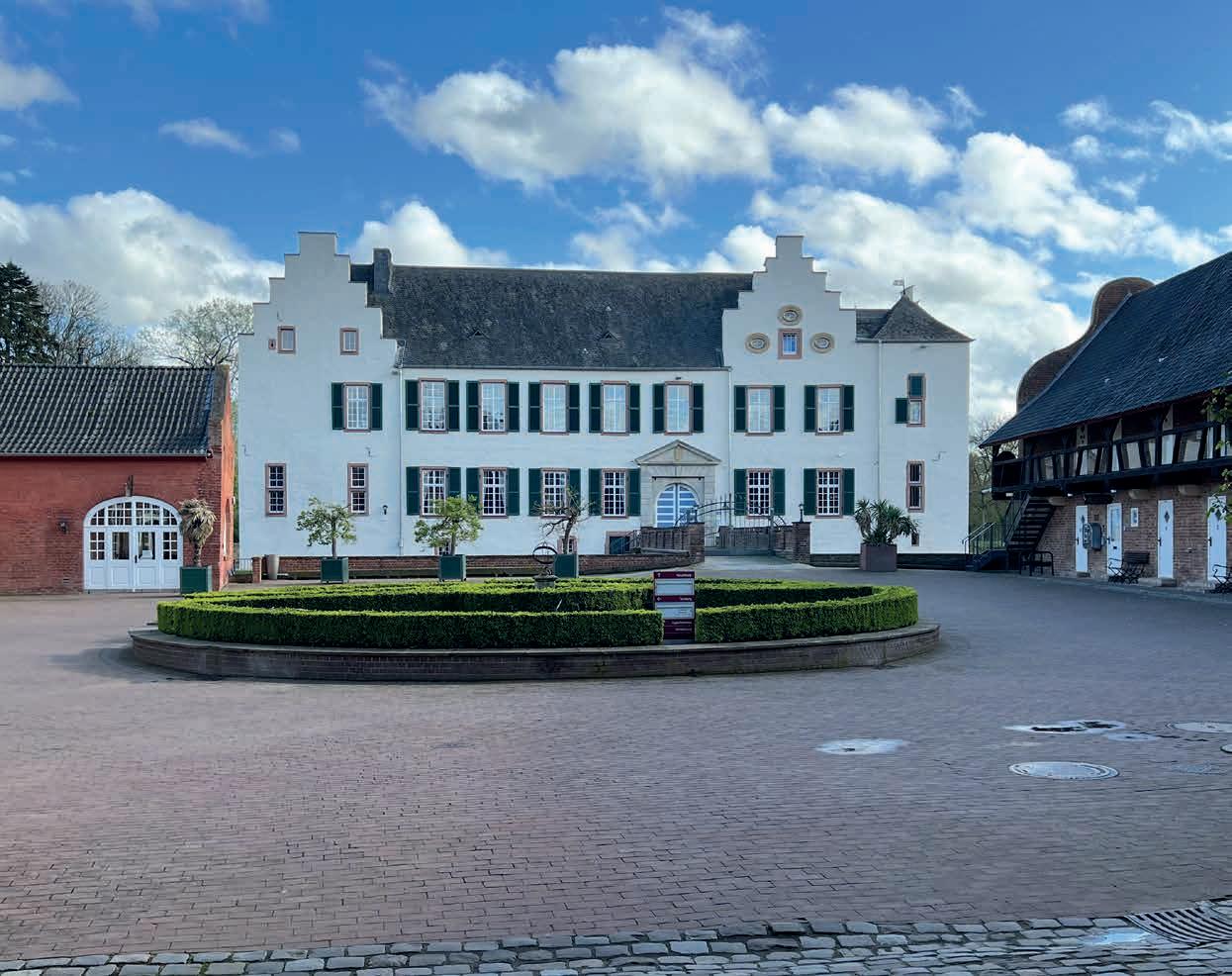
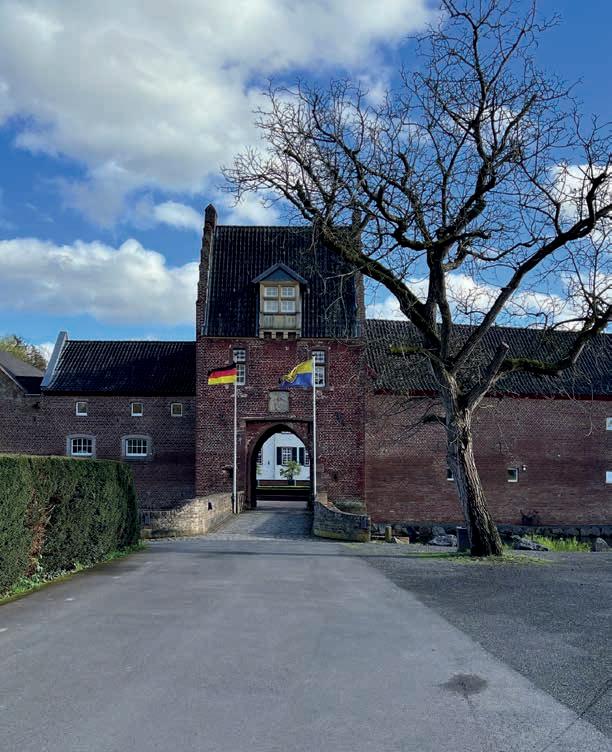
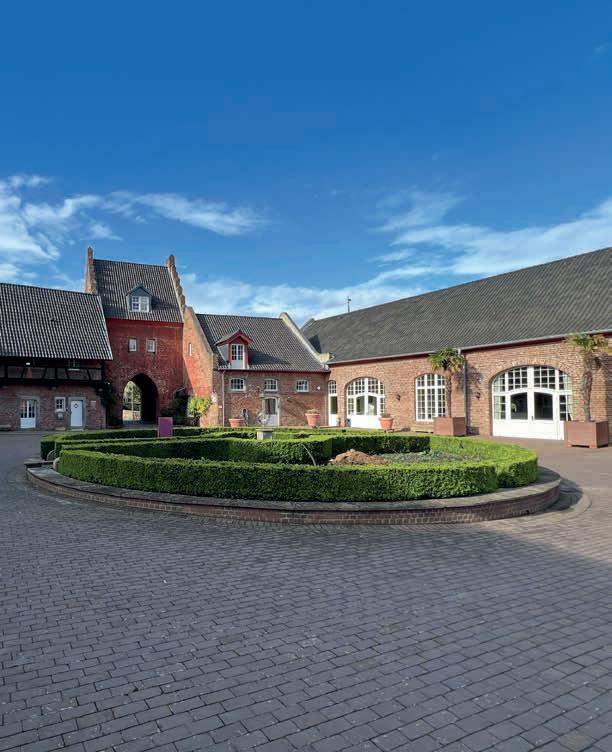
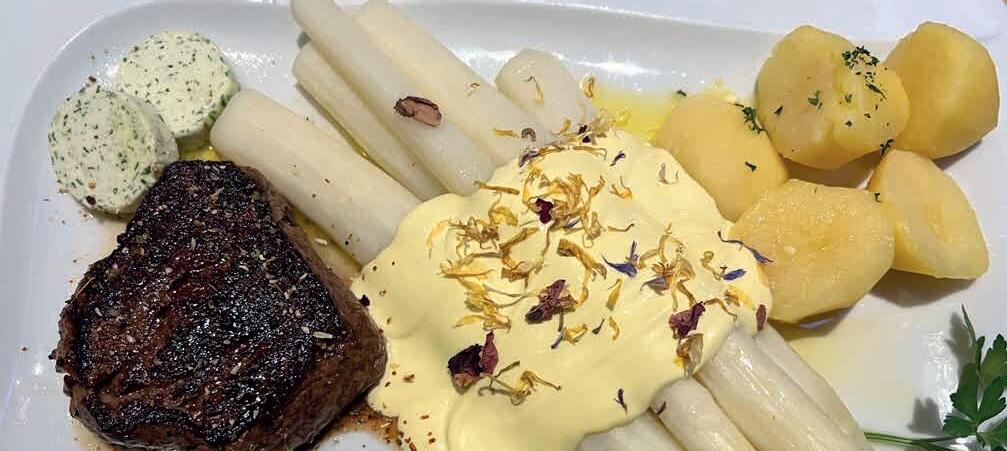
The next morning, after a delicious breakfast, we left for Brühl, North Rhine-Westphalia (about 25 km away), with our first destination for the day being Schlosskirche Sankt Maria von den Engeln. Built in 1491 and remodelled in the Baroque style in 1735, this church was almost destroyed during World War II. Luckily, they managed to reconstruct it in 1945, and re-open in 1953.
Our next stop was the UNESCO heritage complex of Augustusburg and Falkenlust Castles, the former residence of the prince bishop of Cologne. Built between 1729 and 1737, they represent the first Rococo style in Germany. Again, during World War II, this historical site was badly damaged, followed by a massive and lengthy restoration taking place from 1946 until 1996.
A large, beautiful Baroque Park surrounds the castles.
After finishing our guided tour, we drove to Hünzingen (365 km away, which took about 4 hours) to our next destination, the Ringhotel Forellenhof, which also offered a nice dog-friendly restaurant.
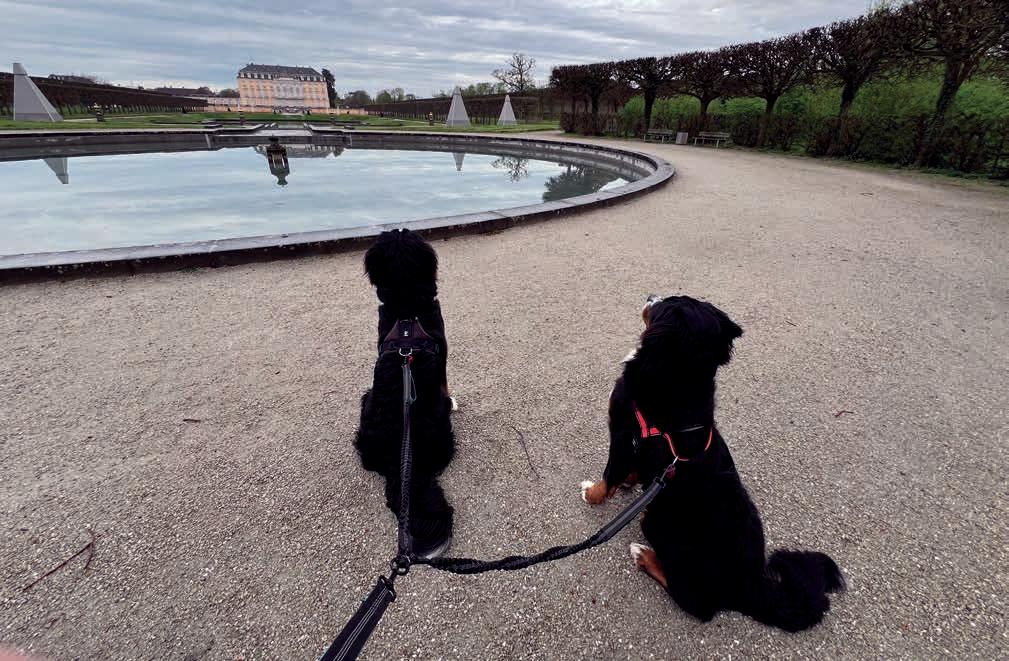
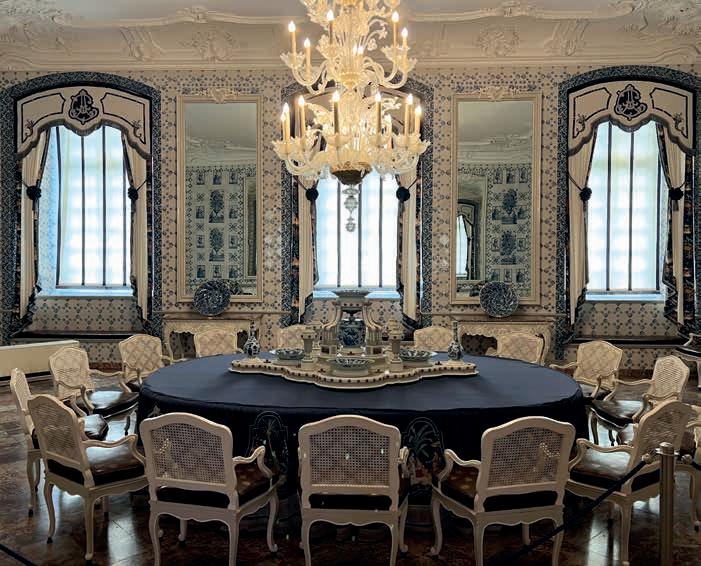
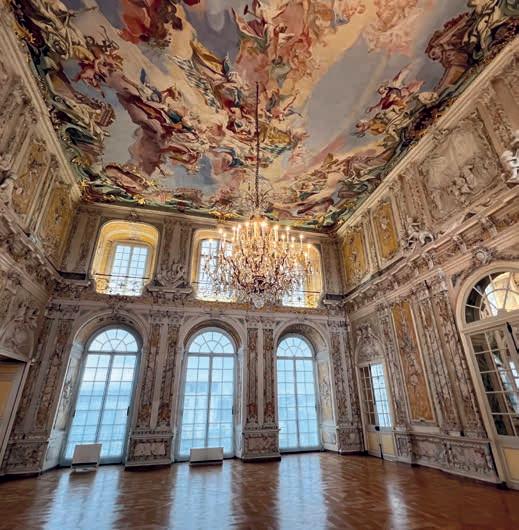
The next morning was the last of this German adventure. We decided to visit the Walsrode World Bird Park, or, as the Germans themselves call it, Weltvogelpark Walsrode. This time, our dogs were not allowed in, but were offered a nice safe place where we could leave them for a while.
Established over 25 years ago, this park is really unique – it is the largest bird park in the world in terms of species and land area. It covers 24 hectares, and houses about 4,000 birds of 600 species from every continent and climate zone in the world.

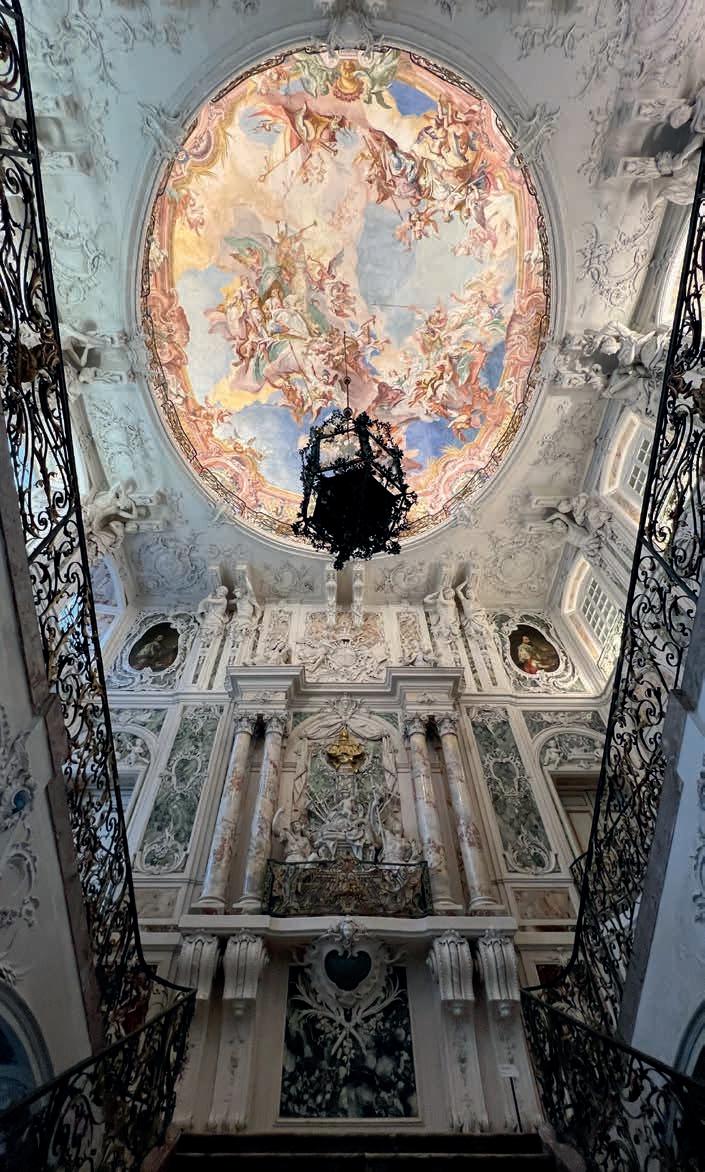


We can confirm that the way home is always shorter, so after 550 km (and about 6 hours of driving) we were happily back home in Prague.

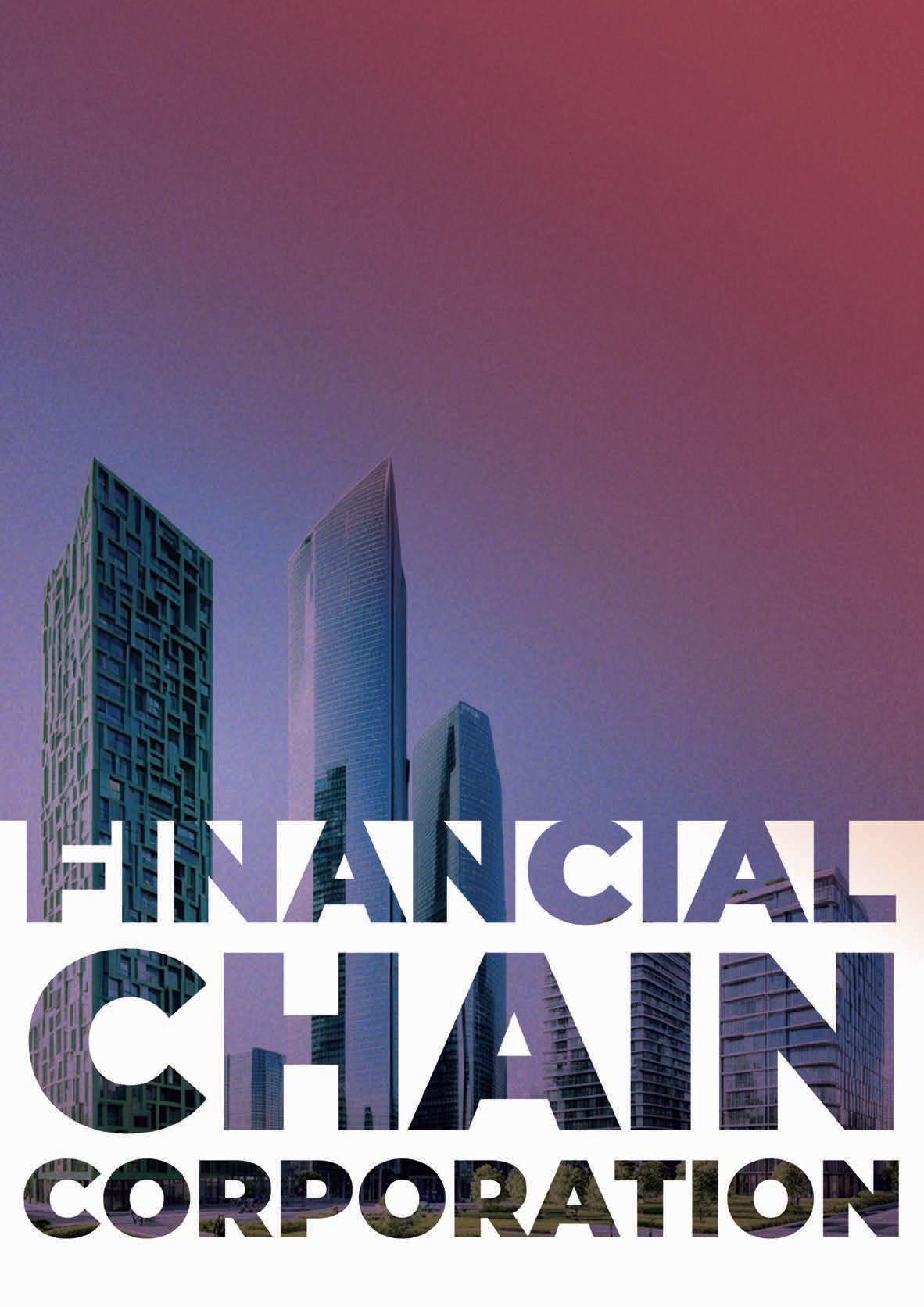

DIRECT FLIGHTS TWICE A WEEK MEAL ONBOARD INCLUDED COMFORTABLE SEATING





